
Through Scandinavia to Moscow
William Seymour Edwards
| Note: | Images of the original pages are available through Internet Archive. See http://archive.org/details/throughscandinav00edwa |

Through Scandinavia to Moscow
William Seymour Edwards

THE AUTHOR

WITH
MANY ILLUSTRATIONS
AND MAPS
CINCINNATI
The Robert Clarke Co.
1906
COPYRIGHT 1906, By
WILLIAM SEYMOUR EDWARDS
DEDICATION
To my life-long chum,
my father,
these pages are affectionately dedicated.
These pages are made up of letters written during a little journey through Scandinavia and into Russia as far as Moscow, some four years ago, before the smashing of the Russians by the Japanese. They were written to my father, and are necessarily intimate letters, in which I have jotted down what I saw and felt as the moment moved me. The truth is, I was on my honey-moon trip, and the world sang merrily to me—even in sombre Russia.
Afterward, some of these letters were published here and there; now they are put together into this little book. I had my kodak with me and have thus been able to add to the text some of the scenes my lens made note of.
It was my endeavor at the time, that the kindly circle who read the letters should see as I saw, feel as I felt, and apprehend as I apprehended; that they should share with me the delight of travel through serene and industrious Denmark, among the grand and stupendous fjelds and fjords of romantic Norway; should visit with me a moment the Capital of once militant Sweden, and join me in the excitement of a plunge into semi-barbarous Russia. The transition from Scandinavia to Russia was sharp. I went from lands where the modern spirit finds full expression, as seen in the splendid schools and libraries of Denmark, in the democratic and Americanized atmosphere of Norway, in the scientific and mechanical progressiveness of Sweden. Entering Russia, I found myself amidst social and political conditions, mediaeval and malevolent. The wanton luxury of the enormously rich, the pinching poverty of the very poor, the political and social exaltation of the very few, the ruthless suppression of the many, here stared me in the face on every hand. The smoldering embers of discontent, profound discontent, were even then apparent. In the brief interval which has since elapsed, this smoldering discontent has become the blazing conflagration of Revolution. Driven against his will by inexorable fate, the Czar has at first convoked the Imperial Douma and then, terrified by its growing aggressiveness, has summarily decreed its death. Panic-struck by the apparition of popular liberty, which his own act has called forth, he is now in sinister retreat toward despotic reaction; the consternation of the unwilling Bureaucracy, day by day increases; terror, abject terror, increasingly haunts the splendid palaces of the Autocracy; and the inevitable and irrepressible movement of the Russian people toward liberty and modern order is begun.
The symptoms of social and political ailment which then discovered themselves to me are now apparent to all the world. And it is this verification of the suggestions of these letters which may now, perhaps, justify their publication.
Charleston-Kanawha, West Virginia,
September 1, 1906.
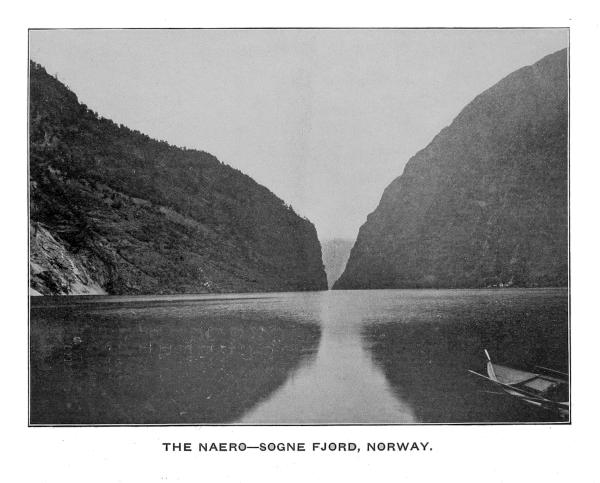
THE NAERO—SOGNE FJORD, NORWAY.
Through Scandinavia to Moscow.
Esbjerg, Denmark, August 25, 1902.
We came down from London to Harwich toward the end of the day. Our train was a “Special” running to catch the steamer for Denmark. We were delayed a couple of hours in the dingy, dirty London station by reason of a great fog which had crept in over Harwich from the North Sea, and then, the boat had to wait upon the tide.
The instant the train backed in alongside the station platform—only ten minutes before it would pull out—there was the usual scramble and grab to seize a seat in the first-carriage-you-can and pandemonium reigned. H is well trained by this time, however, and I quickly had her comfortably ensconced in a seat by a window with bags and shawls pyramided by her side the better to hold a place for me. Meantime, I hurried to a truck where stood awaiting me a well-tipped porter and together we safely stowed two “boxes” into a certain particular “luggage van,” the number of which I was careful to note so that I might be sure quickly to find the “luggage” again,[Pg 2] when we should arrive at Harwich, else a stranger might walk off with it as aptly as with his own.
Our “carriage” was packed “full-up” with several men and women, who looked dourly at us and at each other as they sat glumly squeezed together, elbows in each other’s ribs. So forbidding was the prospect confronting me that I did not presume to attempt a conversation. These comrades, however, soon dropped out at the way-stations, until only one lone man was left, when I took heart and made bold to accost him. I found him very civil and, recognizing me to be a foreign visitor, he spoke with freedom. One Englishman never forgives another for sitting beside him, unintroduced, and squeezing him up in a railway carriage; but he harbors no such grudge against his American cousin, equally the victim of British methods.
Our vis-à-vis had been a volunteer-trooper in South Africa, and had just come back to England, after two years’ hardship and exposure. He had given up a good position in order to serve his country, and had been promised that the place would be kept open for him against his return. He tells me he now finds a stay-at-home holds his job. He has “a wife and two little lads to keep,” and so far he has had “no luck in finding work.” There are thousands of others in as bad a fix as he, he says, returned patriots who are starving for lack of work. He denounced the entire Boer-smashing business most savagely and declared that as for South Africa, he “would not take the whole [Pg 3]of it for a gift.” We hear this sort of talk everywhere among the people we casually meet. The average Englishman takes small pride in his Army. “It gives fat jobs to the aristocracy, it is death to us,” is what I have heard a dozen times remarked. Our new acquaintance seemed to feel the better for having thus spoken out his mind, and when we parted, wished us a “prosperous voyage.”
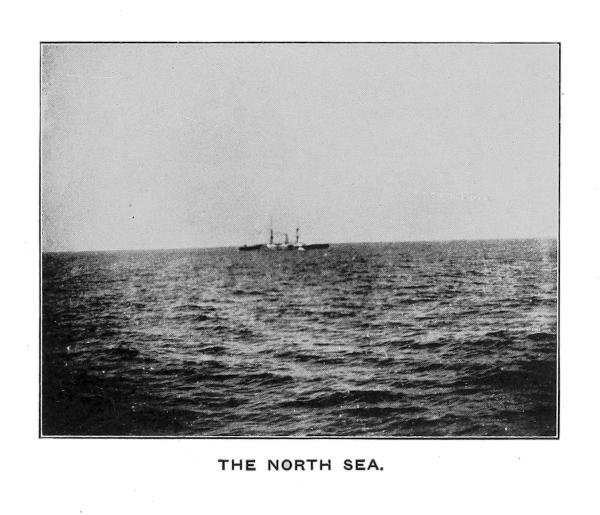
THE NORTH SEA.
The ship was in motion within twenty minutes after our train reached the Harwich pier. To my landsman’s thinking the air was yet murky with the fog. Big sirens were booming all about us. The melancholy clang of tidal bells sounded in sombre muffled tones from many anchored buoys. It was a drear, dank night to leave the land. We moved slowly, sounding our own hoarse whistle all the while. I stood upon the upper deck peering into the mists till we had come well out to sea. There were few boats moving, no big ones. Multitudes of small schooners and sloops rode at anchor, their danger lights faintly gleaming. I wondered we did not run down and crush them, but the pilot seemed to apprehend the presence of another boat even before the smallest ray of light shone through the fog. One or two great ships we came shockingly close upon. At least, I was jarred more than once when their huge black hulks and reaching masts suddenly grew up before me out of the dead white curtain of the mists. The estuary which leads from Harwich to the sea is long and tortuous. Only a pilot who has been born upon it, and from boyhood[Pg 4] learned its currents and its tides, its shallows and its shoals, may dare to guide a boat along it, even in broad day. How much greater the skill and knowledge required thus to steer a ship through these labyrinthine channels amidst the fogs and blackness of such a night! The Captain told me he was always uneasy when coming out, no matter when, and never felt safe until far out upon the sea. Even in open water he must keep the sharpest kind of a watch lest some one of the myriad fishing craft which haunt these waters, should lie athwart the way.
The sea was quiet, rolling with a long slow swell. The rising wind soughed softly through the rigging when, toward midnight, I at last turned in.
All day Sunday the North Sea lay smooth and glassy as a pond; no hint of the turmoil and tempest which so often rage upon its shallow depths. We did not see many vessels; far to the north I made out the smoke of a steamer which the captain said was bound for Kristiansand, in Norway; and south of us were a few sail, which I took to be fishing luggers from Holland. Nor were there many seabirds flying. The sky hung low and in the gray air was the feel of a storm in the offing. Toward dark, about eight o’clock, a misty rain settled down upon us, and the rising wind began swashing the dripping waters along the decks. Toward half past nine we descried a dim glimmer in the east,—a beacon light flickering through the night,—and then another with different intervals of flash, a mile or two out upon the left, and then our ears [Pg 5]caught the deep bellow of a fog horn across the sea. We were nearing the west coast of the Province of Jutland, in Denmark. Our port lay dead ahead between the lights. Another hour of cautious navigating, for there are many sand bars and shifting shoals along this coast, and we came steaming slowly, very slowly, among trembling lights—fishing smacks at anchor with their night signals burning—and then we crept up to a big black wharf. We were arrived at Esbjerg.
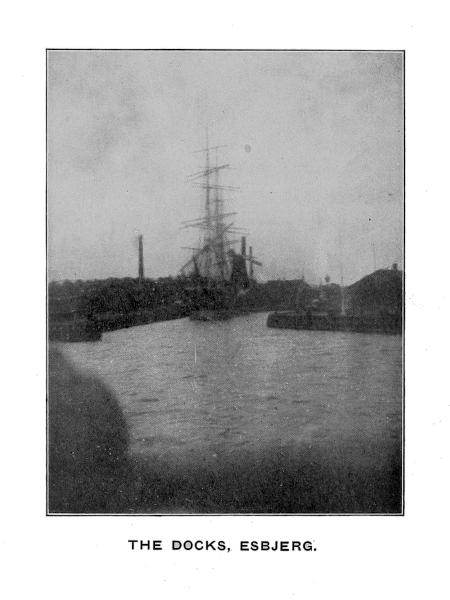
THE DOCKS, ESBJERG.
The train for Copenhagen (Kjoebenhavn) would leave at midnight, an eight-hours’ ride and no sleeping car attached.
We decided to stay aboard the ship, sleep peacefully in our wide-berthed stateroom and take a train at eleven o’clock of the morning, which would give us a daylight ride.
We were entering Denmark by the back door. The sea-loving traveler generally approaches by one of the ocean liners which sail direct from New York to Copenhagen; those who find terror in the sea enter by way of Kiel, and an all-rail ride through Holland and Germany, crossing the channel to Ostend, Dieppe, or the Hook. Only the few voyage across the North Sea with its frequent storms—the few who, like ourselves, are good sailors and do not fear the stress of tide and tempest. We were now at Esbjerg, and must cross the entire peninsula of Denmark, its Little Belt, its Big Belt and the large islands of Funen and Zealand to reach our journey’s end.
I am already beginning to pick up the Danish speech, a mixture of English, German, Dutch and new strange throat gutturals, the latter difficult for an American larynx to make. And yet so similar is this mother tongue of Scandinavia to the modern English, that I can often tell what a Dane is saying by the very similarity of the sounds: “Go Morn”—(good morning), “Farvel”—(farewell).
Our fellow passengers were mostly Danes. This is their favorite route for coming home. They are a quiet, rather pensive people. The men, much of the time, were smoking, and drinking beer and a white brandy. The women were often sitting in the smoking room with them, enjoying, I presume, the perfume of tobacco, as every right-minded woman should, and it may be, also finding solace in the scent of the strong brown beer, which they are not themselves indisposed to quaff.
The cooking on this Danish boat has been good. We have keenly appreciated the improvement upon the diet of roast beef, boiled mutton, boiled ham, boiled potatoes, and boiled peas steeped in mint, which we have been compelled to exist upon during the past few weeks in Britain.
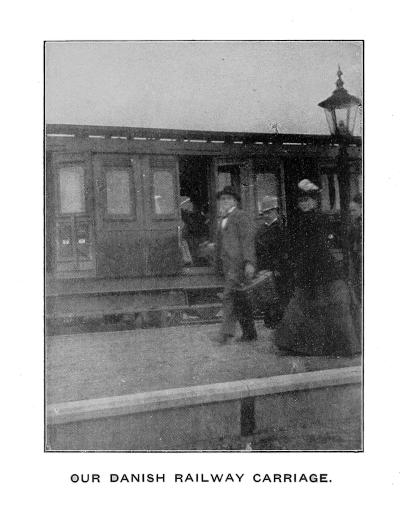
OUR DANISH RAILWAY CARRIAGE.
Hotel Dagmar (“Dahmar”),
Copenhagen, Denmark, August 27, 1902.
Here we are in “Kjoebenhavn,” which word you will find it quite impossible properly to pronounce, however strenuously your tongue may try.
My letter, beginning in Esbjerg, was broken short by the necessity of sleep. We wisely remained upon the ship and took full benefit of our comfortable berths. In the morning we were up betimes, obtained a cup of coffee and a roll, and then, sending our bags and baggage to the railway station, set out afoot.
The air was misty, full of a fine drizzling rain. It was regular Scotch and English weather, but the atmosphere was cooler and not so heavy as in Britain. The little stone-and-brick-built town is clean and neat, with its main street well asphalted. It lies on a gentle slope of hillside which lifts from the water. A giant lighthouse, rising from the highest point of land, is the first object to meet the view. Back of this, upon the level summit, lies the best of the town. The[Pg 8] buildings are generally of one and two stories, with steep, gabled roofs.
H, in her Scottish “bonnet,” and I, in my raincoat, were quite impervious to wetness, and we spent the morning strolling here and there, stopping to see, among other things, the tubs and tanks of fish in the market square, where fishwives in big, white caps, stood quite heedless of the rain. The fish were almost wholly the famous roed spoette (red spots), one of the flounder family, much resembling the English sole.
Wanting cigars, I was tempted into a little shop, and found it kept by an intelligent young Dane, who instantly confessed to me, in good United States, that he had lived in America and there done well. In fact, it was plain to see that his heart still beat for the great Republic. His father had died and he had come back to Denmark to care for his old mother, and then, he had fallen in love with the blue-eyed daughter of a citizen of Esbjerg, an only child. So now, with several little Danes added to his charge, he was fixed fast in Esbjerg. But he was “always grieving for America,” he said. He delighted to see us, and sent for his young wife, who came smiling in to us with her baby in her arms. H says he told his wife in Danish, that we were Americans just like all others she would see, if she should ever reach New York! So I bought a box of cigars from him, instead of one or two, and found them good smoking and well worth the very moderate cost.
Crossing the market square to a long, low building, which somehow had about it that indefinable air suggestive of a breakfast comfortably cooked, we came to an inn, in the low-ceilinged dining room of which were little tables set about upon the sanded floor. Two or three men of the sea were smoking in one corner, a bar and a red-cheeked barmaid were in another, and two huge, yellow, Great-Dane dogs occupied most of the remaining space. We chose a table by the window and H ordered roed spoette, rolls and coffee. The fish was delicious, possessing a harder, sweeter flesh than the English sole; and rolls with salted butter rejoiced my palate, for I am dreadfully tired of English butter with no salt; and then we were given big brown pancakes with currant jelly, all we could eat. It was a breakfast fit for a Viking. The bill was only three kroner and twenty oere, which equals about eighty-six cents.
At the railway station, a mile from the docks, our tickets, bought in London, gave us the best on the train, better than similar carriages in England, for here they are bigger, with larger windows and the cars are set on trucks.
The journey to Copenhagen was over and through a sandy, flat and slightly rolling country, more carefully tilled and more generally cultivated than in England, with more grain, wheat and rye; with more vegetables, turnips, carrots, cabbage and potatoes. There were cattle, herds of large red cows, for Denmark is now the dairy of all Europe. But I saw[Pg 10] no steers, nor beef cattle, fattening for the market, and but few sheep; nor any hogs running afield—the last are probably kept up. The houses are set singly upon the farms, are surrounded by outbuildings, and are usually of one story and often big and rambling with ells and gables, and generally have thatched roofs. The barns are big and substantial. More people are here upon the land than in England, and not living in clustered villages, as in France; the fields are divided usually by hedges. There are sluggish waterways and canals, and ponds where fish are bred and raised for market; and almost every hilltop is capped with a Dutch-looking windmill.
The train moved deliberately. It made from twenty to twenty-five miles
an hour, stopping a long time at each station. We hadn’t gone far when
a bald-pated, round-headed Herr climbed in and we speedily fell into
talk with him. H speaks Danish enough to get on, and I use my pocket
dictionary, and pick up what I can. His name was Hansen and he “owns”
the “Hotel Kikkenborg,” at “Brammige,” wherever that may be. He told
us of the country we were passing through and helped me on the Danish
gutturals. You must gurgle the sounds down in your gullet as though
you were quite filled with water, and the more profound the depth from
which the sound comes forth, the more perfect the speech. We lost him
at the first change of cars, when we boarded an immense ferryboat to
cross the strait of water called the Little Belt, which separates
the main land from the large island of Funen, but we found ourselves
again in kindly company, this time, with a gray-bearded man and two
ladies, his wife and daughter. He was “Inspector of Edifices” for the
Government. They had been spending a few weeks on the island of Fanoe
at Nordby, a fashionable seaside resort much patronized by the gentry
of Copenhagen. He talked with me in fluent German, and the ladies
conversed readily in French, while all spoke with H in Dansk and so
we got on, fell fast friends and were introduced to a beau of the
Froeken, a young “Doctor” who had “just taken his degree.” We sat
together while crossing the island of Funen and on the ferryboat top
all through the long sail across the Big Belt which divides Funen from
the island of Zealand. Our friends here pointed out to us where it was
that Charles X of Sweden, and his army of foot and horse and guns made
their dare-devil passage on the ice that night in January, 1658,
crossing the Little and Big Belts to Zealand and Copenhagen, forcing
the beaten Danes by the Peace of Roskilde to cede the great Provinces
of Skaania, Halland and Bleking, which made Sweden forever henceforth
a formidable European state,—“God’s work,” the Swedes declared, for
these salty waters were never before frozen solid enough to bear an
army’s weight,—nor have they been since. We parted only at the
journey’s end. Our friends were pleasant people of the aristocratic
office-holding class, content to live simply on the modest[Pg 11]
[Pg 12] stipend
the Government may grant, who neither speak nor read English, and who
listened to the tales of bigness in America with doubting wonder. “A
building twenty stories high!” “Impossible!” “Eighty millions of
people!” “Incredible!” “America already holds four hundred thousand
Danes—one-fifth of the Danish race.” “Ja! Alas! That is too true!”
“Our young men are never satisfied to come back to stay when once they
have lived in America!” “Our young men don’t return, it’s hard upon
our girls.”
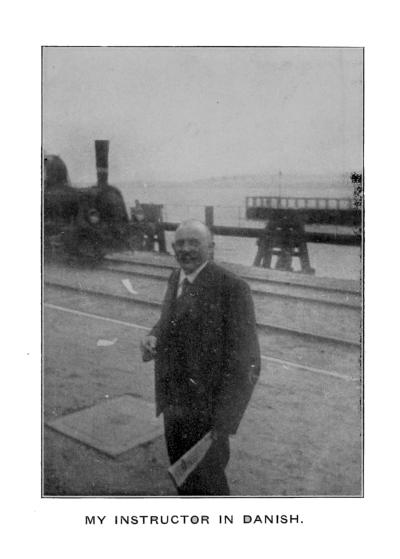
MY INSTRUCTOR IN DANISH.
Our new found friends, when we lunched upon the big ferryboat, introduced us to that very Danish dish called Smoer Broed, thickly buttered rye bread overlaid with raw herring or smoked goose breast, a Viking dainty—a salty appetizer well calculated to make the Norseman quaff from his flagon with more than usual vim, and to drive an American in hurried search of plain water! These salty snacks of cold bread and cold fish are as eagerly devoured and enjoyed by the Scandinavian as are the peppery, stinging eatables for which every Mexican palate yearns.
It was dusk when we arrived in the large and commodious Main station at Copenhagen. The suburbs of the city were hidden from us by the gathering darkness, and the electric lights were glowing when we left the train.
We missed General and Mrs. C at the station, so great was the crowd, but found them when we came to our hotel, the Dagmar, they having themselves missed us and followed on our track.
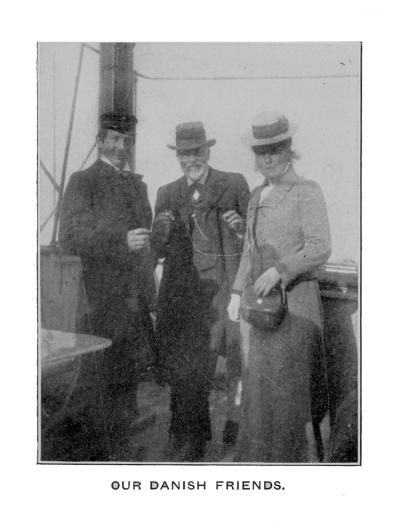
OUR DANISH FRIENDS.
There are many good hotels in Copenhagen and this is among the larger and more popular stopping places of the Danes themselves. It is built along the clean Vestre Boulevard, with umbrageous trees in front of it, and possesses that rare thing, an elevator. In the dining room we sit at little tables, and find the cooking much superior to what one generally meets in England. It is more after the French sort, the Danes priding themselves greatly upon their soups and sauces. In our rooms, which look out upon the broad, paved boulevard, the furniture is old style mahogany, very substantial, and in the corner there is one of those immense porcelain stoves reaching to the ceiling, which is the general mode of heating large rooms in these Scandinavian lands.
Copenhagen is a city of four hundred thousand people, one-quarter of
the estimated population of Denmark, and the city is growing steadily
at the expense of the country,—increasing too fast for a land the
population of which is as steadily growing less. English is said to be
the fashionable foreign tongue in court circles, by reason of the
British royal connection; but among the people the German speech is
steadily and stealthily taking a foremost place, and this despite the
fact that the Danes dislike Germany and view the Germans with
well-founded fear. You will talk to a Dane but a few moments before he
is pouring out his heart to you about the atrocious[Pg 13]
[Pg 14] robbery of the
splendid Provinces of Sleswik and Holstein, of which Bismarck
despoiled the little kingdom nearly forty years ago. Almost half of
Denmark was then lopped off at a single blow,—nor England nor Russia
interfering to save the Danes,—and now they are ever in uneasy spirit
lest Germany encroach yet more upon them and ultimately devour them,
land and sea. They feel she is incessantly creeping on to them with
all the cunning of a hungry cat.
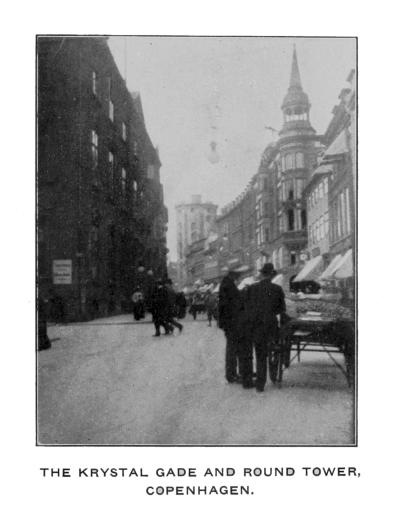
THE KRYSTAL GADE AND ROUND TOWER, COPENHAGEN.
Kjoebenhavn, Dannmark,
(Copenhagen, Denmark), August 28, 1902.
The Copenhagener declares that his beloved “Kjoebenhavn” is not really an ancient city, although he admits it has been in active business since the middle of the tenth century, nearly one thousand years.
My Danish friends assert that it is my “Yankee eye,” which is so new, and prove the modernity of their town by telling me how many times it has been bombarded, how often sacked and razed, how frequently burned up; and yet, despite their facts, I still make bold to say the city bears the markings of an ancient town.
Long, long ago, even before the time of King Gorm the Old, here were markets by the water’s side, where the fisherman brought his catch, the peasant fetched his eggs and milk and cheese and what the soil might yield, where the itinerant merchant came to show and trade his wares. These handy markets by the sea were at first moved constantly about; by and by they came to be held, year after year, in the self-same spot; the temporary clustered settlement[Pg 16] became a lasting town. As the centuries rolled on these market hamlets expanded into a single commercial rendezvous for all the northern world. Thus Copenhagen won her name (Kopman-haven—merchant port) and grew until her commerce made her the heir to the trade and traffic of the Hanseatic League, and she was recognized as supreme mistress of the commerce of the North by London and Bremen, Brussels and Bordeaux, as well as by the merchant fleets of Venice and the Levant.
Those were the days when her Kings and hardy seamen would as lief drink and fight and die as eat and live; their very recklessness made them masters of the North; they even annexed the mighty Norseman, and made Norway a Danish Province; they hammered and held in check their doughty cousins, the Swedes; they brought beneath their sway the Provinces of Skaania, of Halland and of Bleking, the southern portion of what is now known as Sweden; they dominated the cities along the shores of the North and Baltic Seas.
Copenhagen became, in fact as well as in name, the veritable capital of the North. In politics and in intrigue she played the master hand. She gathered to herself the arts and the sciences, the fashion and the elegance, of the North; and to-day, although warlike pride and power have fallen from her, although trade and commerce have lessened in her midst, yet the arts and the sciences, the culture and the elegance are still her own, and the fine old city claims to be as markedly as of yore the intellectual center of the Scandinavian race.
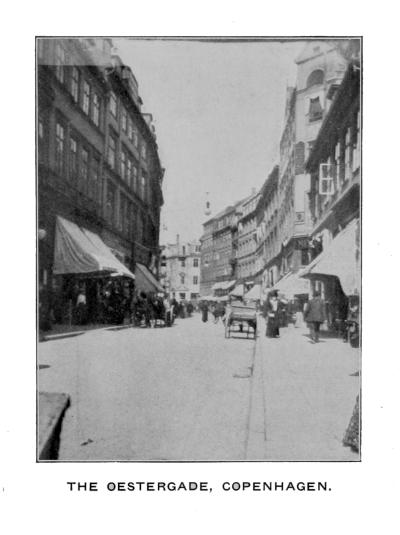
THE OESTERGADE, COPENHAGEN.
Copenhagen is a flat-lying city; it has no hills in it, while there are many canals and watery lanes which wind through it and lead to the sea, or as the Danes would say the Sund (Sound),—that narrow strait which links the Baltic to the Kattegat, where Denmark and Sweden appear once to have split apart.
The buildings are generally of brick, sometimes of stone, never of wood; they are large and substantial, often four and five stories high, with gabled roofs, sharp and steep, covered with tiles.
In the older parts of the city, the streets are narrow, and twist and turn and change their names even more often than the Rues of Paris. In the newer section, toward the north and northwest, there are long straight boulevards and straight cross streets, and the inevitable air of modern monotony.
The feeling and impression which stole over me the first morning I
strolled about the city became almost one of sadness. The wistful,
pensive faces of the people; their unobtrusive politeness; the
inconsequential traffic of drays and carts along the quiet streets;
canals and quays half empty where there should have been big packs of
boats; absence everywhere of bustle and ado,—all these were almost
pathetic. It might have been a Puritan Sabbath, so silent stood the
big stone docks and piers among the lapping waters. There was none of[Pg 17]
[Pg 18]
the ponderous movement of London, none of the liveliness of Paris, nor
the busy-ness of Hamburg, of Bremen, of Amsterdam, of Rotterdam and
Antwerp, although once Copenhagen was peer of any one. The bales of
goods, the tons of merchandise which once filled her lofts and cellars
are no longer there. The commerce which once made the city rich and
gave her power has ebbed away. She is far fallen into commercial and
industrial decay.
The causes which have wrought this collapse of the once great city are, perhaps, difficult to analyze. At least, those Danes with whom I have talked upon the matter are not at all agreed. Nor are they united upon the solution of the problem of restoring the city to the proud place she once held as metropolis of the northern world.
Some tell me that after the demise of the present King, and the passing of Sweden’s ruler to the Halls of Valhalla, then will it be possible for the Scandinavian peoples to come together in one permanent federation, or federal pact, where the Norwegian-Democratic spirit shall instil new energy into the now moribund political body of the sister states, and that then Copenhagen will be the natural capital of this free and potent Scandinavian state, and then will come to her the splendor and dignity justly her due.
Others declare, and declare with a flash of terror in their eyes, that the only hope for Copenhagen, the only hope for the pitiful remnant of the once proud Kingdom of Denmark, is to be wholly devoured by [Pg 19]the Hohenzollern Ogre, to be by him chewed fine, gulped down, digested and assimilated as part of the flesh and blood of the waxing German Empire. Then will Copenhagen become the chief seaport of the German Hinterlands to the south, then will the importance of Bremen and Hamburg and Kiel be expanded into the new vigor that will have come to Copenhagen. They point to the inevitableness of this destiny as evidenced by the subtle, silent, incessant encroachment of the German tongue among the people of the city as well as throughout the land, and by the continuous invasion and settlement of the city and country by men and women of German breed. They say the Imperial monster grips them in a clutch whence there is no escape.
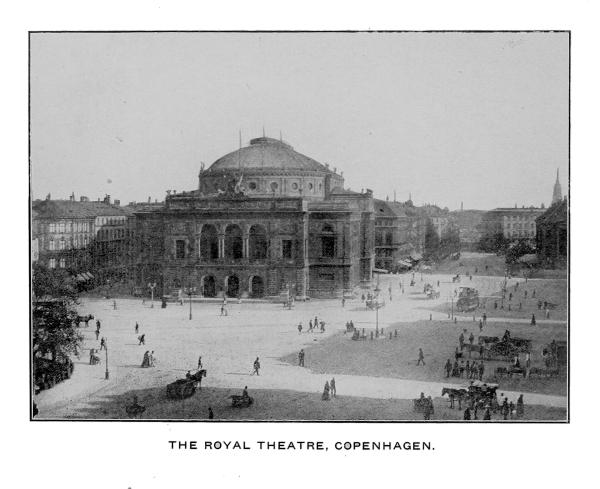
THE ROYAL THEATRE, COPENHAGEN.
Whatever the future may have in store for stricken Denmark and Copenhagen, it is clear enough to the apprehension of the friendly stranger that the noble city is ailing and benumbed. She stagnates, and only revolution and rebirth into a greater Scandinavian state, or Germanic conquest and absorption, will restore her to her former place. It is natural for an American to hope for Denmark and her people a rehabilitation through the uplifting influence of a Scandinavian Republic.
There are fine shops in Copenhagen; behind the unpretentious fronts along the Oestergade, the Amagertorv, the Vimmelskaft and Nygade and neighboring streets is stored great wealth of fabrics and of merchandise. Here we saw the notably handsome[Pg 20] pottery and artistic porcelain ware for which Copenhagen is already famous beyond the sea; and H and her mother have delightedly bought several charming pieces of the latter and ordered them sent forward to New York. They have also quite lost their hearts, and certainly their kroners, over the exquisite gold and silver and enamel work manufactured here, while they declare the laces and drawn work—particularly what is called Hedebo—excels anything of the kind they have discovered in London. The Dane is a poet, a dreamer, an artist; he is also a patient artisan, and what he produces ranks among the world’s best work.
Passing along the narrow sidewalks you would never suspect what is stored behind the plain exteriors, for the Dane has not yet learned the art of window display, nor has he acquired the skill of so showing his goods that the buyer is caught at a single glance. If you would purchase, you must have already determined what you want, and then, upon asking for it, will be given liberal choice.
The shops are mostly small, each seller dealing in a single ware. Only one Dane, a wide-awake newcomer from Chicago, has dared to introduce the complex methods of “department” trade. He has opened an immense establishment called the Magazin du Nord, where thus far is done a rushing business. But the conservative merchants of Copenhagen have not yet become so well assured of the success of this innovation that they are willing to follow the example set.
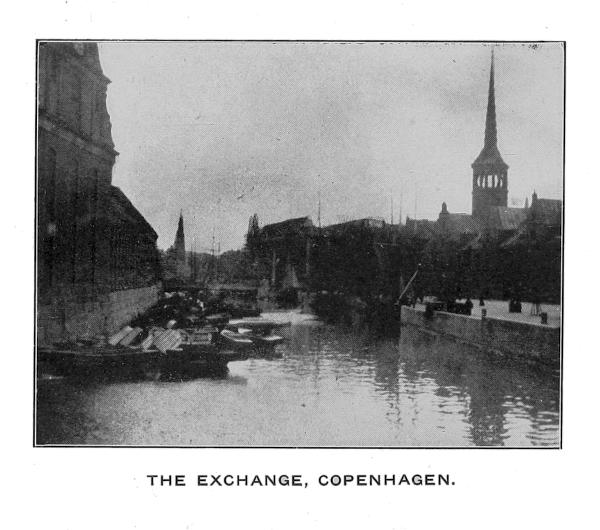
THE EXCHANGE, COPENHAGEN.
In company with the ladies I have been out all the afternoon along these narrow streets—streets where the narrow sidewalks are altogether insufficient to accommodate the passing crowds, which consequently fill up the middle of the way—and we find the Frus and Froekens of Copenhagen apparently as much devoted to what is called “shopping” as our own fair dames at home. Buxom and yellow-haired and rosy-cheeked, they throng the streets each afternoon. They are comely to look upon, and carry themselves with more graceful carriage than do the women of England. They walk deliberately, with none of the nervous scurry of their transatlantic sisters. Indeed, it is hinted to me, they have not come out so much to buy as to meet some friend or neighbor, and exchange a bit of news or gossip in one of the numerous and cozy cafes where is sold conditterie:—candies and chocolates and coffee and little cakes.
Next to conditterie, the Copenhagener is fondest of his books and the town abounds in bookshops, big and little. Every Dane reads and writes his native tongue, and among the educated, English and French and German are generally understood. In the book stores I visited I was always addressed in English, and found French, German and English and even American books upon the shelves; and more newspapers and magazines are published in Copenhagen, a Danish friend declares, than in any other city in Europe of its size. The Danes have, too, a widely established system of free circulating libraries and book[Pg 22] clubs, which extend throughout the countryside of Zealand and Funen and Jutland, as well as in the towns, while Copenhagen is supplied also from the extensive collections of the University and Royal Libraries.
The public schools and the University we did not see, for the season was the vacation interval, and the teachers, professors and students were all dispersed. But the schools and University of Copenhagen are modernly equipped. The Dane is intelligent above all else, and he has always paid great heed to the adequate education of his race. Indeed, Copenhagen was the first city in Europe to establish real public schools, opening them in every parish more than three hundred years ago.
There are many Torvs about the city, market-places where all sorts of things have once been sold, but which are now become wide-open public squares. The old word Torv has already lost its ancient meaning, even as has the word Circus, which in London first sounds so strange to American ears. But while the Gammelstorv, the Nytorv, the Kongen’s Nytorv and many others are now degenerated into these mere open breathing spaces between the big buildings of the town, there are yet Torvs where fish, and flowers, meats and vegetables, and things else are offered for sale. The most attractive of them all to me were those where are sold the flowers and the fish.
In the Amagertorv were heaps of pale and puny roses, and diminutive asters and chrysanthemums, [Pg 23] along with splendid pansies—“stepmother flowers,” as the Danes call them—and luxuriant piles of mignonette, and big baskets of pinks and phloxes; where rosy-cheeked women, in starched white caps, smilingly urged me to buy, and one Froeken with a wealth of yellow hair and cobalt-blue eyes, pinned on my coat a monstrous pansy for boutonnière.
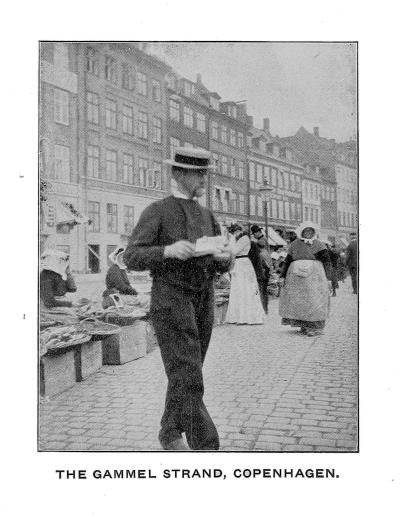
THE GAMMEL STRAND, COPENHAGEN.
Among the fishwives of the Gammel Strand there was always lively stir, for their fisk must early find a buyer, and by midday they themselves must be back to their nets and boats. These Danish fishwives, moreover, have a burden of responsibility quite unknown to their English, German, Dutch and French sisters. Not merely must they sell the fish which the men turn over to their keeping, but they must also preserve it hearty and alive, else the dainty Danish housewife will not buy. The fish are kept in large tubs and tanks filled with fresh sea water, where they swim about as keen and lively as they might do in the sea. The buyer scrutinizes the contents of these tubs with a fine and practiced eye; she picks out the fish which swims and splashes to her mind; has it lifted out alive, and carries it home in a bucket of water which she has brought to the market for that purpose. A fish which is dead, a fish which has died of strangulation in the air, is looked upon with horror and rejected as unfit for food by all right-acting Danish stomachs. No dead fish, preserved from becoming stale through the use of chemicals, ever enters a Danish kitchen. Is[Pg 24] it any wonder then, that the buxom red-cheeked women and sturdy men of these seafaring lands prefer a square meal of sweet fresh fish to any other! Sauntering along the Strand I espied the cod and mackerel and herring under names I did not know, and everywhere foremost among them all the now familiar roed spoette, the Danish epicure’s delight.
The streets of London are choked with moving vehicles, or those drawn up in line awaiting fares. In Copenhagen one is struck at once by the absence of the equipages of the rich, the very limited number of cabs anywhere about, as well as the small number of heavy drays, even upon the wholesale business streets. One might almost say that the streets would seem deserted if it were not for the pigeons and the dogs. There must be many dove-cotes in Copenhagen and the birds certainly have hosts of friends. But the dog, the unabashed and capricious dog, is the real king of Denmark’s capital. After seeing him in Holland and in France, where his dogship is a faithful co-worker with man, toiling all the long day and longer year to eke out the income of his master, one almost envies the lot of the dogs of Copenhagen. These beasts abound throughout the city; neither tag nor muzzle adorns them, nor do owners seemingly claim them, but from puppyhood to gaunt old age they lead a boisterous and vagabond life, to the terror of small children and their nurses, and the well-gowned women who may chance to cross their trail. Whether they survive through performing the office[Pg 25] of scavenger, as do the dogs of Constantinople, I have never been informed, but whatever the cause, the curs of Copenhagen take as full possession of that town as do the tame vultures of Vera Cruz.
We visited, of course, the many objects of interest the tourist is expected to see; we studied the splendid collection of the masterpieces of Thorvaldsen, housed in the stately building where also is set his tomb; we looked at the collection of ethnological relics, one of the most notable in the world; we lingered in the old castle of Charlottenborg, and the new art galleries where are gathered many of the master paintings of which the Danish capital is so proud; we admired the great round tower, up the spiral causeway of which a squadron of dragoons may ride to the very top, and Peter the Great ascended on horseback; we duly marveled at the much bepraised Fredriks Kirke, a marble edifice, smothered beneath a ponderous and ornate dome; and H and I spent a delightful hour in the noble Vor Frue Kirke, where her grandmother was wedded some sixty years ago; the banks and the Bourse, the imposing new Hotel de Ville—the finest modern building in Denmark—the Legislative Palace, Christiansborg and Rosenborg and Amalienborg and Fredriksberg. We saw what of them the public is allowed to see; we also drove and strolled upon the fine wide Lange Linie Boulevard along the water side, shaded by ancient and umbrageous lindens, whence may be viewed the inner and outer harbors and Free Port and the spacious, new and half[Pg 26] empty docks, and much of the shipping, and where of a pleasant afternoon the fashion and beauty of the city are wont to ride and drive. We joined in with the multitude upon the long, straight Fredriksberggade, where the life and movement of the city may be watched and studied, even as upon New Orleans’ Canal Street and New York’s Broadway; and we did all else that well instructed Americans are taught to do. But after all, these are the things that Baedeker and the guide books tell about. To me it is ever of higher interest to learn from the people themselves by word and touch what my own senses aid me to see and hear, and so it was only when I met some of my wife’s Danish kin, and a broad and burly Berserker clasped me in his arms and implanted a smacking kiss upon either cheek, ere I knew him to be of her relations,—that I felt my acquaintance begun with the most polished and elegant branch of the Scandinavian race.
Other parts of nights and days we spent with friends in the lovely Tivoli gardens, where all the Copenhagen world, high and low, rich and poor alike, are wont to meet in simple and democratic assemblage, equally bent upon having a good time. “Have you seen Tivoli?” is ever almost the first question a Copenhagener will put. There we watched the famous pantomime in the little open booth beneath the stars, a sort of Punch and Judy show; there we entered the great music hall where the Royal band plays, and the crowded audiences of music-loving Danes al[Pg 27]ways applaud; there we drank the Danish beer which is admitted to be the best on earth—so a Danish neighbor whispered in my ear. Tivoli is the Copenhagener’s elysium. When he is blue he gets himself to Tivoli; when he feels gay he travels to Tivoli; alone or in company he goes to Tivoli, and he goes there as often as time will permit, which is usually every night.
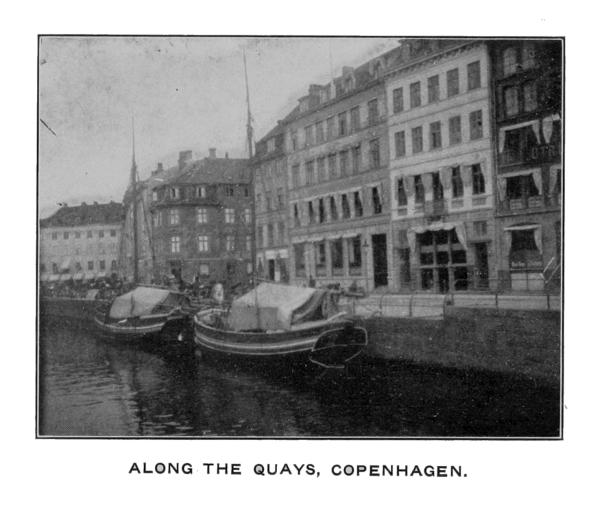
ALONG THE QUAYS, COPENHAGEN.
A most difficult problem for Copenhagen has been that of draining and sewering the city. It lies so low, almost at the dead level of the sea, and the tides of these Baltic waters are so insignificant—ten to twelve inches only—that for many centuries Copenhagen has been a most unhealthy city, infected by cesspools, tainted by blind drains, and defiled by accumulated poisons, until its death rate was higher than that of any other city in Europe. But at last the problem is solved. Forced water and giant suction pumps wash and drain out the elaborate system of pipes, and spill the death-laden wastage at a distant point into the sea, and with this transformation Copenhagen has become a measurably healthy city.
Perhaps it is this century-long fight with death, plague and epidemic knocking continually at her doors, which has endowed Copenhagen with so many fine hospitals and public charities for the care of the sick,—few cities in Europe are so elaborately provided. Hand in hand with the hospitals are also institutions for caring for the destitute and very poor. Denmark has never followed England’s pauper-creating[Pg 28] system, but the beggar on the street is promptly put in jail, while the deserving poor is given a kindly and helping hand.
One of the most charming spectacles of the city is its extensive public gardens, where the ancient defenses are converted into parks, and the moats are transformed into ponds and little lakes where swans and geese are kept, and boys sail toy boats. The landward side of the city is thus almost encircled with these pleasure grounds. One morning we were crossing one of these gardens, the lovely Oersteds Park, when I caught a pretty picture with my kodak, a little two-years-old tot learning to make her first courtesy to a little boy of four or five. She dropped and ducked and bent her little body with all the grace of a Duchess of the Court.
Denmark is about the size of three-fifths of West Virginia, comprises fifteen thousand square miles and contains less than two millions of people,—about sixteen hundred thousand. She possesses no deposits of coal or iron, no forests of valuable timber; she has few manufactures. Her people are farmers making a pinched living off the land, raising lean crops and selling butter and cheese, or they are crowded—one-fourth of them,—into the city of Copenhagen, or they are gaining a hardy livelihood upon the sea. And yet this diminutive kingdom puts up $275,000 a year for the keeping of the King, and also provides him and his family, tax free, with palaces and castles, and estates whereon to fish and hunt and play.
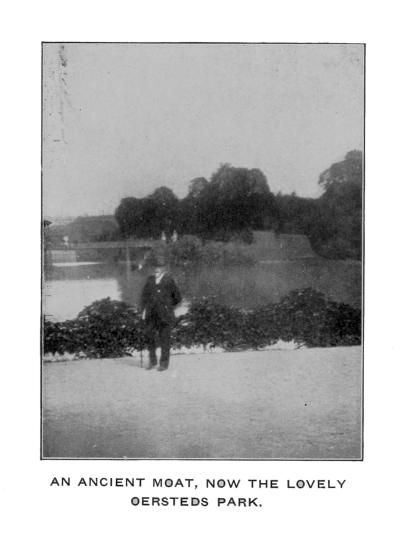
AN ANCIENT MOAT, NOW THE LOVELY OERSTEDS PARK.
To an American mind it is amazing that a competent people will accept and suffer burdens such as these.
In the great state of New York, with its seven millions of people, with wealth of coal and iron, with immense primeval forests, with cities whose commerce expands with a swiftness almost incredible, the Governor is paid $15,000 a year, and allowed a single mansion wherein to dwell. Massachusetts, Vermont and Michigan, and many other commonwealths, pay their Governors but $1,000 per year, without a mansion for their residence.
The mighty Republic of the United States itself, with a continent for domain, and eighty millions of people, pays its President $50,000 per year, and gives him the use of the White House for his home.
Therefore, do you wonder, as I stroll about this fine old city, and look into the unhopeful, wistful faces of its plainly clad, not over-rich nor over-busy people, that I begin to comprehend why Copenhagen holds the highest record for suicides of any city in the world, and why so many of her vigorous, and alert and capable, young men continually forsake their native land for the greater opportunities and freer political and industrial atmosphere of the United States?
The Dane always gets on if you give him half a chance. He is called the “Frenchman of the North.” Graceful and supple in his manners, with a mouthful of courtesies of speech, he is naturally a social diplomat.[Pg 30] The blunt Norwegian calls him a fop. The martial Swede sneers at his want of fight. But the Dane has always held his own, and as a financier, a diplomat and man-of-the-world able to make the best out of the situation he may be in, he still gives proof of possessing his full share of the Scandinavian brain.
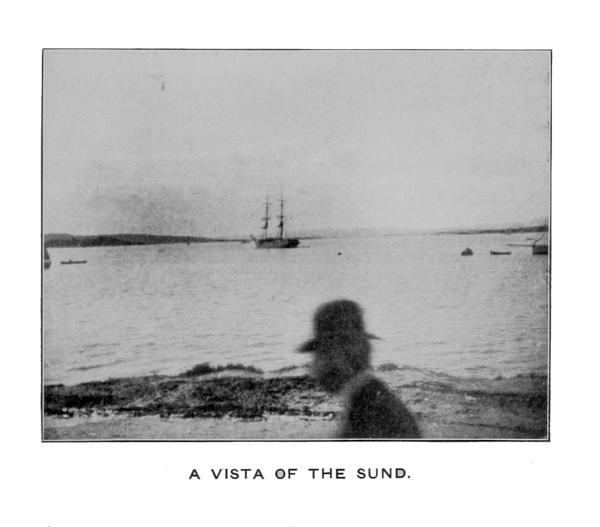
A VISTA OF THE SUND.
Helsinoere, Dannmark, August 29, 1902.
We left Copenhagen Friday evening, about four o’clock, from the Nordbane station. We were in plenty of time. Nobody hurries in Denmark. The train of carriages, with their side doors wide open, stood on the track ready to start. Prospective passengers and their friends moved about chatting, or saying good-bye. It was a local train to Elsinore, where it would connect with the ferry across the Sund to Helsingborg and there with the through express to Stockholm and Kristiania, a night’s ride. We would go to Elsinore, and there spend the night, and go on by daylight in the morning.
A good many acquaintances had come down to see us off, just for the
sake of friendliness. I had kissed all the rosy-cheeked Froekens and
been kissed by the Frus, having dexterously escaped the embraces of
the men, when there loomed large before me an immense Dane, near six
feet high and proportionate in girth, brown-bearded and blue-eyed,
holding an enormous bouquet in either hand, an American flag waving
from the midst of each. He made straight for[Pg 31]
[Pg 32] me, folded me up among
the flowers and kissed me joyfully on either cheek, and all before I
really knew just what had taken place; then he doffed his hat, and
bowing profoundly, presented first to me and then to H one of the
bouquets with which he was loaded. And these bouquets were tied up
with great white ribbons! Of course, we were evidently but newly wed.
We suddenly became of interest to the entire company. Nor was there
escape, for General C is well known and popular in Copenhagen. Others
now came up and were introduced, and H and I held a levée right then
and there, and of kisses and embraces I made no count.
The ride was along the Sund, that lovely stretch of salt water, only a few miles wide, which joins the Baltic Sea and the Atlantic. It is more like the Hudson River below West Point than anything I know, except that the shores are low and more generally wooded to the water’s edge. Or, perhaps I should say that it is another and narrower Long Island Sound, as you see it a few miles out from Jamaica Bay. The busy waters were alive with a multitudinous traffic from Russia and Germany and Sweden and Denmark itself, and the fishing vessels that abound along these coasts. Here and there villas and fine country houses peeped out among the trees. The Sund is the joy of the Dane. He loves it, and the stranger who looks upon it does not forget it. One then understands why the Danish poets have sung so loudly of it.
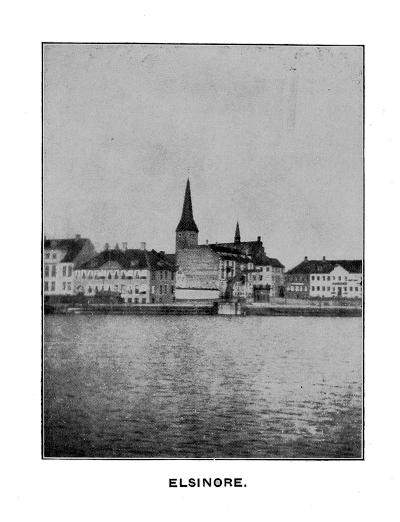
ELSINORE.
Our way lay through much cultivated land, market gardens sending their produce to Copenhagen, dairy farms where is made some of that famous Danish butter every Londoner prefers to buy, and which is sold all around the world. Here and there we passed a little town, always with its sharp-steepled Lutheran church and dominie’s snug manse along its side. The church, the Lutheran church in Denmark, is no trifling power. It is as bigoted and well entrenched as is the Roman hierarchy in Mexico and Spain. We should have liked to be wedded in the Vor Frue Kirke, where the dear old grandmother had been married. But it is a Lutheran church, and we were Dissenters, and without the pale. Nor could we present the necessary proof. We had no papers to show we had been duly born. Nor had we legal documents to prove that our parents were our very own. Nor could we show papers in proof that we had been christened and were legally entitled to our names, nor that we had been regularly confirmed. Without these documents, sealed and authenticated by the state, and in our case also by the United States, no Lutheran pastor would have dared to try and make us one. So we ran the gauntlet of less stringent English law, in itself quite bad enough, and lost the experience of the quaint Danish ceremonial in the noble church.
At the fine big Government station in Helsinoere (Elsinore)—for the Government owns and runs the railroads in Denmark, just as it does in Germany and[Pg 34] much of France—we were met by an aunt and uncle and cousin of H’s. They were a charming old couple, and the son was a young naval engineer (shipbuilder), working in the ship yard at Helsinoere. All have lived in America and speak our tongue. We were to dine with them and spend the evening, when General and Mrs. C would go home on the last train at 10 p. m. I left the ladies together, while D and I strolled over to the ancient, yet formidable, fortress of Kronborg, which for centuries has commanded the gateway to the Baltic. Built of Norwegian granite, when erected it was believed to be impregnable. Its casemates, lofty walls, turrets and towers frowned threateningly across the three-mile strait to Helsingborg in Sweden, and no boat sailed past except it first paid the dues. To-day, these walls of rock, these ramparts in the air, no longer terrify the mariner. Sund taxes are no longer levied! The ancient fortress does little else than fire an occasional salute. But the Danes still love and honor it, and a few soldiers are stationed in it, a solitary guard.
A vista of the Sund I tried to kodak from the top of the great tower, and I bribed a soldier for a dime to let me take his manly form, although a camera is forbidden within the precincts of this place of war.
But Kronborg is famous for other things than mere Danish tolls and wars. Kronborg it is, where Hamlet’s shade still nightly wanders along the desolate ramparts. There it is that the Danish prince beheld his father’s ghost. There he kept watch at night with [Pg 35]Horatio and Marcellus. And close by in the park of Marienlyst Castle is Hamlet’s grave. We did not see it, but many pilgrims do.
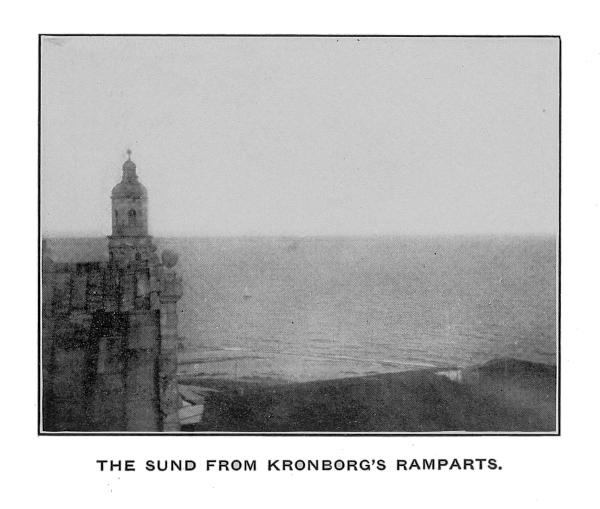
THE SUND FROM KRONBORG’S RAMPARTS.
Then we descended into the deep dungeons, or part of them, and a pretty, rosy-cheeked, blue-eyed Danish lass told us tales of Holger Danske, who lives down in the deepest pits, whose long white beard is fast grown to the table before which he sits, and who is to come forth some day and by his might restore to the Danish race its former great position on the earth; and she told us also of the human tragedies which have in past ages been enacted in these keeps. She spoke in soft, lisping, musical Danish, the only sweet Danish I have heard; for the Copenhagen speech is jerky, the consonants are chopped short, and the vowels are deep gurgled in the throat, difficult for foreign ears to comprehend.
After seeing the fortress, we visited an ancient monastery, suppressed when the Roman church was driven from these northern Lutheran lands, and now become an Old Ladies’ Home—shocking transformation in the contemplation of those monkish shades which may yet roam the forsaken cloisters!—of which institution the old uncle is now Superintendent with Government pension for life!
And then we came to the cozy home where the ladies were already met. We entered a narrow doorway, a sort of interior storm door, and turned to the right into a comfortable sitting room, beyond which was the dining room, with the table set. The aunt is a gentle,[Pg 36] round-faced, rosy-cheeked little woman, in a white lace cap and the prettiest of manners. With her was an old spinster friend, Froeken——, a slim, wizen-faced dame of sixty, in brown stuff dress, with tight sleeves and close fitting waist, and old lace at the throat, fastened by a big mediaeval-looking gold brooch, and with a gold chain about her neck. She possessed very small, bright black eyes, and lips that stuck straight out. She courtesied,—dropped down straight about ten inches and came up quick, a sort of bob—smiled, and said in Danish, “she was rejoiced to meet H’s ‘Mand.’” All were very friendly, and H to have caught a Mand, sure enough, was treated with distinction.
The table was set for eight; there was beer in glass decanters, cold fried fish, cold smoked goose breast, cold smoked salmon (raw), cold sardines, cold calveshead jelly, cold beef loaf, cold bread, black bread, rye bread, cold rolls (hard and shiny with caraway seeds in them), gooseberry jelly, spiced currants, and also tea, this latter piping hot. At each place was set a pile of salted butter (at least a pound) on a little dish. I sat next “Tante,” with Froeken—across the table from me, her black eyes boring me through with steady gleam. You take your fish up by the tail and eat him as you would a piece of bread. “Butter him thick, yes, thick,” “Tante” said to me. I laid on about half an inch, she did, they all did. It was delicious butter and that fish went down wonderfully slick. The goose breast was good, but I discerned [Pg 37]it to have been a gander. The raw herring I did not find so attractive as the goose. There were also several sorts of cheese, of which every one ate much. You put a heavy layer of butter on your bread, then a layer of thin cut cheese, then a layer of herring or sardine or salmon, and eat it fast. There was no hot food, there never is. The rule is to stow away cold fish, butter and cheese, and wash it down with the strong brown beer. The sweets are then taken to top off with. Pickles and preserves together—just like the Germans. (I have not yet run into the sour foods in which the German stomach delights.) Having begun with a mild cheese, you gradually ascend to the strongest with the final sweets. H says the meal was only “supper,” not dinner, but I confess I am so mixed on these Scandinavian meals, that I cannot yet tell the difference. At breakfast, the Danes take only a cup of coffee and a roll, the Spanish Desayuno; not even an egg, nor English jam. About one or two o’clock in the day, they dine, having soups, meats (roast or boiled), fish (fresh and salt), vegetables and beer. At night, it is about as I have told you, and they often dare to add a little more cold fish and cheese before they finally retire. The soups at dinner are very good; and the meats are better cooked than at a British table, on which, after a while, all meats begin to taste alike, and you grow tired to death of the eternal boiled potatoes, and boiled peas steeped in mint. I have had very nice cauliflower at Danish tables, and the lettuce of their salads is delicate and[Pg 38] crisp, while the coffee of the Danes, like that of the Dutch, is better than you will find in either England, Germany or France; it seems to be the real thing, with neither chicory nor hidden beans. The Danes are skilful cooks, although their palates seem to be fondest of cold victuals and raw smoked fish.
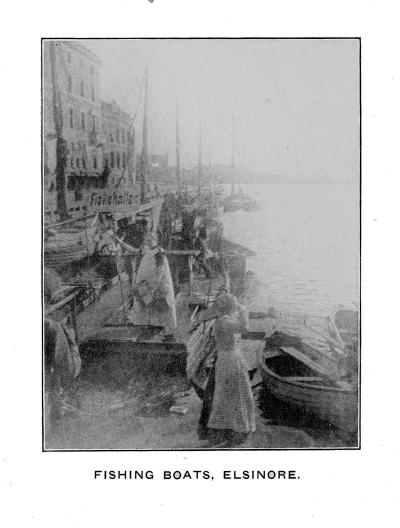
FISHING BOATS, ELSINORE.
We stayed the night in a comfortable inn, close by the water side, an ancient ale house where sailors used to congregate in the halcyon days when all passing ships must lay-to at Helsinoere to pay the tolls then levied by the King, hard by where now the fishing boats tie up. There were many of these and one in particular was continually surrounded by an excited crowd. It had just arrived loaded down to the decks with a catch of herring. The fishermen had had the luck to run into one of those rare and extraordinary schools of herring which are sometimes chased into the protecting waters of the Sound by a whale or other voracious enemy outside. The nets had been let quickly down and millions of fish as quickly drawn up. The boat had been filled to sinking, and word flagged to brothers of the craft to hasten up and partake of the abounding catch. Twenty thousand dollars’ worth of herring had been caught within a few hours by the fishermen of Helsinoere alone, to say nothing of what were taken by the crews of other fishing boats along the coast. The entire population of the little town is now busy cleaning and salting fish, fish that will feed them well and keep them easy in stomach until the winter shall be [Pg 39]past and the spring be come again. Women were selling fish along the streets, boys were peddling fish, how many for a cent I do not know, and men were giving fish, gratis, to whosoever would carry them away. These extraordinary catches do not often happen. No such luck had befallen Helsinoere for many a day. It may be years before it again occurs. The fisherman of these northern waters sails forth upon his cruise each day inflamed with very much the same spirit of adventurous quest as in America are we who, living upon the land, drill wells for oil or dig for gold.
Helsinoere is rich to-night, and the herring is her king.
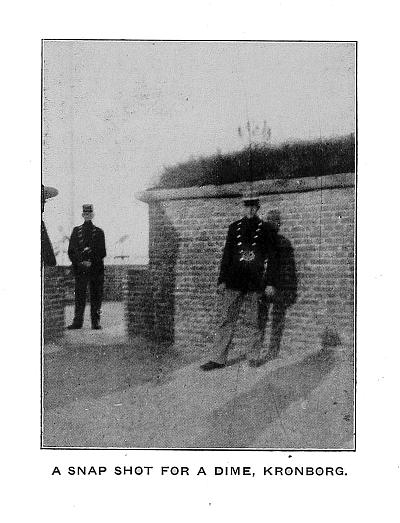
A SNAP SHOT FOR A DIME, KRONBORG.
Kristiania, Mission Hotel,
Pilestradiet 27 (Alfheim), August 31, 1902.
Hilsen Fra Kristiania!
Our ancient tavern, the Sleibot, in Elsinore, cared for us most comfortably. We were given a large room looking out over the waters of the Sund, with wide small-paned casemented windows, and a great porcelain stove and giant wooden bedstead. For breakfast we had fresh herring, the fish which will now form the chief diet of Helsinoere for many a month, and more of the good Danish coffee. The bill for lodging and breakfast was seven kroner (about $1.90) for us two.
The dear old couple were on hand to see us off, and waved farvel as we boarded the immense ferryboat which takes on, if needful, an entire train, but usually only the baggage cars, for through travel to Swedish and Norwegian points. The boats are long and wide and strong, and smash their way through the floes of drifting ice the winter through, for this outlet of the Baltic is rarely frozen solid for any length of [Pg 41]time. The four-miles passage is made in twenty minutes, and after we got under way, it was not long before even massive Kronborg faded upon the view, and we were making fast to the pier at Helsingborg, in Sweden.
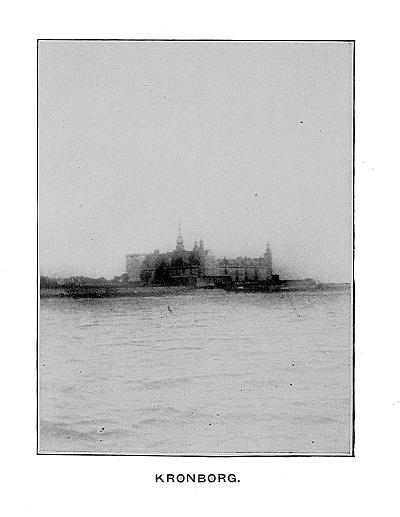
KRONBORG.
In England, owing to the smallness of the tunnels and the present cost of enlarging them, the railway management is compelled to keep to the ancient diminutive style of carriage first introduced sixty years ago. But here, in these northern lands, where railway building is of more recent date, although the gauge is the same as in Britain, the carriages are half as large again, and are many of them almost as long as our American cars, so that the riding in them is much easier than there. And in Norway I have already seen cars which, except for being shorter, were exactly like our own.
We traveled first along the sea, then through a flat country. There were scores of sails upon the Kattegat, a multitude of ships and barques and brigs, schooners and sloops, and small fishing smacks, and larger fishing luggers going far out upon the North Sea. There were also many black hulks in tow of big tugs carrying coal to the Baltic cities, and steamers bound for English and German ports and even for America. The waters were alive with the busy traffic.
We passed wide meadows and much grass land. Cows were feeding upon these fields, red cows mostly, with herders to watch over them. The cows were[Pg 42] tethered each to a separate iron pin sunk in the ground, all in a single row; and thus they eat their way across an entire meadow,—an animated mowing machine. Now and then we returned to the shore of the sea, passing some fishing village nestled along the rocks, or we rolled through forests of small birches, pines and spruce.
In the same compartment with ourselves sat a couple of young Germans. They were much interested in each other. I noticed that the lady’s rings were most of them shining new, and one, a large plain gold ring, was in look particularly recent and refulgent. H came to the same conclusion also at about the very same moment. The two were surely a bridal pair. And they talked German, and looked out across us through the wide windows as though we were never there. So I spoke to my wife in good United States, and we agreed that these two were newly wed. And then the bride’s noble face and fine brown eyes appealed to me, and I declared her to be the loveliest woman I had yet seen this side the sea. The while she and her Mann still conversed in low, soft German. But it now seemed to me that they looked out across us with a kindlier feeling in their eyes and, in a surreptitious way, the German beauty was peeping at the fine large diamond on H’s left hand (the wedding ring she had already succeeded in making look dull and old). At Goteborg (Gothenburg) our train drew up for half an hour’s wait. Here that portion of it going to Stockholm would be [Pg 43]cut loose from our own, and another engine would take us to the north. Along with most of the other passengers the young German and I also got out, leaving the two ladies in the car. At the counter of the big lunch room I watched the ever hungry Norsemen stowing away cold fish and cheese, and was in somewhat of a dilemma what to take, when the German husband of the lovely bride came up to me in a most friendly way, and suggested that I would enjoy a certain sort of fish and thin brown cake, which seemed to be one of the popular objects of attack by the voracious multitude. And he spoke to me in perfect English of the educated sort. He had evidently quite understood my flattering comments upon his bride, and was now my fast friend. I did not show surprise, but took his hint, and afterward we strolled up and down the platform, munching our snack, while he told me that he was a “barrister from Cologne.” “Yes, on his wedding trip.” He had “learned English in the German schools,” he said, and had “never been in England or America.” His wife, he admitted, “could not speak English,” but “could read it and understand it when others talked!” He told me of the German courts, and of his long years of study before he was admitted to the bar. When they left us a few miles further on, for their way lay up through the lakes and forests of Sweden, we parted as old friends, and they promised to visit us if ever they should come across the sea; our unsuspecting admiration had won their hearts!
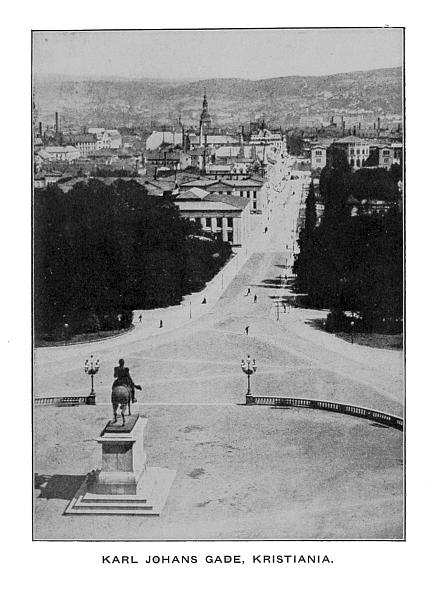
KARL JOHANS GADE, KRISTIANIA.
About 4 p. m., we dined at the small station of Ed, our first example of Swedish railway dinner-serving on an elaborate scale. The train was a long one. There were many passengers. The fish and cheese consumed at Gothenburg was long since shaken down. We were genuinely hungry. But when the train came to a stop there was no rush to the restaurant, nor attempt of every man to get ahead of the one in front of him. The passengers took their leisure to get out, and walked deliberately toward the big eating room. The food was set upon a long central table. There were hot soups, hot boiled fowl, hot meats, an abundance of victuals, cold and salt. There were piles of plates, of napkins and of knives and forks. Everyone helped himself, and ate standing or carried his food to a little table and sat at ease. This latter plan we followed. Rule: Eat all you will, drink as much beer as you desire, take your own time, the train will wait, and when you are quite satisfied pay a single kroner (twenty-seven cents). There is no watching to see how much you may consume. You eat your fill, you pay the modest charge, you go your deliberate way. However slow you may be the train will wait!
We now traversed a barren country of marshy flats; with skimp timber, chiefly small birch and spruce. Toward dusk it was raining hard. The long twilight had fairly begun when we crossed the Swedish border and a few miles beyond stopped at Fredrikshald, where is a famous fortress against the Swedes, besieging which, King Charles XII was killed. Here a customs’ officer walked rapidly through the car, asked a few questions and passed us on. Our trunks had been marked “through” from Helsinoere, so we had no care for them until we should arrive in Kristiania. But that there should be still maintained a customs’ line between the sister kingdoms of Norway and Sweden, which are ruled by a common King, may perhaps surprise the stranger unacquainted with the peculiar and somewhat strained relations ever existing between these kindred peoples.
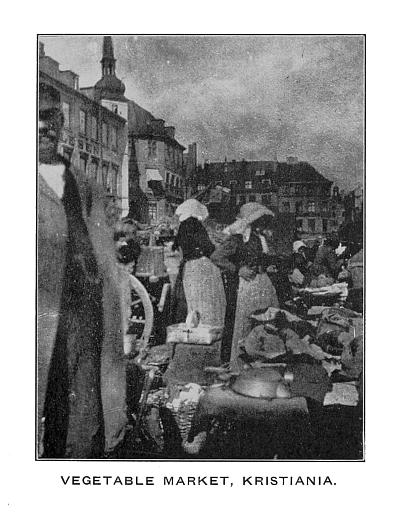
VEGETABLE MARKET, KRISTIANIA.
For many hundreds of years (since 1380) Norway had been a province of
Denmark. Her language and that of the Dane had grown to be almost the
same, the same when written and printed, and differing only when
pronounced. But in 1814, the selfish powers of the Holy Alliance
handed over Norway to the Swedish crown as punishment to Denmark for
being Napoleon’s friend, and threatened to enforce their arbitrary act
by war. So Norway yielded to brute force, and accepted the sovereignty
of Napoleon’s treacherous Marshal Bernadotte, the Swedish King, but
she yielded nothing more, and to this day has preserved and yet
jealously maintains her own independent Parliament, her own postal
system, her own separate currency and her Custom Houses along the
Swedish line. And you never hear a Norwegian speak of any other than
of the “King of Sweden.” “He is not our King,” they say, “we have
none.” “We are ruled by the King of Sweden, but Norway has no[Pg 45]
[Pg 46] King.”
Cunning Russia, it is said, cleverly spends many rubles in order
that this independent spirit shall be kept awake, and the war force of
Sweden thereby be so much weakened. Russia might even to this day be
able to nourish into war this ancient feud between the kindred breeds,
if it were not that in her greed of power she has shown the cloven
foot. The horror of her monstrous tyranny in Finland already finds
echo among the Norwegian mountains. “We are getting together,” a
Norwegian said to me. “We have got to get together, however jealous we
may be of one another. We must, or else the Russian bear will hug us
to our death, even as now he is cracking the ribs of helpless
Finland.” And when I suggested that little Denmark should be taken
within the pale, and a common Scandinavian Republic be revived in more
than ancient force to face the world, he declared that already a
movement toward this end was set afoot, and only needed a favorable
opportunity to become a living fact.
At 11 p. m. we arrived at Kristiania in a pouring rain, and at General C’s recommendation, came to this curious and comfortable hotel. Like many other hotels in Norway, it is kept by women, and seems to be much patronized by substantial Norwegians of the nicer sort. It is on the top floor of a tall building, and you pass up and down in a rapid modern elevator. It is kept as clean as a pin, and the beds we sleep in are the softest, freshest in mattress and linen we have seen this side the sea. We have also [Pg 47]passed beyond the latitude of blankets and are come to the zone of eider down. Coverlets, light, buoyant, and delightfully warm now keep us from the cold, and in our narrow bedsteads we sleep the slumber of contented innocence. We have a large well-furnished chamber, all for two kroner per day (fifty-four cents). When we entered the long, light breakfast hall this morning, we saw a single table running the length of the room, a white cloth upon it, and ranged up and down, a multitude of cheeses big and little, cow cheese and goat cheese, and many sorts of cold meat, beef and pork and mutton, and cold fish and salt fish. And there were piles of cold sliced bread and English “biscuits” (crackers). The coffee, or milk if you wish it, is brought in, and in our case so are fresh soft-boiled eggs. A group of evidently English folk near us had a special pot of Dundee marmalade. The Norwegians take simply their coffee or milk, with cheese and cold fish and the cold bread. Our breakfast cost us twenty cents apiece.
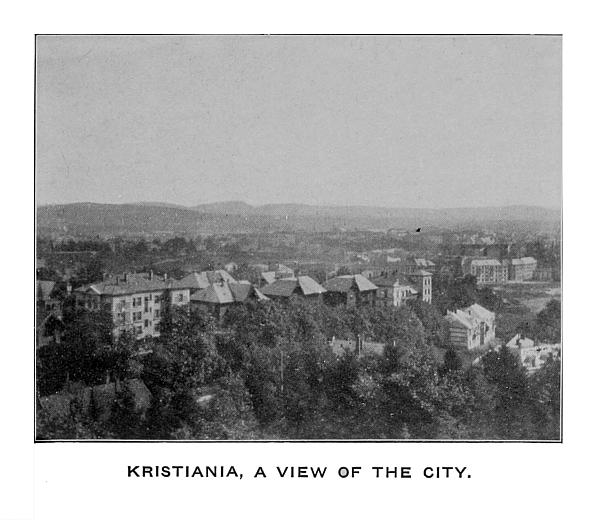
KRISTIANIA, A VIEW OF THE CITY.
To-day the city is washed delightfully clean, the heavy rain of the night having cleared streets and atmosphere of every particle of dust and grime. We have driven all about in an open victoria. It is a splendid town, containing some two hundred thousand inhabitants. It lies chiefly upon a sloping hillside with a deep harbor at its feet. Like Copenhagen, it is the capital of its country, and the seat of the Norwegian Government, of the Supreme Law Courts, and of the Storthing or National Congress[Pg 48] or Parliament. At the end of the wide Karl Johans Gade stands the “Palace of the Swedish King,” a sombre edifice, now rarely occupied. Kristiania is also the literary and art center of the Norse people. Here Ibsen lives, here Bjoernstjoerne Bjoernsen would live, if Swedish intolerance did not drive him into France. The types of men and women we see upon the streets are the finest we have met since coming over sea. Tall and well-built, light-haired and blue-eyed, the men carry themselves with great dignity. The women are, many of them, tall, their backs straight, not the curved English spine and stooping shoulders. All have good chins, alert and initiative. The Norwegians are the pick of the Scandinavian peoples. They are the sons and daughters of the old Viking breeds which led the race. They are to-day giving our northwestern states a population able, fearless and progressive, no finer immigration coming to our shores. Senators and Governors of their stock are already making distinguished mark in American affairs.
It was not long before we perceived that in Kristiania, as in Copenhagen, we were also very close to the great Republic; except that, perhaps, here we discovered a keener sympathy with American feeling, a closer touch with the American spirit.
Those Norwegians whom we have met speak good United States, not modern English. You hear none of the English sing-song flutter of the voice, none of its suppression of the full-sounded consonant, but the even, clear, precise accent and intonation of the well-taught American mouth. And our friends tell us that it is much easier for them to learn to speak the American tongue than to master the often extraordinary inflexion of spoken English as pronounced in Britain. I am gaining a great respect for these Scandinavian and Norwegian peoples. They are among the finest of the races of the European world.
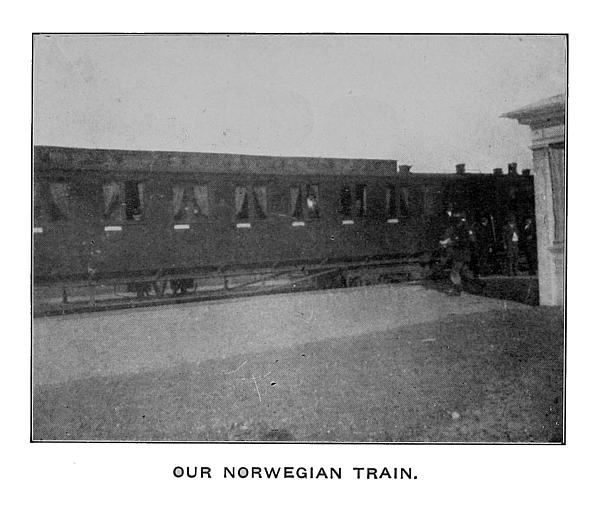
OUR NORWEGIAN TRAIN.
We have driven not merely through the beautiful city and its parks, and beheld the wide view to be had from the tower at its highest point, but we have also visited the ancient Viking ship, many years ago discovered and dug out of the sands along the sea, a measured model of which was so boldly sailed across the Atlantic, and floated on Lake Michigan, at Chicago, in 1892.
At this time, however, we are but birds of passage in Kristiania. We may not linger to become more intimately acquainted with the noble town; we are arranging for a ten days’ journey by boat and carriage through the fjords and mountain valleys, and region of the mighty snow-fields and glaciers of western Norway. We must now go on, and postpone any intimate knowledge of the city until another day.
H is quite ready for this trip. She wears a corduroy shirt waist of
deep purple shade, and has brought with her one of those short,
simply-cut walking-skirts, of heavy cloth. A natty toque sets off her
head. She is fitly clad. And my eyes are not the only ones that note
this fact, as I observed to-day when, to avoid[Pg 49]
[Pg 50] a shower, we sought
shelter under the pillared portico of the Storthing’s fine edifice in
the central square. As we stood there, waiting for the rain to cease,
I noticed a small, fair-haired, quietly-dressed woman intently staring
at the skirt. Each hem and tuck and fold and crease and gore she
studied with the steadfast eye of the connoisseur. And so absorbed did
she become that she grew quite oblivious of our knowledge of her
interest. Around and around she circled, until at last we left her
still taking mental notes. Some other woman in Kristiania, we are
quite sure, will soon be wearing a duplicate of this well made costume
from New York.
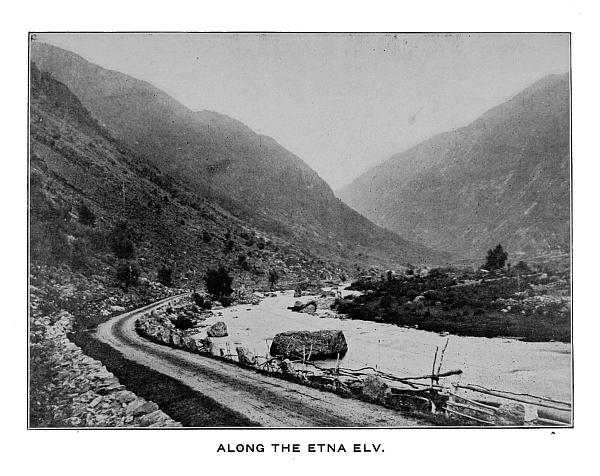
ALONG THE ETNA ELV.
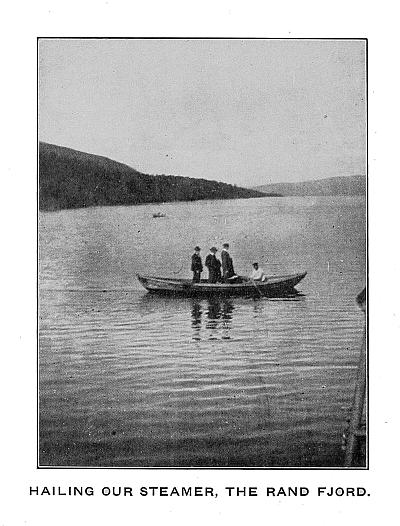
HAILING OUR STEAMER, THE RAND FJORD.
Frydenlund, Norge, September 1, 1902.
We left Kristiania about seven o’clock this morning and drove six kilometers to Grefsen, a suburb where the new railway comes in, which will ultimately connect the capital with Bergen on the west coast. Grefsen is up on the hills back of the city. The cars of the train we traveled in were long like our own and also set on trucks, the compartments being commodious, like the one we rode in from Helsingborg.
We traversed a country of spruce forests, rapid streams, small lakes and green valleys; with red-roofed farmsteads, cattle, sheep and horses in the meadows, and yellowing fields of oats and rye, just now being reaped; where men were driving the machines and women raking the fallen grain, all a beautiful, fertile, well-populated land with big men, big women, rosy and well set up, usually yellow-haired and blue-eyed.
About ten o’clock we arrived at Roikenvik, on the Rand Fjord, a sheet of dark blue water about two miles wide and thirty or forty long, with high, fir-clad[Pg 52] mountains on either hand; with green slopes dotted with farm buildings, and occasional hamlets where stopped our tiny steamboat, the Oscar II. This fjord is more beautiful than a Scottish loch, for here the mountains are heavily timbered with fir to their very summits, while the hills of Scotland are bare and bleak.
We sat contentedly upon the upper deck inhaling the keen, fresh air, watching the picturesque panorama and noting the passengers crowded upon the forward deck below. They were chiefly farmers getting on and off, intelligent, self-respecting, well-appearing men, and full of good humor. One old gentleman with snowy whiskers, who resembled an ancient mariner, which I verily believe he was, seemed to hold the center of attention and many and loud were the shouts which his quaint jests brought forth. He evidently delivered a lecture upon my big American valise, pointing to it and explaining its excellent make, and his remarks were apparently to the credit of the owner, and of America whence it came.
Just before the bell summoned us to dinner in the after cabin, I noticed a skiff rowing toward us, one of the three men in it waving his hat eagerly to our Captain, who immediately stopped the boat until they drew beside us, when two of them, clean-cut, rosy-faced, young six-footers, came up, hand over hand, on a rope which was lowered to them. They were born sailors, like all Norwegians. I snapped my kodak as their skiff drew near us, and the first news the [Pg 53]Captain gave them was to apprise them of that fact. They appeared to be greatly flattered by the attention. They laughed and bowed and looked at me as much as to say, “How much we should like a copy of the photograph, if we knew enough English to ask for it,” but they were too diffident to make the suggestion through their Captain friend.
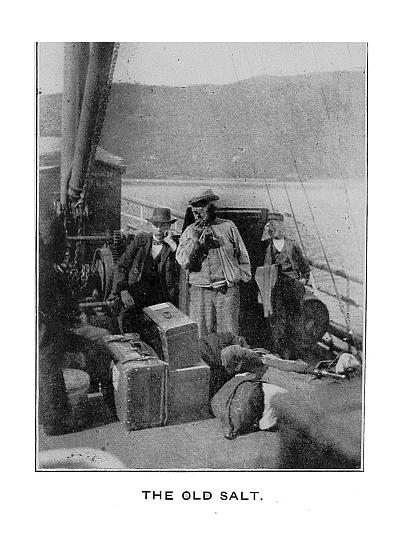
THE OLD SALT.
With the Captain himself, I became well acquainted; an alert man of affairs, who had knocked about the world on Norwegian ships and visited the greater ports of the United States. He gave me an interesting account of Norse feeling at the time of the outbreak of the Spanish war, saying to me, “I am from Bergen. I am a sailor like the rest of our people, and with about a thousand more of my fellow countrymen I went over at that time to New York. I was boatswain on the warship—and I served through the Spanish war. When we heard that there was likely to be trouble and got a hint that you wanted seamen, I gathered the men together and we went over and enlisted and others followed. Yes, there were several thousands of us, altogether, on your American warships, ready to give up our lives for the great Republic. Next to Norway, your great, free country, where already live half of the Norwegian race, lies closest to our hearts. We were ready to give up our lives for the stars and stripes. When the war was over most of us came back again. In the summer time I am captain of this boat, in the winter seasons I go out upon the sea. If America ever needs[Pg 54] us again we are ready to help her. We Norwegians will fight for America whenever she calls.”
Then he spoke of Norway and the growing irritation of the Norwegian people against the assumptions of Sweden. “It is true that the Swedes are our kin, but we have never liked them. The Norwegians are democrats. We have manhood suffrage, and each man is equal before the law. In Sweden, there is a nobility who are privileged, and while the Swedish people submit to the aristocrats running the Government over there, we Norwegians will never permit them to run us. If it were not for fear of Russia, we would fall apart, but the Russian bear is hungry. If he dared he would eat us up. If it were not for England he would devour Sweden now, and then there would be no hope for Norway. The Russian Czar wants our harbors, our great fjords, as havens for his fleets, and he would like to fill his ships with Norwegian seamen. So we fret and growl at Sweden, but we can’t afford really to have trouble with her any more than she can afford to fall out with us. We must stand together if we are to maintain our national independence, but nevertheless, we are full of fear for the future. I am apprehensive that the bear will some day satisfy his hunger. France will hold down Germany, who just now claims to be our friend also. England will be bought off by Russian promises in some other quarter of the world, and then, we shall be at the mercy of the Czar. God help us when that day comes! Those of us who can will fly to America, all except those who [Pg 55]die upon these mountains. The Russians may finally take Norway, but it will then be a devastated and depeopled land. America is our foster mother. Our young men go to her. We are always ready to fight for her!”
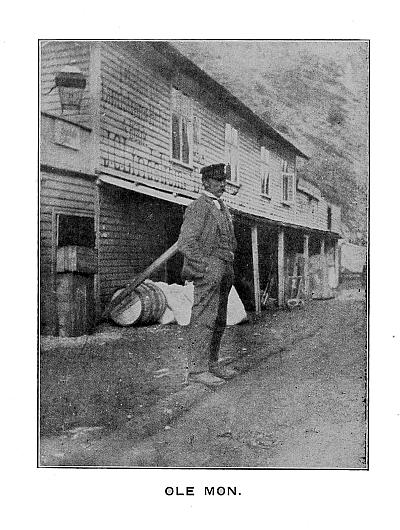
OLE MON.
As I looked into his strong blue eyes, which gazed straight at me, I felt that the man meant everything he said, and was expressing not alone his personal sentiment, but also the feeling of the sturdy, seafaring people of whom he was so fit a type, and I wondered what the Spaniard would have thought if he had known when he sent his fleets across the sea—fleets deserted by the Scotch engineers who, in times of peace, had kept their engines clean—that the United States could call at need, not merely upon its own immense population, but might equally rely upon the greatest seafaring folk of all the world to fill her fighting ships.
After three and a half hours’ sail—about thirty miles—we came to the end of the fjord at Odnaes, where was awaiting us a true Norwegian carriage, a sort of landau or trille with two bob-maned Norwegian ponies, in curious harness with collar and hames thrusting high above the neck. We had dined on the boat; we had only a valise, a hand-bag and our sea-rugs. We were soon in the carriage and began our first day’s drive, a journey of fifty-four kilometers (thirty-two miles), before night.
Our driver was presented to us as “Ole Mon;” and the English-speaking owner of the carriage informed[Pg 56] us that Ole (“Olie”) Mon spoke fluently our tongue. He was a sturdily built, rosy-cheeked, blue-eyed man some forty years of age with a gray moustache and smooth, weather-beaten face. He drove these tourists’ carriages in summer, he said; in the winter he took to the sea. We soon discovered his English to be limited to a few simple phrases, while when he ran to the end of his vocabulary he never hesitated to put in a fit Norwegian word. He was proud of his acquaintance with the foreign tongue, and delighted to exercise his knowledge of it. His chief concern in life was to take care of the ponies. He continually talked to them as though they were his boys, and at any excuse for a stop, always had nosebags filled with oat meal ready to slip on and give them a lunch. The ponies are not over eight or ten hands high, but are powerfully muscled, and they are as sleek and tame as kittens. We believe that we have a treasure in Ole Mon, and I expect to learn much from him about the country we traverse, for he is glib to talk.
The road was superb, the scenery magnificent. We followed a deep fertile valley, along a roaring river, the Etna Elv—recent rains having filled the streams brim full—with high fir-clad mountains rising sheer on either hand. We climbed gradually for quite twenty miles, meeting and passing many curious two-wheeled carts, drawn by a single horse, called stolkjaerres, in which the driver sits behind the passenger, and about four o’clock we halted at Tomlevolden, a rambling farmstead where Ole Mon put the nosebags[Pg 57] on the ponies and we rested until the bags were emptied.
Here, we visited a dairy cow barn,—a large airy building finished in planed lumber, with long rows of stalls where the cows face each other, standing on raised floors and with a wide middle aisle where the feeders pass down between. So scrupulously clean was it that each day it must be washed out and scrubbed. In one end stood a big stone furnace, a sort of oven, to keep the cattle warm through the dark cold winter time, and fresh spring water was piped to a little trough set at each stall.
Some years ago, having spent the night at a West Virginia mountain farm, in middle winter, I looked out of the window in the morning and beheld the family cow with about a foot of snow piled on her back and belly-deep in an icy drift. I remarked, “It has snowed some in the night.” Mine host replied that “he reckoned it had.” And then talking of the snow, I told him that I had seen snow eight feet deep way up in Canada. He looked at me incredulously and inquired, “Say, what mought the cows do in such snow as that.” Would that I might show him and his like this Norwegian cow barn!
Then we went on till 7 p. m., when we reached the famous Sanatorium of Tonsaasen, almost at the summit of the long grade, a spacious wooden hotel overlooking a profound dal, down which plunges a cascade.
The hotel is kept by a big, bustling woman who speaks perfect cockney English, and who tells us she[Pg 58] has “lived in Lonnon, although a native Norwegian.” She wears a large white apron and a white lace cap, and she has received H in most motherly fashion. Indeed, our coming has greatly piqued her curiosity. She has asked us many questions and has taken H aside and inquired confidentially whether I am not a deserting soldier, and whether she is not eloping with me! She is evidently alert for military scandal, and was sorely disappointed and half incredulous when H declared that she and I were really man and wife. The truth is, Norway is become the retreat for so many runaway couples, recreant husbands and truant wives, that the good people of these caravansaries are quite ready to add you to the list of shady episodes. Even when I boldly wrote several postal cards to America and handed them to mine hostess to mail, I felt sure that after she had carefully read them she would scarcely yet believe our tale.
Here we were given a bounteous supper of eggs, coffee, milk, cream, chicken, hare, trout, five sorts of cheese, and big hot rolls, and all for thirty-five cents each. The ponies were also fed again, and at eight o’clock we moved on twelve miles further, crossing the divide and rolling down into the valley of the Baegna Elv in the long twilight, and then brilliant starlight, coming at last to a typical Norwegian inn, at Frydenlund, not far from the lovely Aurdals Vand. This is the main road in winter between Bergen and Kristiania, and is then more traveled by sleighs and sledges than even now by carriages. All along the way there [Pg 59]are frequent inns and post-houses. To-morrow we start at eight o’clock, and go on sixty-one miles more.
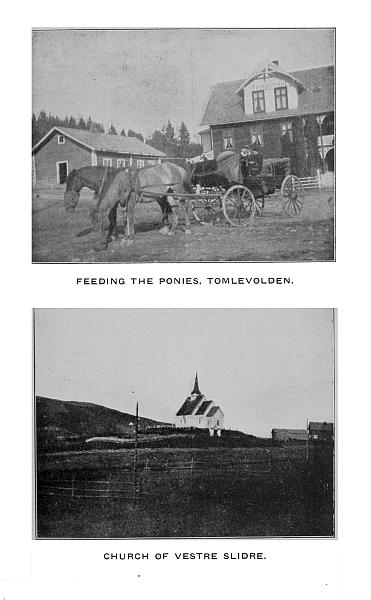
FEEDING THE PONIES, TOMLEVOLDEN.
&
CHURCH OF VESTRE SLIDRE.
Our inn is a roomy farmhouse where “entertainment is kept,” even as it used to be along the stage-traversed turnpikes of old Virginia, and adjoining it are extensive barns and stables. There seemed to be many travelers staying the night. We are really at an important point, for here two state highways separate, the one over which we have come leading to Odnaes, and the other diverging southward toward Lake Spirillen and the country known as the Valders, continuing on straight through to Kristiania. The house is painted white, and has about it an air quite like a farmstead in New England or New York. We were expected when we arrived. Word of our coming had been telephoned from Tonsaasen, and also from Kristiania. A large bedroom on the second story is given us. The floor is painted yellow and strips of rag carpet are laid beside the narrow bedsteads, where we sleep under eider down. I am writing by the light of a home-made candle. It is late, the silence of the night is unbroken save by the ticking of the tall clock on the staircase landing outside my door, and the occasional neighing of a horse or lowing of a cow. It is the silence of the contented country-side.
Skogstad, Norway, September 2, 1902.
Here we are eighty-four kilometers (sixty-one miles) from Frydenlund, where we spent last night. All day we have sat in an easy carriage, inhaled the glorious buoyant air, and driven over a superb macadamized road. We have skirted the shores of five lakes or vands—called fjords,—amidst towering snow-marked mountains, passing beneath cliffs rising sheer above us for thousands of feet, the highway sometimes a mere gallery cut into the solid rock, and we are now wondering how we were ever such simple things as to waste our time in tame England, or even linger among what now seem so commonplace, Scottish lochs and tarns. We have traversed the shores of the Aurdal, the Stranda, the Granheim, the Slidre and the Vangsmjoesen Fjords, each and all pools of the foaming river Baegna; and have looked across their limpid waters, their clustered islets, their shimmering surfaces reflecting field and forest and fjeld, and even portraying as in a mirror the snow-fields of mountain heights so far distant as to be indistinguishable to the naked eye, distant yet two full days’ [Pg 61]journey to the west. We have been continually excited and astonished as each succeeding vista of vale and lake and mountain has burst upon us.
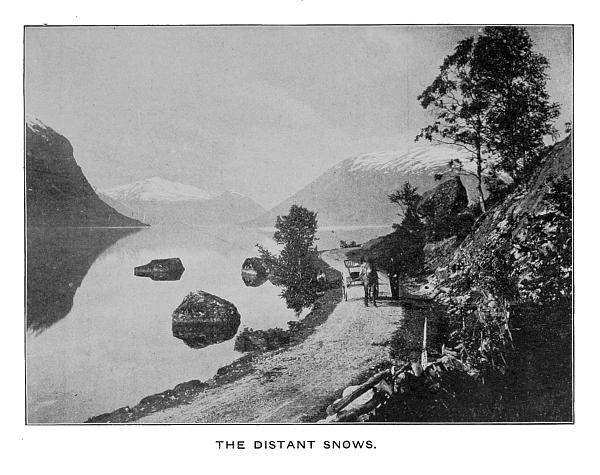
THE DISTANT SNOWS.
As we advanced further and further along the wide white military road, the valley of the Baegna Elv grew narrower and deeper, and the contrasts of verdant meadow and dark mountain increased in sharpness. The lower slopes are as green and well watered as those of Switzerland, and are dotted with farmsteads where the thrifty Norse farmer dwells upon his own land, independent, self-respecting, recognizing no lord but God—for the title of the “Swedish King” weighs but little here. Everywhere have I remarked a trim neatness, exceeding, if it were possible, even that of Holland. Upon the meadows were cattle, mostly red. The fields were ripe with rye and oats and barley where men and women were garnering the crops. The lands were cleared far up the mountain sides to where the forests of dark green fir stretched further up, until beyond the timber-line bare black rock masses played hide and seek among the clouds.
Back and beyond this splendid panorama of vale and lake and cloud-wrapped summit, far beyond it, binding the horizon on the west, there grew upon our vision all the afternoon enormous heights of stern and austere mountains, lifting themselves into the very zenith, their slopes gleaming with white bands of snow, their topmost clefts nursing glittering icepacks and glaciers. Ole Mon has constantly pointed[Pg 62] toward them saying “Yotunheim!” “Yotunheim!” and we have known them to be the gigantic ice-bound highlands of the celebrated Jotunheim Alps, the loftiest snow mountains of Norway.
We left the inn at Frydenlund after a breakfast of brook trout, fried to a turn, and all we could eat of them, delicious milk like that from our blue grass counties of Greenbrier and Monroe, in West Virginia, and coffee made as only an Americanized Norwegian may know how.
Along the way we have met children evidently going to and returning from their schools, and it has been charming to see how the little boys pull off their caps, and the little girls drop down in a courtesy. The little caps always come off the yellow heads with sweeping bow, and the duck of the little girls is always accompanied by a smile of greeting. I regret that in America we have lost these pretty customs which were once taught as good manners by our forebears.
We have passed this morning a frowning stone jail, the prison of this province, and Ole Mon tells us that it is quite empty and has had no tenant for some two years; surely, convincing testimony of the innate honesty of these sturdy folk.
We have also to-day met many young men, tall and stalwart, clad in the dark blue uniform of the Norwegian National Guard. This is the season when the [Pg 63]annual drills are going on, just at the end of the harvest time. Norway, like the rest of Europe, has adopted universal military training for her men. They are taught the art of war and how to shoot. It is calculated that in eight or ten years more every Norwegian of voting age will have had the necessary military training and will have become a part of the effective national defense. “We will never have trouble with Sweden,” they say, “the Swedes and ourselves only show our teeth.” “It is Russia, hungry Russia, that we fear. We will learn to march and shoot and dig entrenchments so that we may defend ourselves against the aggression of the Slav. Upon the sea, we are the masters. We learn in your navy how to handle modern warships and shoot the giant guns. Upon these mountains, we hope, ere another decade has elapsed, also to be safe against the encroachment of that ‘Great White peril.’”
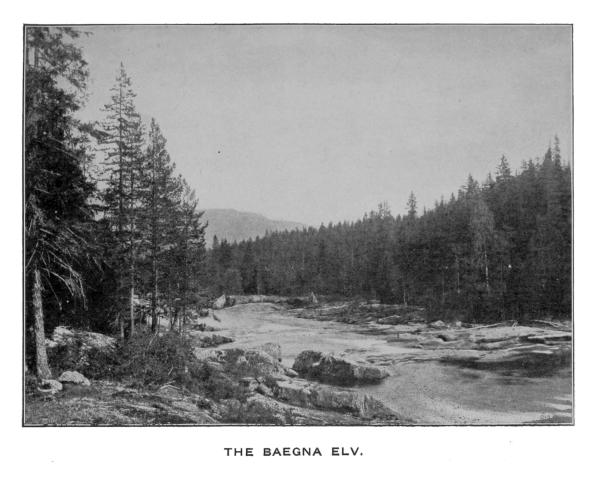
THE BAEGNA ELV.

A HERD OF COWS, FOSHEIM.
&
THE GRANHEIMS VAND.
We stopped for our first pony-feed at Fagernaes, where a road turns off to Lake Bygdin and its Elv, where the English go to fish; halted a half hour at Fosheim, where is a fine hotel, and then, passing the ancient stone church of Vestre Slidre, drove on to Loeken, where a reindeer-steak-and-salmon-trout-dinner awaited us. The inn, situated on a rocky point overlooking the picturesque Slidre Vand, was quakerly-clean, as all of these places are. The neatly dressed young woman who waited on us had lived two years in Dakota, and in Spokane, and spoke perfect United States. She had an uncle and a brother still[Pg 64] there, and hoped to go back herself when the old folks had passed away. At Oeilo, fifteen kilometers further on, we also drew rein—each time we stop the ponies have the nosebags of oat meal—and then we paused again at Grindaheim at the Vang Hotel, close to the shores of the Vangsmjoesen Vand. Here the mistress of the inn had lived in Minnesota, and talked with us like one of our own countrywomen. She had come home on a little visit, she said. A stalwart Norseman had lost his heart and won her hand, and saved-up dollars—but yet her spirit longed for free America. Her boys would go there as soon as they were big enough to hustle for themselves.
In the dining room of the comfortable house was gathered a collection of stuffed and mounted birds of the surrounding countryside. There were several ptarmigan and one fine capercailzie, the cousin to the black cock, and the biggest thing of the pheasant-kind that flies in Northern Europe.
Our Minnesotan hostess pressed us to stay and tarry a few days, setting before us a big pitcher of milk and little caraway-seed-flavored tea cakes, all for the price of Te Oere, two and a half cents. We would like to have lingered here, for the house is nestled in one of the wildest and loveliest of dales. To the north, a mile across the vand, tower the black precipitous heights of the giant Skodshorn (5,310 feet) upon whose cloud-capped peaks, Ole Mon tells us, the ghosts of the ancient Scalds and Vikings meet in berserker combat with Thor and Odin, and whence, [Pg 65]sometimes, when the air is still and there are no storms about, the clangs and clashes of their battle conflicts resound with thunder roars, waking the echoes in all the valleys round. Then the black mountain sides breathe forth gigantic jets of steamlike cloud, while it is at such times also that the Trolls and Gnomes creep forth from the shadows of the rocks to do honor to the warring giants. When questioned closely, he admitted he had never witnessed one of these combats, but declared that when a boy he had heard the roar on the summit of the mountain and had seen the white clouds shoot up, which is always the sign of victory for the gods. Our hostess also asserted that she had once heard the mountain roar, but admitted she had not seen the shooting clouds. Some scientists try to explain the mountain’s action according to natural laws, but so great is my faith in Ole Mon that I dare not dispute his word. Back of the little inn also rise the lofty masses of the Grinde Fjeld (5,620 feet) upon whose moorland summits it is, the capercailzie fly and the herds of reindeer range, whence came the juicy steaks we ate to-day at Loeken and have had to-night for supper.
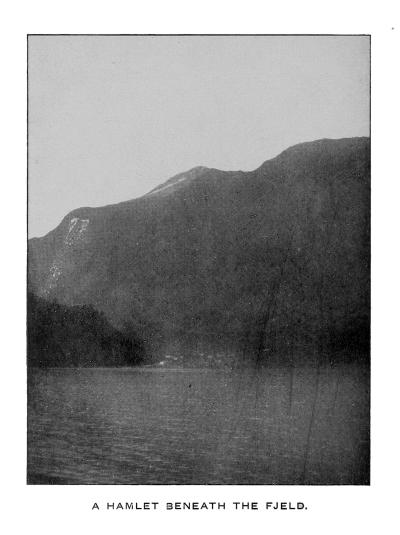
A HAMLET BENEATH THE FJELD.
All along the Baegna valley, including the fertile basins wherein nestle the many vands or lesser fjords, there were men and women in the fields mowing the short grass and ripening grain. But neither the grasses, nor the rye and oats and barley had reached maturity. Nor do they ever fully ripen in these cold latitudes. They must be cut green, and[Pg 66] then the feeble sunshine must be made the most of. Long ricks, made of sticks and saplings, or poles barred with cross-pieces set on at intervals are built extending through the fields, and on these the grass and grain are carefully spread out, hung on a handful at a time, so that each blade and straw may catch the sun, and dry out, a tedious, laborious work on which the women were more generally employed. The men bring up back-loads newly cut by scythe and sickle, and throw them down before the women, who then carefully hang each handful on the ricks. What must a Norwegian feel, trained to such painstaking toil as this, when he at first sets foot upon the boundless wheat lands of Minnesota and the prairie West. No wonder he returns to his native homestead only to make a hasty visit, never to remain. In Switzerland, I also saw the grass cut when scarcely half ripe and but a few inches high, when it is stored in handy little log cribs where in the course of time it slowly dries out, but here every blade must be hung up in the sun and air if it shall turn to hay. When the hay and grain is fully dried, it is taken down and done up into loosely bound sheaves, or carried in bulk to the large, roomy barns. The grain is generally thrashed out with flails, I am told, although a few American machines are now being introduced.
The wire fence is not yet come into Norway, although timber is remote and costly, and the people are hard put to it for fencing material. I noticed that they generally depend upon slim poles and small [Pg 67]saplings loosely strung together, for English hedges cannot be grown in these chilly northlands.
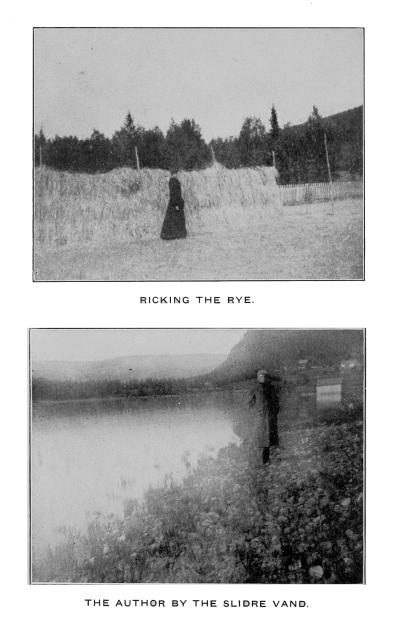
RICKING THE RYE.
&
THE AUTHOR BY THE SLIDRE VAND.
And now we are at Skogstad, above the Vangsmjoesen Vand and lesser Strande Vand, with two or more vands to see to-morrow before we cross the height of land and come down to Laerdalsoeren, on the Sogne Fjord which holds the waters of the sea, sixty-five miles further on. The vands to-day have been like giant steps, each emptying into the one below by the roaring river, mounting up, each smaller than the one below and more pent in by towering mountain masses.
H is now tucked in between mattress and coverlet of eider down—we are beyond the latitude of blankets—in a narrow bed, and I am about to get into another on the other side of the room, on which I now sit writing to you by the light of a sperm candle, while the murmur of a thousand cascades tinkles in my ears.
Laerdalsoeren, Norge, September 3, 1902.
We left Skogstad early and began to climb a long ascent, a dozen miles of grade, still following the valley of the Baegna Elv foaming and tossing by our side. The two days so far had been clear and cloudless, but now the air was full of a fine mist, and we probably ascended a thousand feet before the curtain lifted and a panorama of snow-capped mountains, profound valleys, and sheer precipices burst upon us.
A thousand rills and rivulets and brawling brooks streaked the green slopes with threads and lines of white; mosses and lichens softened the black rock-masses; blooming heather, and a plant with fine red and yellow leaf gave color to the heights between the sombre greenness of the fir forests below and the whiteness of the snow-fields above. I have never before seen such stupendous precipices, such tremendous heights; neither Switzerland nor Mexico, Alps nor Cordilleras lift themselves in so precipitous ascent.
After a two hours’ climb, all the way listening to the roar of the Elv choking the gorge a thousand feet [Pg 69]below our way, we met its waters issuing quietly from yet another lake, the little Utro Vand, surrounded by snow-crowned summits, the snow-fields creeping almost to the water’s edge, also passing on our right, the road which leads to the Tyin Vand and the ice-crowned summits of the Jotunheim. Here was a large and comfortable inn, Nystuen by name, and Ole Mon gave the ponies their first morning’s feed, adding an armful of mountain hay to the oatmeal diet. Half an hour’s rest is the usual limit, and the ponies seem to know their business and eat their fare on time. In Mexico, horses are fed grain but once in twenty-four hours, and that at midnight, so that all hearty food will be digested before the early morning start. Here a horse is kept full all the time to do his best; difference of climate and latitude, I suppose.
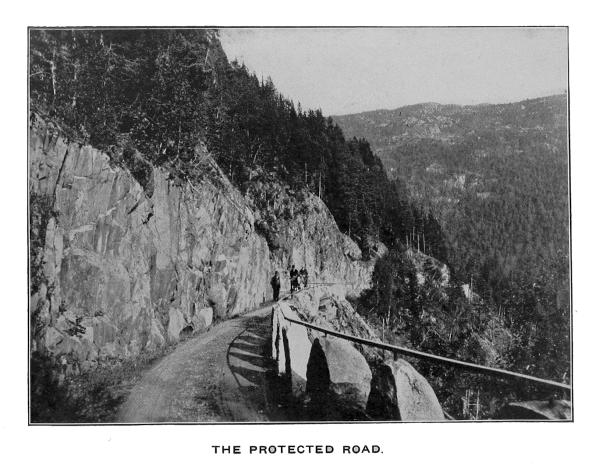
THE PROTECTED ROAD.
Just beyond the Nystuen Vand, we crossed the height of land between the waters of east and west Norway, and now the streams were running the other way. We were up 3,294 feet, and the summits round about us—rising yet two and three thousand feet higher—were deeply snow-marked—great patches and fields of snow. Then we came to another succession of four more vands, like steps, each bigger than the one above it, and a roaring river that proportionately grew in size. The road became steeper and we fairly scampered down to a fine inn, painted red with curiously-carven Norse ornamentation on the gables, called Maristuen. Here we had fresh salmon, and more good coffee. For breakfast we were[Pg 70] given trout and eggs, now salmon and a delicious custard for dessert. At table we met a Mr. C and wife, of Chicago, going over our trail, and we may meet them again in Stockholm. They are anxious to go on to Russia after seeing Stockholm, and have urged us to go along also. Across the table from us sat a dear old white-haired grandmother from Bergen with a blue-eyed, flaxen-haired granddaughter—a Viking Juno. They are driving across to Odnaes in their own carriage, a curious, old-fashioned trille, low and comfortable with a mighty top. The old lady is stacked up between pillows of eider down, and the blue-eyed granddaughter is full of tender care. We spake not to them nor they to us, but we smiled at one another and that made us friends. They both waved farvel as they drove away.
And then, about two o’clock, we went on again for forty miles down to the level of Laerdalsoeren and the sea, on the Sogne Fjord, where now we are. We were to descend some 3,000 feet, and here began one of the most exciting experiences of my life. The mountains kept their heights; we alone came lower, all down a single dal. Most of the road was hewn out of the side of precipices—a gallery; great stones were set endwise about two feet apart on the outer edge, and sometimes bound together by an iron rail; a slope down which we rolled at a flying trot, coasted down—the roaring, foaming river below, far below. Close to us were falls and cascades and cataracts, and the stupendous mountains, the snow-capped rock-masses lifting straight up thousands of feet. H grew so excited, exclaiming over the mighty vistas of rock and water and distant valley, that I had fairly to hold her in; and ever we rolled down and down and down, spanking along with never a pause for nearly thirty miles, the spinning wheels never once catching the ponies’ flying heels. Great driving that of Ole Mon, great speeding that of the sturdy ponies; marvelous macadamized roadway, smooth as New York’s Fifth Avenue! Water bursts, misty cascades, descending hundreds of feet, sprayed us, splashed us, dashed us, as we went on and on and on, only the gigantic precipices growing higher and higher and higher, and the ever-present snowy summits more and more supreme above us.
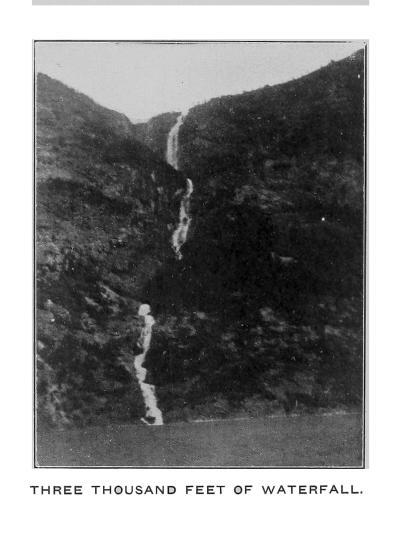
THREE THOUSAND FEET OF WATERFALL.
Then we swept out into a green valley, hemmed in on either hand by sombre precipices rising straight up for three and four and five thousand feet, and hove to at the farmstead of Kvamme for the ponies to be fed once more before their last descent. A mile or two further on the precipices choke together forming a deep gorge, called the Vindhelle, where it looks as though the mountains had been cracked apart.
The Norwegian farmer, like the Swiss, not only makes his living from
the warm bottom-lands, which he cultivates, but also from the colder
uplands to which his goats and cattle are driven in the early summer,
and where the surplus grasses are painstakingly gathered with the
sickle. We were driving quietly along when my attention was attracted
to a[Pg 71]
[Pg 72] couple of women standing with pitchforks in their hands near a
cock of hay. The hay was fresh mown, but I could see no hay-fields
round about. They were looking intently at the distant summit of the
precipice towering above them. My eye followed theirs. I could barely
make out a group of men shoving a mass of something over the edge, and
then I beheld the curious sight of a haymow flying through the air.
Nearer it came, and nearer until it landed at the women’s feet. I then
made out a wire line connecting a windlass set in the ground near
where the women stood and reaching up to the precipice’s verge, whence
came the hay. The hay was wound about this line. In this manner is the
hay crop of these distant uplands safely delivered at the little
gaard or farmstead in the valley’s lap. From these mountain
altitudes the milk and cheese and butter which the goats and cows
afford are also sometimes lowered by this telegraph. In Switzerland, I
have seen communications of this sort for shorter distances, but never
before beheld a stack of hay flying through the air for half a mile.
This Laera River with its dal (dale, valley), is famous for its trout and salmon. We passed several men and boys trying their luck, one, an Englishman, up to his waist in the ice-cold tide. We have now put up at a snug hotel, quite modern; English is spoken here. And—but I forgot; when we stopped to feed the ponies, right between the two descents, we made solemn friendship with the old Norseman who here[Pg 73] keeps the roadhouse; his daughter “had been in Chicago,” she spoke perfect United States, and took us to see, hard by, the most ancient church in Norway, the church of Borgund, eight hundred to one thousand years old. It is very quaint, with strange Norse carving and Runic inscriptions. I gave our pretty guide a kroner for her pains. On returning to the house, she handed it to the old man, who took out a big leathern wallet and put the coin away. We had meant it all for her, and by reason of her knowing Chicago had made the fee quite double size.
To-morrow we sail for six hours out upon the Sogne Fjord to Gutvangen, then drive by carriage to Eida, on the Hardanger Fjord, all yet among these stupendous mountains.
I was sitting in the little front room of the inn waiting for supper, when our driver, Ole Mon, came in to settle our account, for his trip was at an end. After I had paid him and added a few oeres and a kroner for trinkgeld, at the liberality of which he seemed to be much gratified, he produced from the inner pocket of his coat a goodly-sized blank book, which he handed to me, and begged that I would set down therein a recommendation of his qualities as a driver and a guide. In the book were already a number of brief statements in French and German and Norwegian, by different travelers, declaring him to be a “safe and reliable man,” who had “brought them to their journey’s end without mishap.” I took the book and wrote down some hurried lines. When I had finished, he gazed upon the foreign writing and then disappeared with the book into the kitchen to consult the cook, who had lived in Minneapolis. He presently reappeared, his eyes big with wonder and a manner of profound deference. He now advised me that he would deem it a great honor to be permitted to drive us free of charge, next morning, from the hotel to the steamer, a couple of miles distant. He further said, that he had decided to take the sea trip to Gutvangen on our ship and would there secure for us the best carriage and driver of the place. He evidently regarded me as some famous bard, to whom it would be difficult to do sufficient honor. The lines were these:
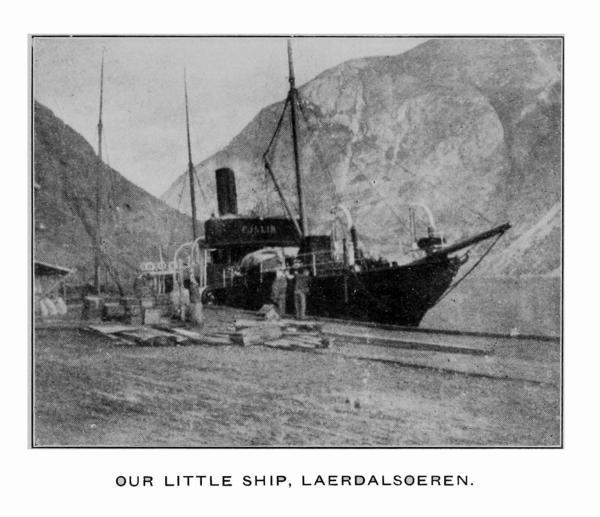
OUR LITTLE SHIP, LAERDALSOEREN.
Stalheim Hotel, Norway, September 4, 1902.
To-day we have spent mostly on the water. We left Laerdalsoeren—the mouth of the valley of the river Laera—by ship, a tiny ship, deep-hulled and built to brave the fiercest gales, a boat of eighty to one hundred tons. Casting off from the little pier at eight o’clock, we were upon the waters of the majestic Sogne Fjord until after 3 p. m. This great fjord is the first body of water that I have seen which to my mind is really a fjord, the others along the shores of which we have journeyed for the past three days, including the last and least, the Smidal and the Bruce Fjords, were only mountain tarns, what in Norse speech is termed a “Vand.” While I had read much of fjords, never till to-day have I comprehended their marvelous grandeur, the overwhelming magnitude of the earth’s convulsions which eons ago cracked open their tremendous depths and heights. Although their bottoms lie deeper than the bottom of the sea, (4,000 feet deep in some places), so the Captain tells me, yet up out of these profound waters rise the gigantic mountains (fjeld) five and six thousand feet into the blue sky, straight up as it were, with[Pg 76] hundreds of cascades and foaming waterfalls, sometimes the tempestuous tides of veritable rivers, leaping down the black rocks and splashing into space, and everywhere above them all are the snow-fields, the eternal snow-fields.
Sometimes when the precipices are sheltered and sun-warmed, their surface is green with mosses and banded with yellow gorse, and with white and pink and purple heather, and barred with scarlet and gray lichens. The waters were so deep, the precipices so sheer that often our ship sailed not more than twenty or thirty feet distant from them; the misty spray of the streams dissolving into impalpable dust hundreds of feet above us, dampening us like rain, or windblown, flying away in clouds of vaporous smoke.
Here and there along the more open parts of the fjord were bits of green slope with snug farmsteads, a fishing boat swinging to a tiny pier or tied to the very house itself. Sometimes, perched on a rocky shelf, grass-grown and high-up a thousand feet, we would discern a clinging cabin, and once we espied a grazing cow that seemed to be hanging in mid air. No patch of land lay anywhere about that was not dwelt upon, tilled or grazed by some man or beast. The climate of western Norway is mild and humid, tempered as it is by the Gulf Stream. These coasts have always been well peopled, sea and soil yielding abundant living to the hardy Norsk. The fjords are the public highways and upon their icefree waters vigorous little steamships ply back and [Pg 77]forth busied with incessant traffic through all the year. Our course led us up many winding arms and watery lanes to cozy hamlets nestled at the mouth of some verdant dal, where we would lie-to a few minutes to put off and take on passengers and freight. We also carried the mails. At each stopping-place the ship’s mate would hand out the bags to the waiting official, often an old man, more generally a rosy-cheeked young woman, and carefully take a written memorandum of receipt, when bag and maiden and many of the waiting crowd would disappear. Once or twice the bags were loaded upon one of the curious two-wheeled carts called stolkjaerres driven by a husky boy, when cart and horse and boy at once set off at lively gallop. In winter time sledges and men on skjis replace the handy stolkjaerre, and thus all through the year are the mails efficiently distributed. The captain tells me that a great proportion of the letters received and sent are from and to America, where so many of Norway’s most energetic and capable young men are growing rich, and that a large proportion of these letters received are registered, and contain cash or money orders remitted to the families at home. What wonder is it that these thousand white-winged missives, which continually cross the sea, have made and are now making the ancient Kingdom almost a Democratic state! At one of these hamlets, Aurland by name, I caught with my camera a pretty Norwegian lass in full native costume, such as has been worn from time immemorial[Pg 78] by the women of the Sogne Fjord,—a charming picture.
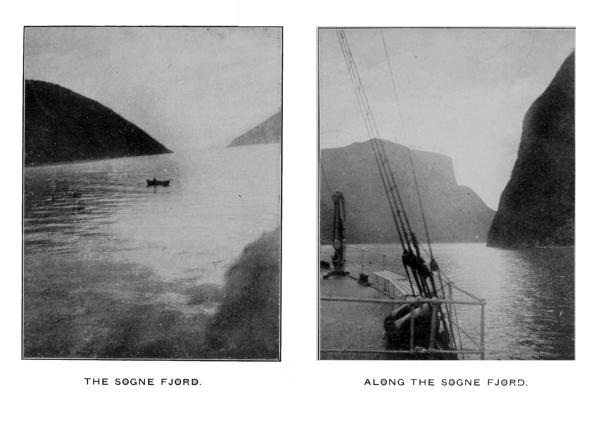
THE SOGNE FJORD.
&
ALONG THE SOGNE FJORD.
Toward three o’clock we sailed up a shadowy canyon, the Naeroe Fjord, under mighty overhanging precipices, arriving at Gudvangen, our voyage’s end. Here carriages awaited us and here Ole Mon, who has sailed with us throughout the day, after having driven us down to the boat himself and refused all pay, handed us over to the driver of the best vogn (wagon) of the lot, with evidently very particular instructions as to our welfare. In fact, H tells me, Ole Mon has spent the day with his book of recommendation open in his hand, calling the world’s attention to my glowing rhymes, and pointing me out with an air of profound deference as an illustrious, although to him unknown, bard. We bid him farvel, with real sorrow, and regretted that he might not have driven us to the very end.
We now went on ten kilometers through a narrow clove, between enormous heights, passing the Jordalsnut, towering above us, straight up more than three thousand feet, and straining our necks to peer up at the foaming torrent of the Kilefos leaping two thousand feet seemingly at a single bound, and almost wetting us with its flying spray. At one place the road is diverted, and the immense mountain is scarred from the very edge of the snows by the marring rifts of a recent avalanche, which, our driver says, was the most tremendous fall of snow and ice these parts have ever known. At last we began a steep zigzag ascent, [Pg 79]so sharp that even H relieved the ponies of her weight. We were an hour in climbing the twelve hundred feet; and found ourselves on a wide bench overlooking the wild and lovely Naeroedal up which we had come. The sun was behind us, the half shadows of approaching twilight were creeping out from each dell and crevice. Upon our left, the gray peak of the Jordalsnut yet caught the sunshine, as also did the snow-fields of the Kaldafjeld, almost as lofty upon our right. The Naeroedal was filling with the mysterious haziness of the northern eventime. Behind us, commanding this exquisite vista, we found a monstrous and uncouth edifice, a German enterprise, the Stalheim Hotel, thrust out upon a rocky platform between two rivers plunging down on either side. Here we have been given a modern bedroom, fitted with American-looking oak furniture, have enjoyed a well-cooked German supper, sat by a blazing wood fire, and shall soon turn off the electric lights and turn in, to repose on a wire mattress, and be lulled to sleep by the musical roar of the two great waterfalls.
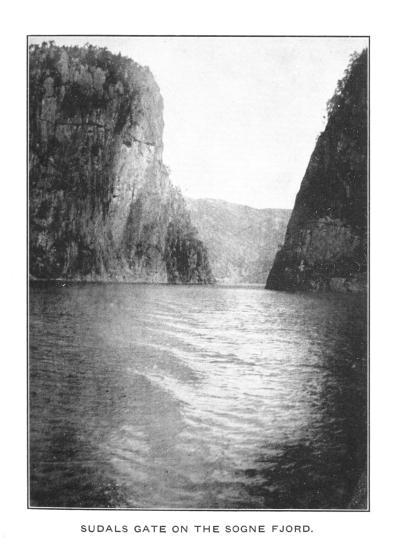
SUDALS GATE ON THE SOGNE FJORD.
Odda, Norway, September 5, 1902.
We left Stalheim by Skyd (carriage), at nine o’clock. The drive was up a desolate valley, through a scattering woodland of small firs and birches, close by the side of a foaming creek, the Naerodals Elv, hundreds of becks and brooklets bounding down the mountain sides to right and left.
After an hour’s climb, we reached a flattened summit where lay a little lake, the Opheims Vand, two or three miles long and wide, encircled with snow-fields. Here and there we passed a scattered farmstead—gaard—for every bit of land yielding any grass is here in the possession of an immemorial owner. The vand is a famed trout pool, and as we wound along its shores we passed any number of men and boys trying their luck. It was raining steadily, a cold fine downpour, and all the male population seemed to have taken to the rod.
At the lake’s far end we passed a small hotel, built in Norse style with carved and ornamented gables and painted a light green. Here in the season the English come to fish.
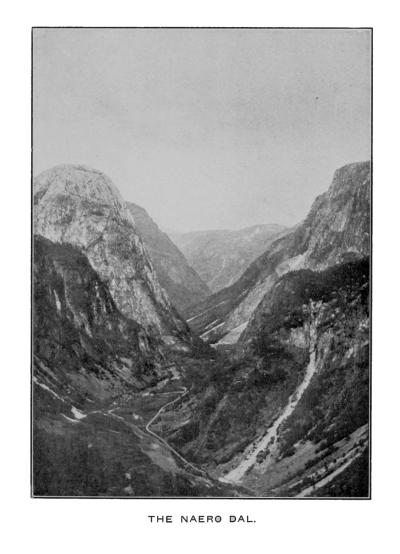
THE NAERO DAL.
Leaving the vand, we began a long descent, and for twelve miles rolled down at a spanking pace, the brook by our side steadily growing until it at last became a huge and violent torrent, a furious river, the Tvinde Elv. In the fourteen miles we had descended—coasted—two thousand five hundred (2,500) feet, and now were come to the little town of Voss or Vossvangen, which lies on the banks of the Vangs Vand, a body of blue water five or six miles long and two miles wide, surrounded by one of the most fertile, well-cultivated valleys of Norway.
Vossvangen is a town of importance, and is the terminus of the railway with which the Norwegian government is connecting Bergen and Kristiania. The easiest parts of this national railway, those between Bergen and Vossvangen, and between Kristiania and Roikenvik—over which we came—are already constructed and running trains, but it is estimated that it will be twenty years before the connecting link is finally completed, for it is almost a continuous tunnel—a magnificent piece of railroad-making when it is done.
Vossvangen is also the birthplace of one of Minnesota’s most
illustrious sons, United States Senator Knute Nelson. It is upon these
mountains that he tended the goats and cows when a barefooted urchin,
and I do not doubt that he has surreptitiously pulled many a fine
trout and salmon out of the lovely lake. The people of Vossvangen
accept his honors as partly[Pg 81]
[Pg 82] their own, and my Norwegian host gazed at
me most complacently when I told him that American Senators held in
their hands more power and were bigger men than any Swedish King.
Norwegians are justly proud of their eminent sons who, in the great
Republic over the sea, are so splendidly demonstrating the capability
of the Norse race.
We put up at a modern-looking inn, called Fleischer’s Hotel, a favorite rendezvous for the English, despite its German-sounding name. Here we rested a couple of hours, and were given a well-served dinner with tender mutton and baked potatoes, big and mealy, which we ate with a little salt and abundance of delicious cream. Our hearts were here stirred with sympathy for a most unhappy-looking American girl who had evidently married a foreign husband. He was a surly, ugly-mannered man, with low brows and tangled black hair. She, poor thing, was the picture of despair, her fate being that all too common one of the American woman who, foolishly dazzled with a titled lover, too late finds him to be a titled brute.
We were to continue to Eida on the Hardanger Fjord, in the same carriage in which we set out. The ponies were well rested, and we got away a little after two o’clock. Ascending the well-tilled valley of the Rundals Elv by easy grades over a fine hard road, we crossed a marshy divide and then descended to the Hardanger Fjord. After passing the divide and coming down a few miles, we suddenly found ourselves [Pg 83]on the rim of a vast amphitheatre into the center of which plunged a mighty waterfall, the Skjervefos, much resembling that of the Kaaterskill Falls, in the Catskill mountains of New York, only ten times as big. A roaring river here jumps sheer a thousand feet, and then again five hundred more. Yet we did not know of it until we were right on to it and into it. The falls making two great leaps, the road crosses the wild white waters between them on a wooden bridge. Over this we drove through soaking clouds of spray.

GREETING OUR BOAT, AURLAND.
When in London we had no thought of Norway. Not until we heard from General and Mrs. C of the delights of this journey did we make up our minds to take it. We were then in Copenhagen, and neither in that town nor in Kristiania have we been able to get hold of an English-worded guide book. We are trusting to our driver’s knowledge, and to our own eyes and wits. And so it is, that we came right upon one of the most splendid waterfalls in all Norway, and never knew aught of it until chasm and flood opened at our feet. Perhaps it is better so. We have no expectations, our eyes are perpetually strained for the next turn in the road, our ears are alert for the thundering of cascades, our minds are open for astonishment and delight.
While it is a substantial modern bridge that now takes you safely over the stream which spins and spumes between the upper and the nether falls, yet our driver tells us, that in the ancient days when men and beasts must ford or swim to get across, this[Pg 84] was dreaded as a most dangerous place. Few dared to ford,—most made a long detour. No matter how quiet or how low the waters might appear, there were yet dangers which men could not see, for water-demons hid in the black eddies and skulked in the foam. They lurked in silence until the traveler was midway the stream when they would boldly seize him by the feet, and draw him down, and ride his body exultingly through the plunging cataract below, nor did they fear also to drown what rescuer might venture in to save his friend. When now the moon is low and the night is still, may frequently be heard commingling with the leaping waters’ roar, ’tis said, the death wails of the lost souls of those whom the demons thus have drowned and delivered for torment to the cruel master-demon, Niki.
Below the giant Skjervefos we rolled alongside its Elv until we came out upon the margin of another exquisite tarn, the Gravens Vand, where, just as along the Vangsmjoesen Vand, the roadway is, much of it, hewn out in galleries at the base of overhanging cliffs. Nor is there room for carriages to pass. There are turnouts, here and there, and you pull a rope and ring a bell which warns ahead that you are coming. In some places the roadway was shored up with timbers above the profound black waters. We passed from the vand through a rocky glen down which the foaming waters hurried to the sea. We followed the stream and suddenly came out into vast breadth and distance. We were at Eida [Pg 85]on an arm of the mighty Hardanger Fjord, the biggest earth crack in Norway.
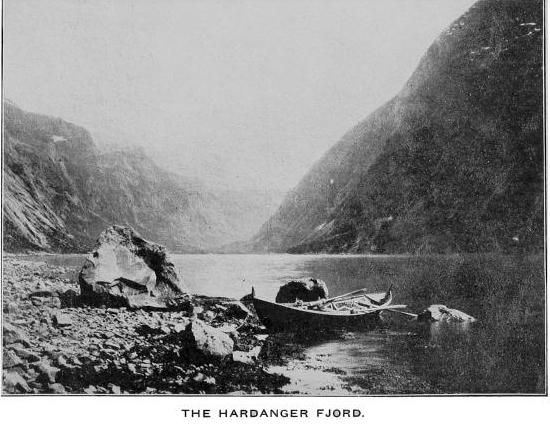
THE HARDANGER FJORD.
A fresh, keen wind blew up from the ocean. A wooden pier jutted out into the deep water, where, tied to it, were several fishing smacks. A small, black-hulled steamer was there taking on freight, but it was not our boat. The sky was overcast. The long twilight was coming to an end. It would soon be dark. Across the fjord, giant black-faced precipices lifted up into the clouds and snows. Down the fjord misty headlands loomed against the dusk. The black waters were foam capped. There was a dull moan to the wind in the offing; it was a night for a storm at sea. It now grew dark. A few fitful stars shone here and there. The wind was rising. A bright light suddenly appeared toward the west. Our boat had come round the headland, and was soon at the pier. It was much like the little ship in which we sailed upon the Sogne Fjord. These fjords are alive with multitudes of just such boats, deep-set, sturdy craft, built to brave all weathers and all seas. Our course lay down the Graven Fjord, through the Uten Fjord, and then up the long, narrow Soer Fjord—arms of the Hardanger—to the hamlet of Odda, where we would again take a carriage and cross the snow-fields of the giant Haukeli mountains of the Western Alps.
Watching the sullen waters, profound and mysterious, as they churned into a white wake behind our little craft, I could scarcely credit it that I was upon[Pg 86] the Hardanger Fjord, the greatest and most intricate of the sheltered harbors which for centuries have made the coasts of Norway the fisherman’s haven, the pirate’s home. Upon these waters the ancient Viking learned his amphibious trade. Hid in the coves which nestle everywhere along the bases of the precipices the Viking mothers hatched and reared their broods of sea-urchins, who romped with the seals and chased the mermaids and frolicked with the storms. Where I now sailed had met together again and again those fleets of war-boats, the like of which we saw the other day in Kristiania, and which went out to plunder and ravage hamlet and town and city along all the ocean coasts, even passing through the Gates of Hercules, and visiting Latin and Greek and African province with devastation and death. “Sea-wolves,” Tacitus called them, and such they were. Here gathered the hardy war-men who went out and conquered Gaul, and founded Norse rule in Normanwise where now is Normandy. Hence sailed forth the warships which harried the British Isles, and left Norse speech strong to this day on Scottish tongue and in Northumbrian mouth. Here, also, fitted out the ships, some of the crews of which it may have been who left their marks upon the New Jersey shores in Vineland, and who may even have been the sires of that strange blue-eyed, light-haired, unconquered race I saw two years ago in Yucatan, who have held the Spaniards these four centuries in check. I gazed upon the black waters of mighty [Pg 87]Hardanger, and saw the fleets returning with their spoil, and heard the shouts of vengeance wreaked and victory won, which have so often echoed among these mountains. I was looking upon the breeding, homing waters of the greatest sea-race the world has known, and every lapping wavelet became instinct with the mystery of the cruel, splendid past.
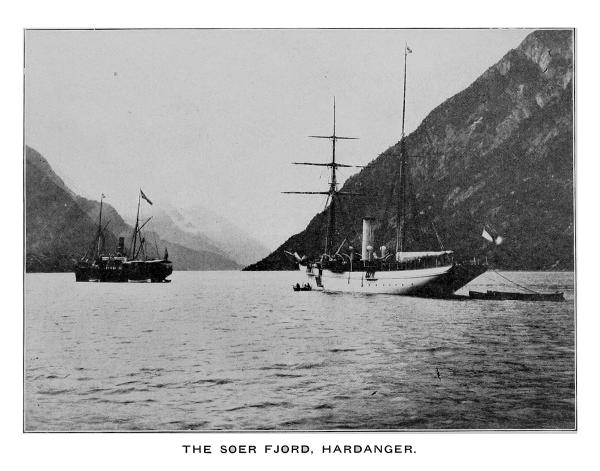
THE SOER FJORD, HARDANGER.
The churning of the propeller blades now ceased. I felt a jarring of the boat. We were come to Odda and the voyage’s end.
It was ten o’clock when we made our port. A black night it had been, pitch dark, with a fierce wind and ill-tempered sea. The profound waters respond with sullen restlessness to the stress of outer tempest. Only a Norseman born and bred to these tortuous channels could have safely navigated them on such a night, and I noticed that our engines did not once slacken speed throughout the voyage!
Upon arriving at our hotel we found we were expected. A comfortable room was in readiness, and a carriage engaged for the following day and early breakfast arranged. All this had been done through telephone by our Tourists’ Agency (the Bennetts) in Kristiania. And so have we found it everywhere along our route. All Norway, every post office and nearly every farm, and especially all hotels and inns, are connected by a telephone system owned and run by the Government. Anybody in Norway can call up and talk to anybody else. We have experienced the full benefit of this efficiency.
Our entire trip has been arranged by telephone from Kristiania. We are always expected. A delicious meal, ordered from Kristiania, is always ready for us, and every landlord knows to the minute just when we will arrive, for news of us has been ’phoned ahead from the last station we have passed.
This hamlet of Odda is an important point. Here converge the two great trade and tourist routes of Western Norway. The one, the Telemarken route, crossing the Haukeli Fjeld of the Western Alps to Dalen, and thence by the Telemarken lakes and locks to Skien, and by rail to Kristiania; the other diverging at Horre, passing down the valley of the Roldals Vand to Sand and thence to Staavanger by the sea, whence ships cross to Hamburg and Bremen and the North Sea ports, and to Hull and Harwich in Britain—favorite routes by which the Germans and British enter Norway.
Horre, Hotel Breifond, September 6, 1902.
To-day we have driven thirty miles from Odda, all of it up hill, except the last six miles. We started about nine o’clock with two horses, an easy carriage, and a driver whom I have had to resign to H’s more promising Danish, for he is elderly and very weak in the foreign tongue. From the first we began to climb. The driver in Norway always walks up the hills, and the male traveler also walks, while the female traveler is expected to walk, if she be able. The Norse ponies take their time, although at the end of the day they have traveled many miles and are seemingly little tired.
By the side of the smooth road rushed a river, the Aabo Elv, a mass of foam and spray which sometimes flew over us. A couple of miles farther on we came to a little dark-blue lake, the Sandven Vand, surrounded by lofty mountains, on the far side of which, almost jutting into it, pressed down the glacier of Buarbrae, descending from the snow-fields of the Folgefonden, a single expanse of ice and snow some[Pg 90] forty miles long and ten to twenty wide, the greatest accumulation of snow and ice in western Norway. Over the precipices hemming in the vand dashed scores of cataracts and cascades, often leaping two and three thousand feet in sudden plunge. H says nobody can ever show her a waterfall again, nor talk about English Waters or Scottish Lochs.
Passing the lake, we continued to ascend, the road entering a deep and sombre gorge, which suddenly widened out into a sunlit vale, the air being filled with mists and rainbows. We were nearing the Lotefos and the Skarsfos, two of Norway’s most celebrated cataracts. Two rivers begin falling almost a mile apart, approaching as they fall, until they unite in a final leap of nearly fifteen hundred feet, a splendid spectacle, while right opposite to them tumbles the Espelandsfos, falling from similar heights. The spray and mist of the three commingle in a common cloud, and the highway passes through the eternal shower bath. As you look up you can see the entire mass of the waters from their first spring into space throughout their tumultuous, furious descent, until they eddy at your feet. Nature is so lavish here with her gigantic earth and water masses that one is perpetually awe-struck.
One incident has occurred today, which I presume I may take as a high compliment to my native tongue. One of two young Frenchmen, whose carriage has traveled near our own, while walking ahead of his vehicle, found the ponies disposed to walk him down. [Pg 91]Twice this happened. Then he waxed wroth. He suspected the tow-headed Norse driver of not being really asleep, but of trying to even up the ancient national grudge against his own dear France. He flew into a Gallic passion. He stopped short. He halted the team. He awoke the driver. He shouted in broken English, “You drive me down! You drive me down! You vone scoundrel! I say vone damn to you, I say vone damn, I say vone damn!”—shaking his fist in the astonished face of the sleepy-head. After that the Norseman kept awake and the French gentleman walked safely in the middle of the road. He evidently felt that to swear in French would be quite lost upon the son of the Vikings. English alone would do the job.
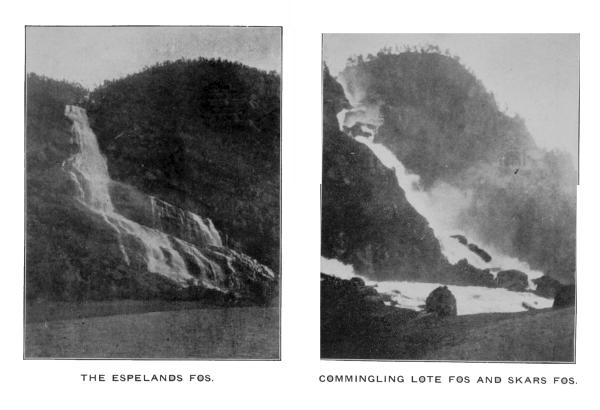
THE ESPELANDS FOS.
&
COMMINGLING LOTE FOS AND SKARS FOS.
We climbed for many miles a deep glen called the Seljestad Juvet; and dined long past the hour of noon at a wayside inn, the Seljestad Hotel. The hotel was kept by women. “Our men,” they said, “are gathering hay at the Saeter (mountain farm) far up on the mountain highlands. They are gone for a month, and will not return until the crop is all got in.” We paid our modest reckoning to a delicate, fair-haired, blue-eyed little woman, with quiet, graceful manners, well bred and courteous in bearing. She is the bookkeeper and business manager of the inn, “so long as the summer season lasts,” she said. And then she sails to England in one of her father’s ships, and there becomes a governess in an English family until another summer holiday shall come around. She had[Pg 92] never been to America. “Some day,” her skipper sire had “promised to take her to New York,” when they would “run over for a day” to Minneapolis to see an aunt and cousins who were prospering, as do all Norwegians in America’s opportunity-affording air. And “Americans, she always liked to meet,” she said, “for unlike the English, they met you so frankly and did not condescend.” She showed H all through the neat and tidy kitchen, while a big black nanny goat stood in the doorway and watched them both.
All the afternoon we kept on climbing by the winding roadway, passing a black-watered, snow-fed tarn, the Gors Vand, and over the Gorssvingane pass above the snow line, where snow-fields stretched below us, around us, above us. From the summit of 3,392 feet above Odda and the sea, we had a superb view of all the vast Folgefond ice-field behind us, and before us two others, the Breifond and the Haukeli Fjeld, as vast, while 2,000 feet right down beneath us lay a deep blue lake, the Roldals Vand.
The road now wound ten kilometers (six and one-third miles) down into the deep valley by many successive loops, twelve of them, one-half a mile to the loop—a feat of fine engineering, for this is a military road. We came down on a full trot all the way, even as Ole Mon came down the Laera Dal, until we reined in at a picturesque inn at the vale of Horre, overlooking the valley of Roldal and its vand. Now we are in a cozy hostelry, the Hotel Breifond, with a room [Pg 93]looking out over the exquisite deep-blue lake, encompassed by green mountains and snow-covered summits.
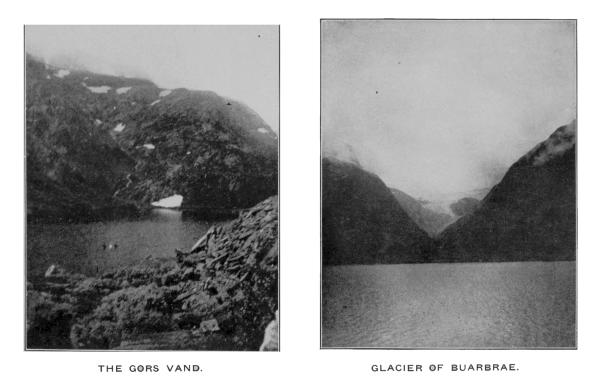
THE GORS VAND.
&
GLACIER OF BUARBRAE.
Our hotel is kept by two sweet-faced elderly women, serene and rosy-cheeked, dressed in black with immaculate white caps; one is the widow of a daring seaman who years ago went down with his ship in a winter gale. He was the captain and would not leave his post, though many of the crew deserted and were saved. The other is her spinster sister, whose betrothed lover likewise was lost at sea. In the summer time they here harbor many anglers, who come to fish the waters of the Roldals Vand and adjacent streams, which like most Norwegian lakes and rivers are rented out by the local provincial or district governments. The visitors who come here are chiefly English, the ladies tell us, and great is their distress and often violent their objurgation at the absence of any darkness when they may sleep. They cannot adjust themselves to the nightless days. They are inexpressibly shocked when they find themselves playing a game of golf or tennis at midnight, or forgetful of the flight of time in the excitement of a salmon chase, pausing to eat a midday snack at 2 a. m.
Our beds are the softest we have yet slept in, for both mattress and coverlet are of eider down. The two ladies have been delighted to talk with H in the native tongue, and have told her of their nephews and cousins who are getting rich owning fine wheat farms in the Red River of the North. “Come back to us in June,” they say. “Our wild flowers are then in[Pg 94] bloom, and the hungry trout and salmon will then rise to any fly!” And H and I resolve that in June we surely will return.
I saw one or two small pale butterflies to-day, and one gray moth at the snow edge, where we crossed the divide; the only ones I yet have seen. The birds, in this northland, of course, are all new to me; the crows are gray, with black wings, heads and tails; a magpie with white shoulders and white on head, and long, blue-black tail, is very tame; while a bird I take to be a jay is numerous, with black body, white shoulders and wing tips, and tail feathers edged with white. I have seen some gray swallows which are now gathering in flocks preparatory to going south, and several sparrows much like our field sparrows; and sandpipers and upland plover, very small. The gray crows have a coarse croak like a raven, “Krakers” they are called. In England we saw and heard our only lark the day we drove from Ventnor to Cowes, on the Isle of Wight, but I heard no other song birds in England, only once, near Oxford, when I caught a note like our song sparrow’s, while crows and rooks swarmed everywhere from Southampton to Inverness. In Denmark there are many storks, and I there saw the nest of one, a gigantic mass of sticks and mud, built on the ridge of a barn, but I noticed few other birds, except the gulls and terns along the sea. At Vang, the other day, I saw, as I wrote you, the ptarmigan, and the capercailzie stuffed and [Pg 95]mounted by a Norwegian living there; they are found on the mountains thereabouts; and a passenger, day before yesterday, on the Sogne-fjord-boat, had in his hand half a dozen ptarmigan, with their plumage already turning toward the winter’s white.

THE DESCENDING ROAD TO HORRE.
Hotel Haukelid, September 17, 1902.
This morning we left Hotel Breifond about eight o’clock and although we started alone, three other carriages soon caught up with us, and we set off together, ours being the first in the line. As it is the etiquette of the drivers never to pass each other, we have kept this order all the day. Next behind us was a Dane with his Norwegian wife, from Bergen, to whom H talked in their own tongue. Next to them were the two young Frenchmen with whom I have managed to converse, and behind these rode a German and his frau, who were most icy until they learned we were not English but Americans, whereupon they grew friendly indeed. We have got well acquainted while walking together up the long mountain slopes.
Yesterday we crossed the divide at a maximum elevation of 3,392 feet, and were above the snow line; to-day we again traversed the snow-fields at a yet higher altitude, passing under one snow mass by a tunnel, where H took a snap-shot of me standing in [Pg 97]the snow, and reached the maximum altitude of 3,500 feet.
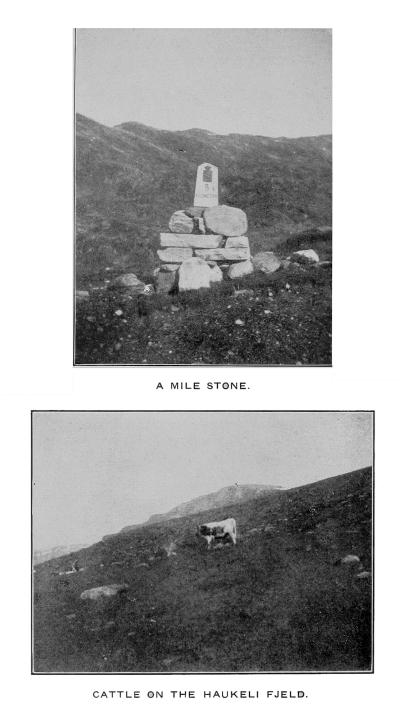
A MILE STONE.
&
CATTLE ON THE HAUKELI FJELD.
From the emerald valley of the Roldals Vand we crept up a long ascent for twenty miles, and I walked the whole of it. We followed the foaming Vasdals Elv to its source, until all trees were below us, and only short grasses, mosses and lichens grew amid the masses of drear, black rock, and wide fields and patches of snow. This was the most desolate region I have ever yet beheld or set foot upon; no life of any sort; “aucuns animaux, aucuns oiseaux; seulement les roches, le silence et le froid,” as one of the young Frenchmen exclaimed! There was not even a gnat or a butterfly. The primordial adamant rock presented as sharp and unworn edges to the blows of the icy torrents as when God first made it. The sun was warm and all the streams brim full, swollen from the melting snows. High on the height of land we found two silent lakes, the Ulivaa Vand and the Staa Vand. No life stirred about them, although our driver asserted they were “alive with fish.”
On these silent heights with their mosses and lichens, goats and reindeer thrive, and the latter range throughout the year.
We dined near the summit at a neat log inn called Haukeli-Saeter upon a soup, boiled salmon, reindeer steak and vegetables,—all good. Here our Germans clamored for sauerkraut and bier, and were much perturbed at receiving instead schooners of sweet milk[Pg 98] and caraway-seeded tea-cakes. The inn is built in typical Norse style, with sharp and elaborately carved gables, and is kept open chiefly for the benefit of tourist travel.
Our driver is a quaint and lackadaisical old Norsk, who speaks a drawling, ancient Roldal patois. The first day we could not do much with him, although H tried her best Danish. But to-day he is beginning to thaw out and has at last become really garrulous. He is full of peasant superstition and folk lore which he implicitly believes. These Haukeli Fjelde will never be inhabited by man, he says, for they are already the home of the giant and dangerous Trolls, mysterious and mighty spirits who are inimical to man. They dwell on the barest and bleakest and most desolate mountain tops, where they devour young kids and reindeer fawns and, occasionally, even dare to kidnap a child, and are always on the watch to steal a buxom lass. It is useless to chase or follow them, they are never to be caught, and while they may show themselves at times if they shall choose, yet they are invisible to most human eyes. He has never seen a Troll, he says, but once he knew an old man who had been scared by one which tried to catch him when a boy.
There are also witches upon the Haukeli mountain tops, the old man says. He is sure he has heard them hurtling through the air, sometimes, when driving alone in the dusk of midsummer nights, crossing the desolate heights of the Haukeli Fjeld. I asked [Pg 99]him if they still rode on broomsticks as they used to do in Germany, but he declared that they were more bloodthirsty than that, for they always carried ancient Viking broadswords, which they had picked up after some of the big fights which take place before breakfast in Valhalla every morning among the Vikings. Every summer some few witches are sure to be seen or at any rate heard, by some lonely peasant caught by fatigue on a twilight mountain top. There is one more beautiful than all the rest, he says. He calls her “Hulda,” and says she is a great hand to seduce and beguile young men. She can fix herself up to appear very beautiful, and to look upon her is to fall fast in love with her. Then she taps a rock with a long staff she carries and lo! it opens and there within are splendid chambers, a fairy palace, with all the allurements of golden furnishings and sumptuous hangings and a table groaning under the weight of delicious things to eat. If, dazzled by this glimpse of paradise, the youth once enters and is taken in her arms and kissed by her, then it is all up with him. He never escapes, but after she has toyed with him to her heart’s content in idle dalliance, and grown tired of him, then are his blackened bones cast forth upon some barren mountain top, perhaps to be found long years afterward by wandering goatherd or venturesome hunter. Between these Trolls and the witches, H has acquired a most wholesome fear of the Haukeli Fjeld, and she vows she would never drive over it alone.
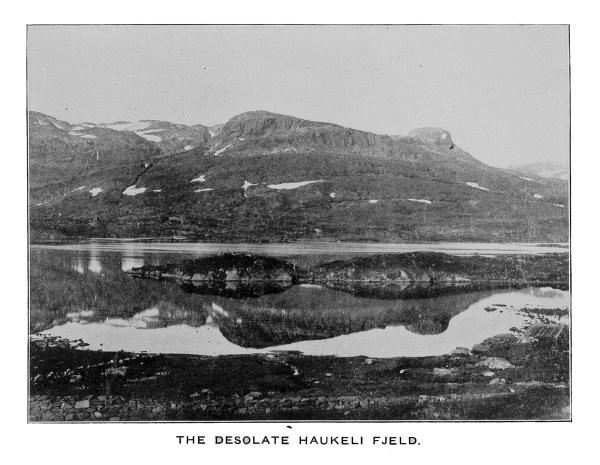
THE DESOLATE HAUKELI FJELD.
Also, the old man has at first hinted at and then confided to us that the Trolls and witches are not indeed the so serious menace they might seem, for they are really afraid of man and keep generally well out of his way; but that the real vexation of life comes from the little pixies and sprites, who love to live handily about your house, and who are always making trouble, either out of a spirit of pure mischief, or else by reason of jealousy or pique. They are “very touchy,” he says, and you never know when or how you may offend them. But if you do, then woe betide you. They will steal the feed out of your horse’s trough, or from his very nosebag right before your eyes, and so deft are they at their tricks that you can never catch them. You only discover that your horse gets thinner and thinner until he finally dies, while if they shall be pleased with what you have done or said you will find the horses always sleek and fat and able to do two days’ work in one. I asked him how he stood in with the pixies just now, for I thought his team looked rather poor, but he said that was by reason of the hard summer’s work, the pixies having done him no ill for several years. They also delight to milk the goats and cows upon the sly, he said, and will steal the cheese set out to dry, and often play such havoc with household supplies as to drive the peasants to despair. For this reason it is, that many good farmers set out little bowls of milk and bits of cheese in some silent meadow or mountain dell, where the pixies may eat quite undisturbed.
As if to emphasize the old man’s words, we just then passed the hut of a woman goatherd almost upon the summit of the vast lonely Haukeli Fjeld and there, set upon a little shelf, high up near the moss-grown roof, were a small milk-bowl and a bit of brown cheese, an offering to the elves and pixies of that place.
The information I here give you may be wrong in minor detail, for we could not always perfectly interpret the quaint and ancient dialect in which the facts were told, but H says she could make out the most of what the old man said; for after all Danish and Norse speech are very nearly the same.
We were now well over the height of land and were coasting down toward prospective supper. The barren waste of black and gray rocks, across which we had traveled, began to give place to greener slopes; the mosses had returned; the grass was peeping up again. Swinging around a well-graded curve, we dropped into a little valley. The evening sun was behind us, the slanting rays tipped peak and snowy crest with reddish gold, but the vale below was wrapped in soft shadow. On the left, stood a moss-roofed cabin, near where ran the road; on the right, across a boisterous brook, we saw a group of Norse maidens, clad in blue-and-red peasant costume, surrounded by a herd of goats. The goats were apparently in great excitement. Each young woman was following a goat and that particular goat walked with demure and expectant gait. One old gray goat moved with particularly stately step,[Pg 102] while the lady by his side held in her hand a small wooden bucket. I presumed that, of course, she proposed to give that goat his evening meal. Imagine my astonishment when, before the goat really was aware, she collared it, swung her leg over it and holding it fast between her thighs, facing its rear, began energetically milking, not it, or him, but her! The goat had disappeared, only a tail and a head discovered themselves beyond the lady’s skirts, and the evening shadows gathered about that maid and goat,—that goat held tight as though in iron vise. The day was too nearly done for my kodak to avail, so I have tried to sketch the episode, and so also has one of our French companions—and I send you the pictures. If the old poet had only seen the tableau of goat and maid he never could have written the following lines which long ago my memory clipped from the Yale News:
We have driven some eighty kilometers to-day and have been in the fresh mountain air, open air, for eleven hours. H is growing plump, and her cheeks have caught the Norse red. The keen air makes our blood tingle in spite of the cold, for it is cold. On these summits ice forms the moment the sun is hid. We are in full winter clothing, and wrap our heavy [Pg 103]sea rugs about us as we sit in the carriage. In a fortnight the snows will cover the passes and tourist travel will cease till another year.
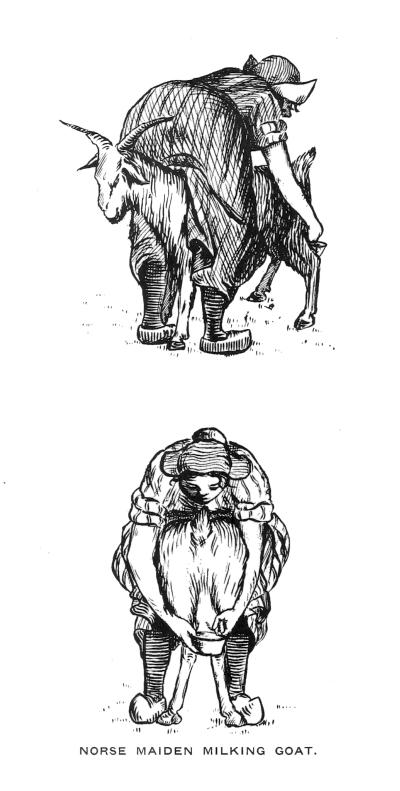
NORSE MAIDEN MILKING GOAT.
During the last two days we have frequently met men bearing on their backs and dragging on sledges piles of birch branches, the twig ends with the leaves yet on, and we have noticed here and there, entire birch-growing hillsides where the saplings had all been trimmed, the tender twigs sheared off and frequently the lopped-off branches stacked up in bundles stuck in a handy tree-crotch. This is the winter fodder for the goats, and the birch twig is as important for them as is the hay for the cattle. Just as in Switzerland, large flocks of goats are pastured throughout the summer upon the higher mountain slopes and ridges, and much cheese is manufactured from their milk. Of sheep we have seen few, although I understand a good many are raised for the local demand for wool. Like Scotland, Norway is hereabouts too cold and harsh for sheep to do their best.
Nor have we noticed many fowls, turkeys or geese or ducks about the farmsteads,—only a few chickens here and there. This also is too cold a climate, with too rigorous and lengthy winters for poultry to be profitable. Nor have we had chicken set before us but the once when we supped with the inquisitive dame of Tonsaasen. Trout and reindeer steak as well as eggs we have often had, and once roast ptarmigan.
Neither in Britain, nor in France, nor in Germany have I ever seen a wooden house; all buildings there[Pg 104] are of stone or brick; but here the buildings throughout the countryside are all of wood; hewn logs most frequently, not uncommonly of sawed lumber, these latter quite often painted white and red, reminding one of tidy New England. The roofs are steep to shed the snows or, otherwise, quite flat and covered with a layer of birch bark and then tight-growing sods and mosses, which covering the snow may melt upon but through which it will never soak.
To-day being Sunday, we have met many churchgoers upon the road, and have passed two churches where the Lutheran service was being held. During our drive we have constantly noted the number of these Lutheran churches, as well as the snug-built, substantial schoolhouses. Piety and intelligence deeply mark the lives of these Norse people. Just as in Denmark, so here also is the Lutheran church recognized and supported by the state, and its pastors constitute a formidable and influential body, guiding the thought of the Norwegian people. Apparently the schools here are as universal and as well attended as our own. Every Norwegian child, who is of school age, is compelled by law to go to school. Nowhere outside of my own country have I seen so many schoolhouses dotting the countryside. In England there are no common schools and no schoolhouses. In France the schoolhouses are hidden among the buildings of the clustered villages. In Switzerland, perhaps, the schoolhouse is as much in evidence as here, but in neither Germany nor Holland, although their[Pg 105] universities lead the world, is there revealed the teaching of the common people as is done by the many schoolhouses of this northern land.
Now we are housed in a commodious and quite modern inn, and have had a delicious trout supper, all our four carriage-loads of travelers sitting at one long table, where H and I have been the stars—for we only and alone can talk equally to the Dane and his Norwegian wife, to the young Frenchmen, and to the German pair; while through us only can they exchange ideas, for we alone can talk to each in his own native tongue. “Ah! these Americans!” “You talk all the languages!” “How wide you see!” “While we, we do not see beyond the boundaries of France.” “We speak too seldom a foreign tongue.” “You are bigger-minded than are we!” So exclaimed one of our French friends.
Dalen, September 8, 1902, 7 P. M.
Our series of great rides on land and water is at an end. For eight days we have been inhaling the crisp, buoyant, ozone-laden atmosphere, viewing the majestic scenery, watching the sturdy, strong-faced men and women, the rosy, yellow-haired children; and now it is over. H and I agree that in our lives we will never again experience a more delightful outing—our sure-enough honeymoon.
This morning we left the Hotel Haukelid with only sixty kilometers for the day, and most of it down hill; since noon yesterday we have been coming down. Just a little snow was now to be seen far away upon distant summits, while forests of birches, interspersed with aspens, covered the nearer slopes. Our road led us along the borders of several exquisite lakes, the little Voxli Vand and then the greater Grungadals Vand, about a mile wide and ten or twelve miles long; frowning precipices and cloud-wrapped heights encircled us on every hand, their rocks now largely greened over with mosses, and birches—only a few firs—growing wherever trees might thrust their roots. Then we drove through a narrow clove, along a frothing torrent, and came to another vand equally shut in, but not so long nor so wide,—a greener, warmer valley, Boertedals Vand in the Boerte Dal. Here we dined at Hotel Boerte, rested till 3 p. m., and then got away for one of the finest thirty kilometers of the trip. If we only had had Ole Mon to drive us, how perfect would have been the day! I imagined we had already come down enough to be at the bottom, but we were yet to descend a mighty canyon with the road blasted out of the precipice’s side, and walled in with rock posts and iron defenders, much like the Laera Dal, while far beneath us wound a silver thread, the almost imperceptible roar of whose waters floated up a tremulous murmur. We came down at a rattling trot, every moment unfolding new vistas of vale and precipice and mountain. After two hours of this fearful, yet joyous, coasting we crossed a wide-spanning iron bridge and swept out into the charming vale of Dalen, at the head of the Bandaks Vand, where now we are. The mountains are here clothed in heavy forests of birch and much deciduous timber, only a little of the fir; I can scarcely realize that yesterday we were up amongst the mosses, the lichens and the snows. As we descended we kept taking off our wraps; our rugs were folded up; H took off her golf cape, then her jacket; she wanted to ride with bared head, so soft and warm had grown the air.
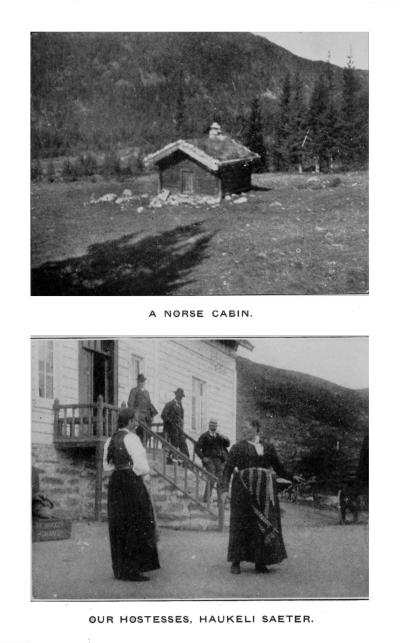
A NORSE CABIN.
&
OUR HOSTESSES, HAUKELI SAETER.
Kristiania, Norway, September 10, 1902.
Yesterday, we left Dalen at the head of navigation on the Bandaks Vand, boarded a taut little steamboat about 150 feet long, built for deep water, and traveled sixty-five kilometers through a succession of vands and fjords—the Telemarken Fjords—canals and locks—twenty locks in all—to Skien (called “Sheen”), where we took the railway for Kristiania, arriving at midnight.
The lakes were long, narrow and mostly shut in by heavily-timbered mountains, which as always, lifted up to enormous heights, green vales and valleys opening in between, where were picturesque hamlets and neat, thrifty-looking farmsteads.
Nothing here impresses me more than the great patience and tireless energy of the “Norsks,” as they call themselves. The magnificent roads, superior to those of England, equal, almost equal to those of France; the canals, blasted for miles through solid granite; the railways, which are as good as our own; the little boats so perfectly appointed. The Norwegians impress you as being born seamen; they know how to build and how to sail a boat, and you feel it.
Standing upon the forward deck, watching the changing panorama of vale and lake and mountain, I became so absorbed in the enchanting pictures that it was some moments before I noticed a slit-eyed, high-cheek-boned, black-straight-haired, short, pudgy youth or man—hard to tell which—a sure-enough Lap if ever there was one, who was making vain efforts to[Pg 109] hold conversation with me. He spoke slowly and with some hesitation in perfect Cockney English. I at once gave him my ear, and asked him where he had learned to speak so well. “Hi ave been a cook in Lonnon,” he said. “Hi ave been hassistant cook in a Hinglish otel, you know. Hi am just now leaving the otel at Dalen, where Hi ave been hassistant cook this summer, you know.” Whereupon he told me of his experiences in London. How he landed there from a Norwegian ship, friendless and unknown, and made his way by his aptitude in wiping dishes! And some day he “oped” to go to “Hamerica” and there own a kitchen all for himself. “Ow strange it must be for an Hamerican to see real mountains,” he exclaimed, and I discovered that the only America he knew about was the prairie land of the flat west.
Upon my asking whether he was not a Laplander, he resented the suggestion with great vehemence, declaring himself to be a Viking pure, and he begged me to let him know if I should learn of any good openings for dish-wipers in America, especially if it would lead to the dignity of cook. His manner was frank and simple, wholly free from self-consciousness, except as he took great pride in being able to speak the English tongue. In Norway there are no classes and all men stand equal before the law. It is as respectable there to work as it is in America, and similarly men meet you as your natural equals. There is none of that offensive subserviency which so jars[Pg 110] upon one in most of the monarchy and aristocracy bestridden lands.
The volume of water which flows from these lakes and through these deep canals is immense and we have sometimes swept along the narrower channels at really an exciting pace. We had just passed through the beautiful Flaa Vand and descended the deep full-flowing river, the Eids Elv, with its many locks, to the greater Nordsjoe Vand, when we drew up beside a little pier. There were many people upon it. Evidently, there was here gathered an unusual crowd, and down the hillside leading toward us came yet others. The whole community had turned out. Two tall, rosy-cheeked, blue-eyed, fair-haired young men were the center of the throng; about them the others pressed. They were neatly dressed, fine-looking fellows, and the men and women were kissing them good-bye. They were going to America, perhaps never to return. The mother, a gentle-faced, white-haired old lady, wept on the necks of each of them, and the white-haired father kissed them upon either cheek, and then everybody rushed in to shake their hands. They were going to America where so many of Norway’s most ambitious and able sons had gone before. The whole countryside would watch their career and wait for news of their success! Two iron-bound chests were dragged on to the boat. The young men stepped alertly aboard, their faces flushed with the excitement of the farewells and the anticipations of the land across the sea. As I watched them and their family [Pg 111]and friends waving their adieus I could not but ponder upon this instinct of the old-world races, my own among the rest, to go out and seize life’s prizes even across the widest waters. The leave-taking I was now beholding must be not unlike that of the men and women who in the days of Pilgrim and Puritan and Cavalier left little England to found a community where freedom and opportunity are still the loadstones which attract the energy and youth of all the world.
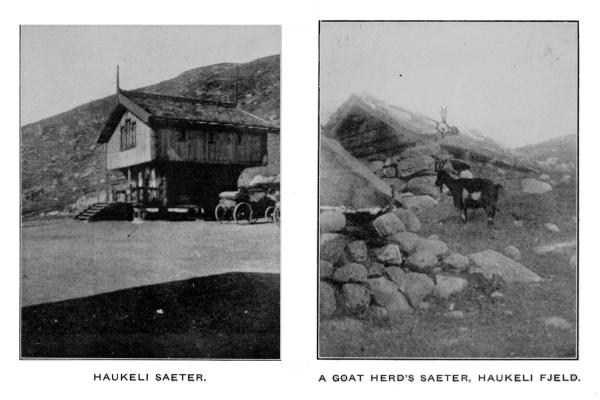
HAUKELI SAETER.
&
A GOAT HERD’S SAETER, HAUKELI FJELD.
In traveling through Norway, I have been greatly surprised to see so many newly-built farmhouses, barns and farm buildings, new fences and modern gates. Everywhere the old and tumbled-down is being replaced by the substantial and modern. I have seen nothing like this anywhere in Europe; nowhere so general a replacing of the old with the new. Many of the new farmhouses are not merely substantial, but are architecturally attractive. There must be abundant money coming from somewhere to pay the cost of this universal rebuilding. I have asked about it more than once and every time I receive the same reply. “The sons have gone to America, they are in Chicago, in Minnesota, in Dakota. They have grown rich. They are sending back the money. They want the old places made as trim and spick as though they were in America.” “Put everything in good repair,” they say, “never mind the cost.” And then, every few years they return with the American grandchildren to see the beloved old folks. More and more of these American-Norwegians[Pg 112] are coming every year to holiday in the fatherland. Many now regularly sojourn throughout the summer. A few, a very few, remain to end their days on the loved home-soil.
I also learn that it is to supply the demand of this increasing travel from America to Norway that the Scandinavian-American line have recently put on the large ocean steamers now sailing direct from New York to Kristiansand, with accommodations equal to anything which has hitherto entered the ports of Germany and England and France.
The other day at Loeken, we were waited on at table by a fine-looking young woman who spoke perfect United States. She had an air about her of comfortable independence. The house, the farm buildings, everything about the place was new and neat. While we were talking with her, she told us that she had a brother and an uncle in the far west, one at Spokane, who was rich. She was living with him when word came that the old father had passed away. She was needed at home to care for the mother and the younger children, so she returned; and the brother sent back the money to have the old place put in perfect repair.
This intimate connection between our thriving west and Norwegian home life, largely explains, I think, that independent American spirit which now so prominently marks Norway, and the growth and assertion of which is driving her by natural momentum away from the hectoring ties of franchise-constricted, aristocratic Sweden, pushing her toward her inevitable destiny—to become a Republic.
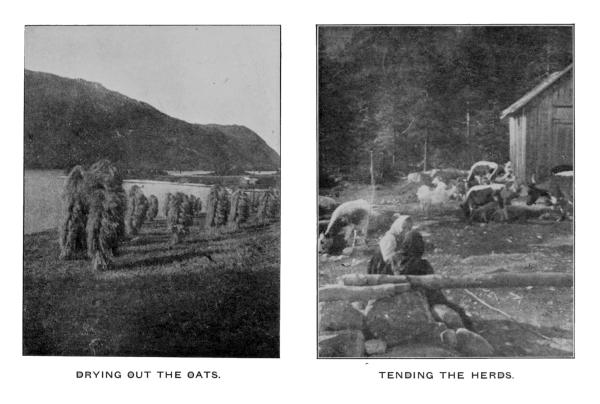
DRYING OUT THE OATS.
&
TENDING THE HERDS.
The immigration from Norway to the United States has taken from her
nearly one-half the population, a much larger percentage than has yet
come forth from Sweden. Although even there, so great is now the
exodus, that the Swedish Ministry is alarmed; there is also uneasiness
in Norway. Recently, laws have been enacted prohibiting the steamship
agents from spreading among the people the glowing accounts of
America, by means of which so many steerage tickets are sold, but all
the same, the propaganda is persistently carried on. At Skogstad, the
other day, I fell in with an alert-looking, quiet-mannered man, who,
after he learned I was an American, confided to me that he himself was
from Minnesota. He had been born in Norway, but went to America when a
boy. He was now back in Norway representing large farming interests in
the Northwest, and his business was to recruit farm hands for the
western wheat fields. He said he had penetrated during the past three
years into every nook and cranny of Norway, everywhere finding out
what vigorous and sturdy young men would like to go to America, and
then arranging with them to pay their passage, and supply sufficient
funds to enable them to pass the immigration inspectors, and providing
also their railroad transportation to the west. “They are a splendid
and hard working lot of men,” he said. “We want all of them we can
get. And most of them do well when[Pg 113]
[Pg 114] they reach America; many of them
become rich men.” He was traveling in the disguise of an itinerant
doctor selling herbs and roots.
Crossing the mountain this side of Boerte, where the road wound up through the fir forest to avoid an immense cliff which jutted into the lake, I stopped and dug up a little seedling fir, surely a real Norway spruce. I took it up with care and have now brought it to Kristiania and to-day am sending it to America by mail wrapped in damp mosses, and trust that it will reach Kanawha with life enough to live and thrive in its West Virginia home. Along the roadside, not far from where I found the seedling, were lying a fine pair of skjis, just as the wearer laid them aside, only to be worn when winter shall return. The Norwegian does not need to lock his door!
Upon the mossy, marshy, moorland summits and divides which we have traversed, I have noticed widespread beds of peat. In some places these are extensively worked, large areas being uncovered and the squares of peat piled up to dry. The existence of this fuel has proved a godsend to Norway, for the forests are often distant and year by year the woodlands diminish. Although there are some inferior coal beds in southern Sweden, there are none in Norway, and for fuel her peat beds and her forests are her sole domestic supply. And yet, despite this lack of fuel, it seems to me that Norway is dowered with enormous stores of power. She possesses water power without stint. King Winter surely cannot freeze up [Pg 115]all the streams. Will not the day yet come when the harnessed water powers of Norway may run the turbines which will supply the world?
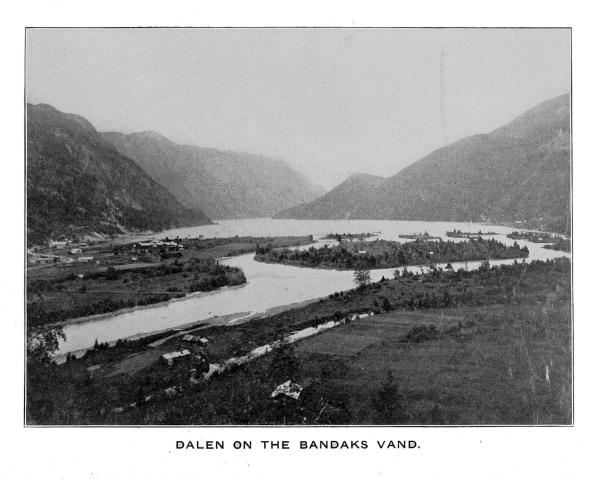
DALEN ON THE BANDAKS VAND.
It is yet early September; the belated summer of this far northern land, to our strange eyes, is just begun. The meadows are green; the fields of grain are scarcely yellowed; in the markets of Kristiania we see daily exposed for sale fresh-ripened strawberries; in our Virginian latitude it would be the season of the month of May. Yet we see big stacks of firewood piled near each farmhouse door; we see the cabin newly banked with earth against the frost; at blacksmith’s shop we see men hammering on well-used sled; alongside the road, awaiting the winter’s need, lies an upturned snowplow newly ironed; everywhere men are making ready for the cold. In a fortnight the highway across the Haukeli Fjeld will be blocked with new-fallen snow. In a month the jingling bells of sleighs and sledges will sound along the now verdant valley of the Baegna Elv.
A year ago, when traveling in Mexico, in southern Michoacan, the tropical precipitancy of the night was sure to take me unawares. I was never quite prepared for the sharp transition from day to night. The hot red sun rested a moment above the towering Cordillera, then it dipped behind, and the cold white stars instantly shone forth. Here in Norway my senses are equally surprised. It is already September and yet “early candle light,” means near ten o’clock. The day dies slowly. The contours of vale and mountain[Pg 116] almost imperceptibly fade upon the eye. A violet blueness softens form and hue. Little by little the violet changes into gray, and then the grayness pervades the air as though the shadow of some phantom raven’s wing overspread the world.
At nine o’clock, at half past nine, at ten o’clock, the goats and cattle are awake—we have made long day-drives by reason of the limits to our time—I wonder if they ever sleep. The sparrows and gray-coated crows fly soberly across our way; a magpie softly flutters to the road. I hear no bird-songs, only faint twitters, no chirping crickets, no piping frogs and newts, none of the evening sounds of my Virginian countryside. A hush creeps over dal and fjeld and fjord, even as do the mysterious violet and gray shadows. We ourselves are drowsed. I do not speak to H nor she to me. To the ponies Ole Mon has ceased to talk. The world is stilled. We draw long breaths, inhale the delicious air, lean back against the cushions of our seat, and daydream amidst this hush of man and thing. The old Norse driver of the Roldal cautions H to watch. “This is the hour,” he says, “when the elves and pixies stir abroad. Count the fifth meadow from where you stand and there they are always sure to be.” Thus have we driven through the twilight, the mysterious, lingering twilight of this far and almost Arctic North.
This is the last letter you will receive from Norway and I am sure that you will agree with me, after reading what I have sent you, that nowhere in all the world may one have a more delightful outing.
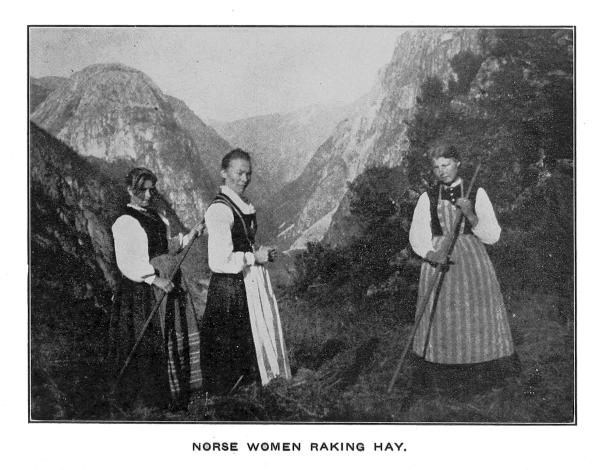
NORSE WOMEN RAKING HAY.
As to expenses, I figure it up that the total cost for both of us is a little less than five dollars per day, which includes our carriage, our driver, our eating, our sleeping and the liberal fees which, like good Americans, we have everywhere bestowed. Here in Norway the oere (two and one-half cents) is as big as the quarter, and the kroner (twenty-seven cents) as big as the dollar.
How long the oere will loom so large I dare not say, for the American invasion is begun, and I fear the kroner will soon be no bigger than the dime.
Stockholm, Sweden, September 12, 1902.
We came over here night before last from Kristiania, by the night train; by sovevogn (sleep-wagon), the first I have tried in Europe. We traveled first-class and had a compartment to ourselves. About 9 p. m. a porter came in at a way-station, put all our bags out in the corridor, pulled out the round cushions at the back of the seats and put them into the overhead racks; he then pulled out a linen cover with which he overlaid the long seat, and unholed small, wee pillows from a cavity at the end of each seat; the beds were made! Later, another man informed me that we could have sheets at one kroner (twenty-seven cents) each; but these we declined. Fortunately, we had with us our heavy sea rugs. I put H into my long gray overcoat, did her up in the blanket and rug, and tucked her big golf cape over her. Then I put on my blanket smoking jacket, my slippers and cap, rolled up in a blanket and rug, and so we slept comfortably on our narrow seat-beds. There was no heat in the car, and only one toilet room for both sexes! The night was cold and it was with [Pg 119]difficulty we managed to keep warm. Such is the modern European method of running a sleeping car.
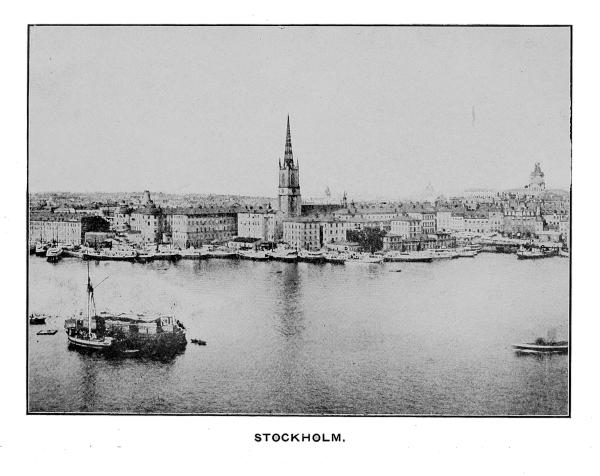
STOCKHOLM.
The train we traveled in was crowded. In our car every compartment was filled. There were two groups of travelers who interested us. The first was a party of Americans, a petite elderly woman, keen, lively, very much mistress of herself, evidently accustomed to command, and with her two pretty black-eyed American girls, “pert,” “sassy,” and used to receiving the homage of man! In their company were half a dozen tall, blond-bearded, blue-eyed Viking youths, entirely willing to be commanded and to render homage. They were all in uniform, a dark blue cloth with red facings and a very little gold braid. The blue eyes shot tender glances, we thought, the black ones defending against Cupid’s darts with great vivacity. Each young man presented an enormous bouquet to the elderly woman, and one gave her a basket of fruit—the girls got nothing, only the blue-eye-flashes. And how eagerly the young men promised to call on the elderly woman, if ever they should be so fortunate as to visit New York! And all the while the two American belles laughed and smiled and smote yet deeper through the dark blue uniforms. The departing train almost carried away with us one fair-haired giant. All the military caps came off with sweeping bows, while two handkerchiefs fluttered from the windows.
The other group took us by storm and also captured the train. Before we knew it, there was a surging[Pg 120] crowd outside the car and the roar of many Viking throats. And then into the compartment next to ours rushed a pack of ladies, one of them all in white, with a sweet face half hid in a pink satin bonnet. A little man with waxed moustache, curly black hair, wearing a stovepipe hat, and clad in evening dress, followed close behind. The women admitted him, as though by right, but no other man was let inside. It was a wedding party. A wedding in high life. He was a Professor at Upsala. She was one of Kristiania’s fairest daughters. They had been married in the Fru Kirke in the afternoon. She had had a big reception at her home. The friends and guests were now come down to the train to see them off. She was large and fair and rosy, yet in her early twenties. He was small and weazen, shriveled and swarthy. They called him “Herr Doctor,” evidently recognizing his eminent standing. Flowers and rice and a white satin slipper were thrown into the window. There was tremendous hugging and kissing of the bride by all the women,—I could not see that here the men had any show,—and pandemonium still prevailed upon the station platform when the train pulled out. Later in the night I was awakened by shouts and then most glorious singing. I sat up with a start, the melody pulsing through my brain. The Student Corps from the University of Upsala had come down to the junction where the newly-wedded pair would change cars, to welcome their Professor and his bride. They were singing a mighty welcome. And it was[Pg 121] such full-toned, full-voiced, perfect and practiced singing by the hundreds of young men who seemed to be on hand! I fell asleep as our train went on, the splendid harmony of the well-trained voices filling me with dreams of realms not far away from Paradise.
Next morning I was about dressed, and H was adjusting her skirt, when the doors, which I thought securely locked, flew open and a burly red-faced uniformed official thrust himself in. He came to take away the pillow cases! He did not seem to think he in any way intruded; privacy is not much respected this side the sea.
Our toilets were scarcely made when the train came to a stop in the station at Stockholm. Indeed H was not yet quite ready, when another official in uniform again burst open the door and began grabbing our effects. To his astonishment he was forthwith ejected and the door shut in his face. When we were finally dressed I went out and found him waiting for us on the station platform. He was a licensed porter.
We were first obliged to fetch all our belongings to the Custom House, where important-looking officials, in gray uniforms trimmed with red, asked perfunctory questions and hurriedly passed us through—an exercise of Swedish authority which seemed quite unnecessary since we came direct from Norway under the same King. This done, our porter then gathered up our bags and rugs, put them into a little two-wheeled[Pg 122] push cart and started out across the square. Here again I came near meeting the fate of the tenderfoot. We did not know the location of the Hotel Continental; I stepped up to a cabby and told him we wanted to be taken to that hotel. A man in uniform gave me a brass check with “No. 5” marked on it, pointing to a cab standing in a long row which also bore a No. 5. I handed the brass check to No. 5 cabby, and was putting in my bag when our porter pointed to the farther side of the square. There was our hostelry, not three hundred feet away! I took out my bag from the carriage, in spite of protest, and walked to the hotel. The driver claimed a fare of half a kroner and raised a mighty clamor, but I vowed I would not give him an oere. Thus you must have your eyes about you when you come to a city you do not know.
The Continental is a fine hotel. The rooms are supplied with electric lights and with telephones (good ones, not the imperfect London system). We have a large front room, facing the Vasa Gatan, with dressing room and ante-room, handsomely furnished, and as clean as anything can be. We are fain to be content with the fourth story, although we asked for the tenth, and a new modern elevator takes us up and also down; all this costs only six kroner a day ($1.62) for the two of us. Our breakfasts are served in our room, two eggs each, a pot of coffee, boiled milk and cream, a basket of rolls, fresh radishes, cold tongue, cold veal, smoked goose breast, anchovies, cold smoked salmon, cheese, each in a neat little dish by itself, and a big round flat slab of slightly salted butter; all for one and a half kroner each, three kroner for us two (eighty-one cents). You receive much for your money here in Scandinavia.
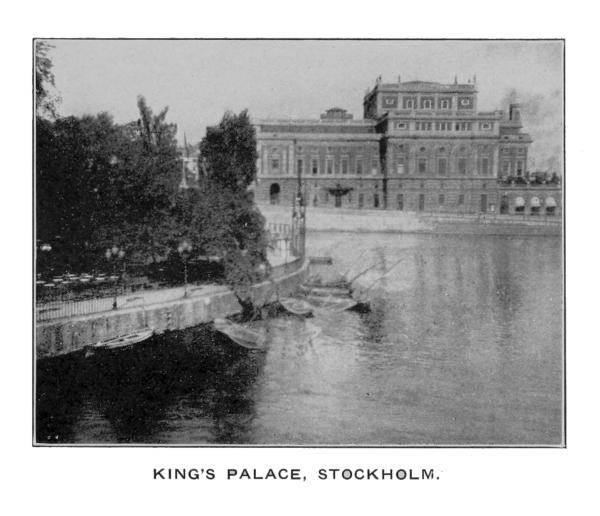
KING’S PALACE, STOCKHOLM.
The spirit of Stockholm, although intensely Scandinavian, is yet widely different from that of either Copenhagen or Kristiania. It is a difference, not so much to the eye, as to the feeling.
The city presents the same substantial and solid types of buildings,
there are the same high walls of stone and dark red brick, and
sharp-gabled roofs covered with heavy tiles, the same square towers,
the same spindly leanness to the steepled churches, and in the older
sections the narrow streets are paved from wall to wall with the same
big squares of granite. The people are mostly blue-eyed and
fair-haired like their kindred Danes and Norsks. But here the likeness
ends and you feel it the instant you pass out upon the street. I
missed at once that certain self-containment, based upon
unostentatious self-respect, which marks the Norsk, where no man knows
a lord but God, and manhood suffrage everywhere prevails. I missed
that composure of manner and self-assurance to the step, which lets
men look you calmly in the eye without offense, that spirit, which
takes for granted the perfect equality of man and man. I instantly
felt myself among men of another temper. The alert, frank,
self-respecting manner of the Norsk is lacking in the Swede. I[Pg 123]
[Pg 124] found
myself again among a “lower class,” who have no votes, and treat you
with sullen servility, and also among men with the swashbuckling
manners of military caste. Stockholm is full of young officers in
natty uniforms, who strut along the streets aping the braggart
insolence one meets among the soldier-bestridden Germans. The peasant
and townsman must also here step aside to let these Yunker soldiery
pass on. Militarism hangs heavy over Stockholm, where the scions of an
impecunious aristocracy think to find in dashing uniform and truculent
German manner a restoration of the noble military traditions of the
past.
The Norwegian looks out upon the Twentieth Century and finds his
inspiration in the example of free America and the universal equality
of man. The Swede looks ever backward to the glorious days of Gustavus
Vasa, Gustavus Adolphus and Charles XII, and sighs for a return of the
good old times when the half of Europe trembled before Sweden’s
military might. The lofty mountains and profound valleys, the savage
mystery of fathomless fjords, the wondrous immensity of the unknown
and illimitable sea, which fired the brain and pricked the energy of
the Norseman, and made him poet, pirate, explorer and conqueror
through a dozen successive centuries, were all unknown to the
practical-minded Swede. His monotonous forests, his sandy levels and
shallow gulfs, his pond-like and insignificant Baltic Sea, stirred no
fibre of his imagination; nor when he crossed those narrow waters
and set foot upon the flat and barren shores of Germanic and Slavic
Europe, was there anything in their sombre forests and limitless
plains and desolate marshes to arouse within him the fire of his soul.
War with the flaxen-haired savages, who swarmed upon these lands like
myriad wolves, was his only exercise. He sailed up the Gulf of Bothnia
till he entered the Arctic wastes where dwelt the Laps; he followed
the shores of the Gulf of Finland, and explored the river Neva and
Lake Ladoga and connecting streams, and even crossed to the waters of
the mighty Volga, and entered Asia by the Caspian Sea; he ascended the
lesser Russian rivers, and pitched fortified camps along their banks,
founding Revel and Riga and Novogorod, whence the Swedish Ruriks gave
to the Muskovites their earliest Czars. He ruled Finland and Esthonia
and Livonia and Courland, and even begat Sigismund, the Polish King.
For centuries he warred with and ruled these Slavic tribes until at
last, driven back to his narrow peninsula, the mainland knew him only
as defeated and expelled. A practical, unimaginative fighting man was
the Swede. He loved war for war’s own sake, and when he had no longer
reason to war for conquest or defense, he clung to pike and sword as
permanent substitute for plow and seine, and hired himself to
bickering Slav and German and grew famous as a “Mercenary,” who
spilled his blood for pay and the plunder of his master’s foes. Thus
have the cousin peoples swung wide apart. The one, free and
open-minded; the other,[Pg 125]
[Pg 126] still dazed by the faded glories of a long
dead past, turns ever a wistful eye toward the military tyrannies of
Czar and Kaiser, and finds in the inequalities of landed noble and
landless yokel, in official and military caste and enthralled
peasantry, the realization of his Fifteenth Century ideal.
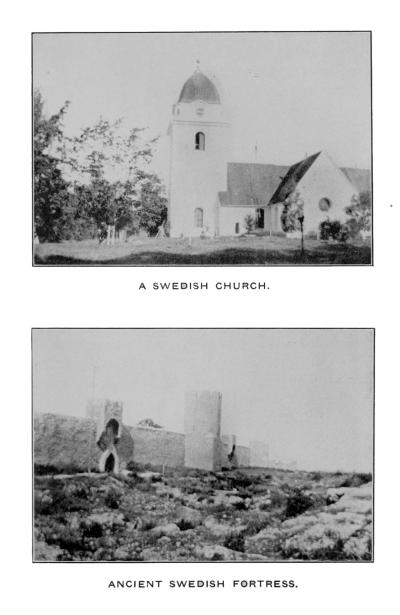
A SWEDISH CHURCH.
&
ANCIENT SWEDISH FORTRESS.
Thus, as I have wended my way along the Vasa and Freds Gatans and neighboring streets, toward the fine Gustaf Adolf Torg, the chief public square, mixing among the jostling crowds, have I felt keenly the variant atmospheres of these Norse and Swedish lands, differences which finding their roots in the historical development of the kindred peoples make their present union beneath a single flag and King both artificial and constrained.
While on the surface and to the feeling there is apparently wide divergence in political sentiment between the Norwegian and Swedish peoples, yet there is in reality a closer and closer approachment between them. The democratic notions prevailing in Norway already stir the pulse of the Swedish peasantry and working classes—the classes which in Sweden have no votes. Already has the demand for universal suffrage been raised in Sweden, and sentiment inimical to aristocracy, yunkerdom and privilege, grows continually more aggressive. An intelligent and aristocratic Swede with whom I have discussed this question to-day, admits this rising tide of democracy, and admits, also, though ruefully, that not until universal suffrage shall become established in Sweden will it be possible to come to that understanding with the Norwegian people on which may be founded a lasting and united Scandinavian State. Thus in Sweden itself, I hear uttered sentiments very nearly akin to those which caught my ear when in Copenhagen: the possibility, nay, probability, of a common Scandinavian Union, when the peoples of Denmark and Norway and Sweden shall federate, and the obsolete system of kingship and privilege shall be set aside.
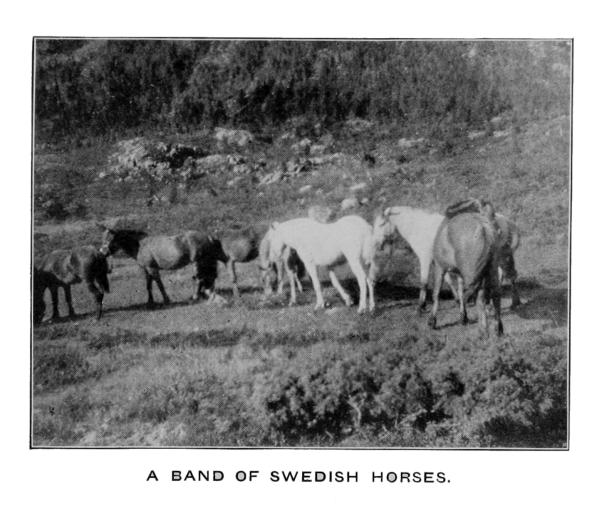
A BAND OF SWEDISH HORSES.
Stockholm, September 13, 1902.
While wandering about the city I have not taken a guide. A guide or a courier is to me always a very last resort, but I have followed the movement of the crowd, and enjoyed the being lost in it, immersed in it, becoming one with it, while yet so separate. I could not read the signs, nor understand the speech. I could only see. My vision became my one guiding sense. My eyes became abnormally alert. Color and form and action,—I caught them all. And what I saw, my mind held fast. Thus I wandered on through many quaint and ancient Gatans (streets) past Plats and Torgs (open squares), and over Bros (bridges), and yet I felt secure and well assured that, returning, I should find my way safely back. I knew each corner of a street, each square, each unusual sign, each building of strange design, even as at home I have often wandered alone among the wild mountains and forests with nothing for a guide but my eyes, the sun, and my knowledge of moss and tree. Thus has my early training always served me well [Pg 129]in foreign lands and cities, where speech was strange, and I myself unknowing and unknown.
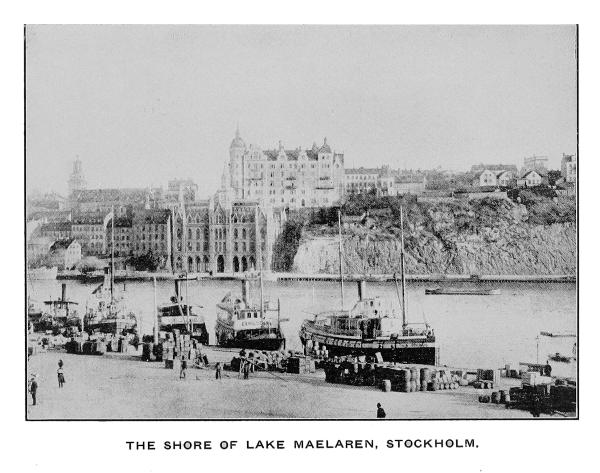
THE SHORE OF LAKE MAELAREN, STOCKHOLM.
My first quest was a bookstore, a map, and an English or French or German-worded guide book, which would tell me of what I saw. By great good luck, I happened immediately upon the object of my search. I saw a window holding maps. I entered a small shop, and found it the “Bureau” of the “National Tourists’ Union,” with German spoken perfectly. This bureau is maintained by the enterprising citizens of Stockholm, and for most moderate cost gives information to tourists, and publishes a series of fine maps, showing every road and lake and mountain and town and inn in Sweden. I bought a set of the maps and one in particular of the city. Thus fortified I was now perfectly equipped.
Our few days’ sojourn in Stockholm has taught me to like the Swede, although he is quite lacking in the hearty frankness of the Norsk. Stockholm has always been a spot where men have congregated, and has been a city known as such these last eight centuries, ever since Birger Jarl made it the seat of his pirate power. It holds the passage between the lakes Maelaren, which stretch far inland and now form the eastern section of the great Gotta system of canals reaching across Sweden to the Kattegat and Atlantic Ocean, and the deeply indented waters of the Baltic Sea, thus being a natural place of rendezvous and commerce; it was a place easy of access before men had roads and mostly traveled by boats. Here the Kings[Pg 130] of Sweden have always set their capital, and the history of Stockholm is the history of the Swede himself.
In past ages, disorders and massacres and open murders have drenched with blood her streets and her great public squares, and Stockholm’s dungeons have their tales of horror and wickedness to tell. She was cruel and turbulent when Sweden herself was harsh and savage, she is now equally serene and contented under the liberal rule of enlightened King Oscar II, and is become one of the best-ordered and most beautiful cities of the world. By reason of the many islands within her limits, she is called the “Venice of the North,” and by reason of her cleanliness, the substantial character of her modern buildings, and the efficiency of her municipal government she is termed the “Edinburgh of the Baltic.” Stockholm is more scientifically advanced, and more modernly wide-awake than are the German and English cities of to-day. She has a fine and bountiful water supply, an elaborate and efficient telephone system, and is probably more thoroughly and effectively illuminated by electricity than any city in Europe. The older quarters of the city are well paved and scrupulously clean; in the newer sections are blocks of stately buildings of modern design, and wide boulevards and avenues paved with asphalt and squares of stone. Her public buildings, her numerous Plats and Torgs and lovely parks are all exquisitely kept.
We spent one delightful morning crossing the wide stone bridge of Norrbro, and viewing the Royal [Pg 131]Palace, the State Apartments, and Royal Library, and the fine old church of Riddarsholm, which is the Westminster Abbey of Sweden, her Pantheon, where lie entombed the bones of Gustavus Adolphus and the ashes of Charles XII, and members of the House of Vasa, along with other illustrious Swedes. The old church is of red brick, topped by a curious wrought-iron steeple, and is the shrine to which come all patriotic Swedes, there to contemplate the departed glories of their fatherland.
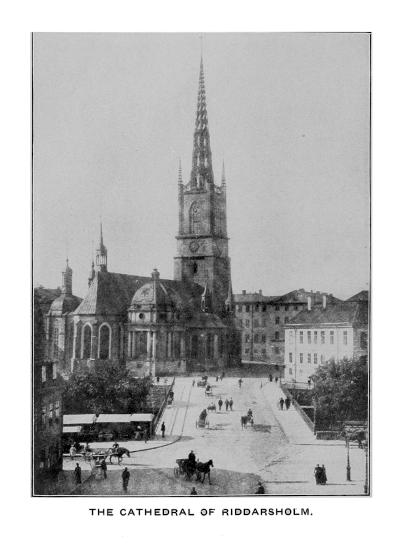
THE CATHEDRAL OF RIDDARSHOLM.
Of an afternoon, we visited the famous Djurgaard (deer park) and then went on to the park called Skansen, where are gathered a most interesting collection illustrative of the ancient Swedish way of living, as well as examples of the ancient industries, exemplified by charming lively peasant girls clad in their divers Provincial costumes. We then also climbed the tower set upon the hill, whence spread out before us a superb vista of the city and its many islands and surrounding waters, and wide-sweeping woods and forests. We also crossed among the islands upon dapper electric launches which ferry between, and then came back to dine in a fashionable restaurant under the Grand Hotel near the quay, where were small tables, and where sat men in dress coats and handsome women in evening dress—generally high-necked—and we were given fresh strawberries—this September 13th—and savory mutton chops and fresh-grown peas, and fruits and ices.
The streets at all hours of the day and evening were astir and gay. The many officers in blue and gray uniforms, patterned after the German styles, the Dalecarlian girls in their picturesque bright barred aprons and braided hair, carrying packages and bundles—the messenger boys of the North—the blue-eyed and yellow-haired men and women neatly and soberly clad, and the absence of all beggars—we did not come across a single one,—the multitude of boats, great and small, constantly moving rapidly up and down and across the many lanes of water, all these gave animation to the city.
The streets of Stockholm are filled with women, more like the German towns, while, just as there, scores of sturdy men stand idly around decked out in soldier’s uniform. Rosy-cheeked young women wait upon you in the restaurants; women armed with big brooms sweep at the crossings; women come in from the country driving carts loaded with produce of the farm; and women also largely “man” the small boats that ply along the waters between the islands. Woman is here as greatly in evidence as she is in Boston, but of a huskier, heartier type.
Visiting the markets, I found a great profusion of strawberries, whortleberries, blueberries and others I did not know, and withal, most of the vegetables my Kanawha garden would yield in June. These fruits of tree and soil are brought into the city by chunky native horses hitched to little two-wheeled carts, which horses, when they reach their destination, are securely [Pg 133]halted by a strap or line passed around their two fore fetlocks, tying the feet tight together, a treatment an American horse would scarcely endure.
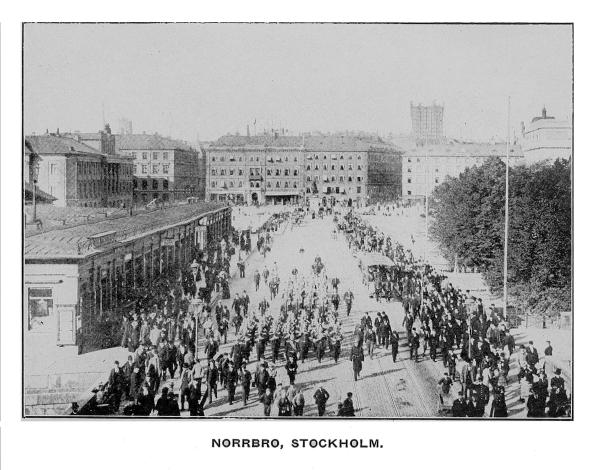
NORRBRO, STOCKHOLM.
Another day H and I wandered across the Norrbro and beyond the Palace and down near the Storkyrko Brink, and discovered a curious little coffeehouse, tucked away up a flight of creaking stairs, in an ancient building which seemed to be a counting-house below and offices above. Here were set against the walls little mahogany tables holding three and four, where plates were laid without a cloth, and ale and beer were served in tall pewter mugs. We called for the foaming brown brew and asked for roed spoette, our old Danish joy, and lunched delightfully. The room was filled with big, burly, red-cheeked men, merchants and sea captains, H thought, from what bits of conversation she could pick up. A most substantial company they were, who evidently came here to strike weighty bargains as well as to eat and drink and smoke. We were doubtless lunching in a well-known and most ancient rendezvous, much like the historic grill room I discovered in London, called “Toms,” where Dickens’ and Mr. Pickwick’s chairs are shown to the visitor, and the waiter will inform you on just what sort of kidney broil and roasted sausage each made his daily meal.
Stockholm divides with Copenhagen the honors of being the metropolis of the Scandinavian world, boldly asserting her superiority over Kristiania, for she is the larger city. She is easily first in Sweden in all[Pg 134] save scholarship and learning—in that, Upsala, the Cornell and Harvard of the North, holds unrivaled lead.
The fine stores and shops, along such streets as the Dronning Gatan and Regerings Gatan and adjacent thoroughfares, H declares quite equal to those of Copenhagen; while in an ancient and narrow alleyway she discovered a perfect mint of embroideries and linens, articles of feminine apparel which rejoice her heart.
On our last evening we attended the Royal Opera, occupying a box quite to ourselves, where we heard good singing and well-rendered music by the Royal Band, beheld a fashionably-dressed and intelligent-looking audience, and were stared at by old King Oscar who sat rigid in his box, and glared at us with a mighty black opera-glass until he had studied each feature of the stranger guests, and by his persistence thereby directed upon us the curiosity of every other pair of opera glasses in the house. The example of the King was quite in accordance with Continental custom, where the glare of opera-glasses is astonishingly bold. Nor does the impudent stare stop at that, but in Stockholm, just as in Paris and Berlin, between the acts very many of the men rise up, put on their hats, turn their backs to the stage, and deliberately focus their glasses upon the faces of every attractive woman in the theater, no matter how near she may be, nor how annoying this treatment may appear; and often two or three young men will then compare notes,[Pg 135] and unite in a common stare, bold and insolent. To avoid this unpleasant ordeal, ladies very generally rise from their seats, leave the theater and promenade in the foyers until the curtain rises and the impudent glasses are put down.
We have secured tickets and berths for the voyage to St. Petersburg across the Baltic Sea and Gulf of Finland. We sail to-night, and are to arrive on Tuesday morning, a voyage of three nights and two days, a distance of six hundred miles.
We have now visited the three capitals of Scandinavia, Copenhagen, Kristiania and Stockholm, and have spent a month among these kindred peoples.
While I had learned in America to esteem the vigor, the intelligence and the worth of our Scandinavian immigration, no finer race contributing to the citizenship of the Republic, yet it has been only when I have met the Dane and Norsk and Swede upon their native soil, and beheld their noble cities, so alert and clean and modern, and traversed their hills and valleys, and climbed their mountain heights and floated upon their fjords, that I have learned fitly to admire and appreciate the grandeur and greatness of Scandinavia.
St. Petersburg, Russia, September 16, 1902.
It is not easy to get into Russia; it is yet more difficult to get out.
Before leaving the United States, I had taken due precautions and secured a passport from the State Department, signed by Secretary Hay, with the Great Seal of the United States upon it. In that passport I was described. I had also provided myself with a special letter from the State Department, in which all consuls and officials of the United States in foreign lands had been bidden to pay particular heed to my welfare, for I was vouched for as a worthy and respected citizen of the Republic.
I presumed that, armed with these credentials, I should find all doors and gateways open to my passage. I assumed that the autocracy of the Russian Empire would be delighted to welcome a citizen of the great Republic, so well accredited. Imagine my surprise, when I presented myself at the ticket office of the Russian steamship line, by which we would travel to[Pg 137] St. Petersburg, and was refused a ticket because I did not then have my passport in hand, so that the ticket-seller might duly scrutinize it! An hour later, when I again presented myself with the passport and laid down the coin, I was a second time refused. The passport had not been certified by the American Minister in Stockholm, our port of departure, nor had it been viséed by the Russian Consul General of the port.
I immediately drove to the American Ministry, a mile away, where the Swedish clerk endorsed my passport as being genuine, and gave me a note to the Russian official. A drive of another mile brought me to a tall stone building, above the door of which reposed the Imperial Eagle. Ascending two flights of stairs, I was shown into a small ante-room, and, after waiting some time, was ushered into a large, well-lighted chamber, where a big, round-headed, bearded man, in Russian uniform, sat at a long table. He was writing. He did not deign to look up. After standing some moments before this important personage, I called his attention in my best French, to the fact that I was there. Still he made no reply, but kept on writing. I noticed that he was nearly to the bottom of the page; when he had finished it, he looked up and inquired in German what I wanted. I replied in German that I called upon him to have my passport viséed, and handed him the document and the note. He read the latter and looked at the former, but the description of my person was in English and he was evidently stumped. He gazed at me and the paper, took[Pg 138] up a metal stamp, pressed it on an ink pad, made on the passport the imprint of some Russian characters, signed his name to them, and advised me that I was his debtor to the extent of twenty kroners (about five dollars). He then turned again to his writing.
I had thus spent three hours in driving about the city, visiting these officials, and now hurried to the steamship office, where on presenting my passport duly viséed, I at last obtained the tickets. Upon boarding the ship, at a later hour, we were notified to call at the Captain’s office and surrender our passports, which were then once more verified, along with our tickets, before we cast off from the pier.
We left Stockholm about eight o’clock in the evening. We were a party of four,—H and myself, and the two delightful friends whom we met that day at Maristuen, at the head of the Laera Dal, in Norway. The suggestions then first made had ripened into a definite plan, and we agreed to join forces for our journey through Russia. Our friends were Mr. and Mrs. Condit, of Chicago, and we found their ready western wit and genial fellowship on more than one occasion of most signal aid.
We crossed the Baltic Sea in the night, and touched at the Russian port of Hangoe, in Finland, early Sunday morning. Here I noticed a messenger in uniform leave the ship bearing a long iron box heavily padlocked, and was informed that this box contained the passports of the passengers, which he was to take to St. Petersburg by a special Imperial train that[Pg 139] would put him there in twenty-three hours, when the passports would be immediately filed with the police department, verified, recorded and given to certain other officials who would meet our ship on its arrival at the mouth of the river Neva on Tuesday morning, and who would examine and scrutinize us and then return them to us. If in the meantime, we should happen to change our minds and want to remain a few days in Finland, say at Helsingfors, we would be liable to arrest for not having our passports now gone to St. Petersburg. We might not change our minds or alter our itinerary. It was now St. Petersburg or jail.
The twilight was just fading into night when we cast off from the pier and slowly made our way among the islands. The sail down the narrow channel to the sea was in the light of the full moon. The myriad electric lights of the city were blazing behind us. We passed the black hulls of many vessels anchored in the harbor, and in turn were passed by scores of little boats, with a big light on the foremast, which were scurrying about carrying passengers between the islands. Along the wooded shores were villas and country-seats, and ever and anon, there seemed to be open clearings and farms, and then we came into the blackness of wide waters. We were out upon the Baltic Sea.
In the morning we were among more islands; the Aaland Archipelago; we had had only two hours of the open sea. The sun was behind a mass of scudding[Pg 140] clouds, gray and threatening; and great banks of blacker clouds were rolling up from the south. A gale was blowing—a furious gale—which drove the waters and whirling foam wherever open space allowed. The wind was bitterly cold, and grew ever colder, while higher and higher rose the tempest. We were in great danger, although at the time I did not know it.
The steering of the Swedish pilots was skillful, and the little ship obeyed the helm perfectly, swinging round sharp points, and traversing narrow channels where, even in quiet waters, it is dangerous to navigate.
About noon we slipped in between two rocky islets, scarcely a cable-tow’s length apart, rising only a few feet above the level of the sea, and turning sharp to port came into the rock-bound harbor of Hangoe, a town of Finland, whence the railway goes on to Helsingfors and St. Petersburg.
The gale now grew into a tornado with deluges of rain, a storm so fierce that, until it should subside, the Captain refused to leave the protection of the port.
Thus we lay-to at Hangoe until the dawn of the following day, when we cast off from the long pier and plunged once more among the islands of the Archipelago. Hundreds of islands there were, barren and uninhabited, the big ones covered with dwarf birches, a few stunted pines and firs, the lesser islets thick with tangled grasses, or more often bare of all except lichens and gray moss, the vegetation of a desolate, wintry latitude.
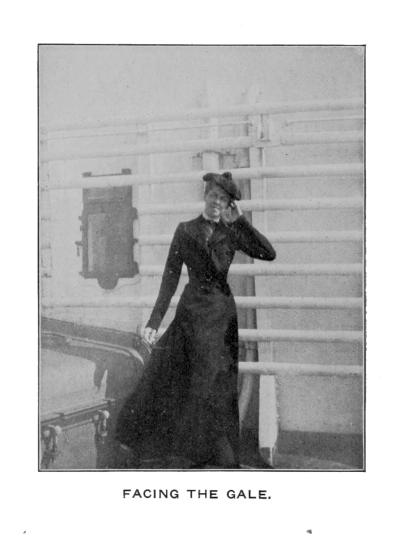
FACING THE GALE.
The wind was now somewhat abated, but not so the sea. It was angry, stirred to its depths. It was a bad day for a landsman,—a bad day even for an old salt. Two stalwart seamen stood ever at the wheel in addition to the pilot and our Captain, and it took all their combined strength and skill to save us from certain wreck. The conflicting currents churned and swirled with maelstrom violence, while we crept steadily on among the shoals and sunken bars and hidden reefs.
It was long past noon when we swung round a bold rocky point, and saw before us Finland’s capital, Helsingfors. The city surrounds the harbor much like a crescent. On either horn, granite promontories jut out into the sea, where are fortifications, one of them the formidable fortress of Sveaborg, where we could see brown-coated Cossacks gathered in large numbers watching our entrance to the port. A great garrison there seemed to be, and everywhere floated the Russian flag,—parallel stripes of white, blue and red. Russian troops not merely man all these fortifications, but there are also soldiers within the city itself, and more are quartered in every village of consequence in Finland. The ancient Senate and House of Chevaliers are no longer permitted to enact the laws. A Russian Governor-General issues his Ukases, which the Russian bayonets are here savagely to enforce. All this you already know, but it comes vividly upon one when you see the Cossack, clad in his long kaftan-like military coat, everywhere[Pg 142] about you visible evidence of how harshly Finland has been stripped of her rights and liberties.
Helsingfors astonished us. Lying upon a rising slope, it presents an imposing outline from the sea. It is a city of ninety-six thousand people. We were not prepared for so large and substantial a city. It has well-kept parks, well-paved streets, frequently asphalted as in Stockholm, and blocks of big granite buildings five and six stories high; the city is clean, and the streets are alive with well-dressed, rosy-cheeked, vigorous people. Everywhere there are electric tram-cars and electric lights, and on the broad thoroughfares are large and handsome shops. It is evident that in the Finnish hinterlands there is an extensive and well-to-do population.
Our ship was to lie at her pier for several hours, and the passengers were told that they might safely visit the town; if arrested for not having passports, we might refer to the Captain of the ship. So we wandered up along the quays, following a wide boulevard. Everywhere on the sidewalks and driving through the streets were Russian officials in their long gray coats and flat black caps; there were also many soldiers upon the streets.
Finland was once a province of Sweden, and the Teutonic Swedish language is yet that of the educated classes, who are chiefly of Swedish descent. In the country, however, and among the working classes, there remains the original population of primitive Finnish race, “The old Finns,” cousins to the Hun[Pg 143]garians, and these have a Turanian language of their own. They have accepted for centuries the Swedish rule and fraternized with the Swedish leaders, but have held to their ancient tongue. Now is also the Slavonic Russian speech, by Ukase, commanded to be the language of the schools, of the courts and of the government. Thus the Finlander must be acquainted with three fundamentally different tongues, and all of the streets of Helsingfors are named in the three languages on the same placard. The Russian name is in Greek text, then in Latin text the Swedish name, and under that the native Finnish name; thus there is much babel of tongues in Helsingfors, while all the Finlanders bitterly resent the brutal attempt to substitute the Russian for their own.
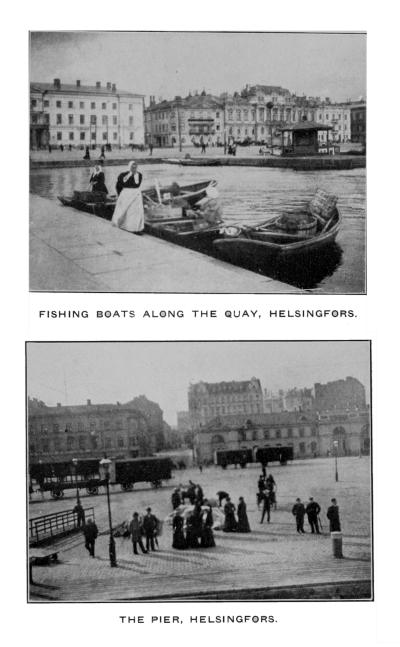
FISHING BOATS ALONG THE QUAY, HELSINGFORS.
&
THE PIER, HELSINGFORS.
Finland has, also, heretofore been privileged to coin her own money,—but now the Russian ruble is supreme. We had boarded a tram-car, as modern and comfortable as those of New York, and were whirling along the boulevard, when we tendered the conductor our fare in Russian coin (we had provided ourselves with “kopeeks” and rubles before leaving Stockholm), but he declined to take the money. He was about to stop the car and put us off, when a courtly-mannered Finn, addressing the passengers as well as the conductor, explained that, under the present laws, Russian money must be taken when tendered, and that we were entitled to ride,—so H tells me, who understood his speech, so much is it like the Danish. But the conductor, patriot that he was, refused[Pg 144] to touch the ruble I offered him, preferring to let us ride without making charge. If I had been able to do so, I would have explained to our fellow-passengers that I intended no insult, and would thus probably have restored myself to their confidence. As it was they glowered at me as a friend of hated Russia.
We visited the splendid Parliament buildings, where the Finnish Senate and House of Chevaliers have been wont to meet,—now closed forever by the Ukase of the Czar. I understand, also, that the Finnish judges have recently been deposed from the courts, and Russians appointed in their stead; and we were told by a friendly Finn that so completely are the people terrorized, that no patriot dare give open evidence of opposition to the Russian rule. One may only detect it by the sullen, disquieted faces of the people one meets upon the streets. In the dour glances cast at the Russian officials I saw everywhere expression of hatred and revenge.[1]
[1] The reverses of the Japanese War, the assassination of Governor Bobrikoff and threat of revolution have at last frightened the Russian Autocracy into partially restoring to Finland her pillaged liberties.
It was middle afternoon when we set sail again. No other vessel dared leave the port, but our Captain, being anxious to reach St. Petersburg, decided to venture on the voyage. As soon as we emerged from the protecting barriers of the islands at the harbor’s mouth, we came into open waters. A furious sea was running and the ship rolled heavily. She plunged and reared and pitched, until most of the [Pg 145]passengers were driven to their staterooms,—indeed, so mad was now the sea that we were told there would be no more hot coffee and hot steak, since the cooks in the kitchen could not keep their legs, nor could dishes be set upon the tipping tables. Those who were able to eat might get a snack from the steward, who would hand it out—cold fish and cheese at that. The boat rolled until her gunwales were awash, and frequently the roaring waters swept across the decks. Although it was a wild and dangerous night, yet the clouds were parting and the stars were out. No grander panorama of the sea have I looked upon than these mighty foam-capped billows—greater even than our ship,—between which we hid, and on the summits of which we climbed,—the angry, pitch-black waters, the star-lit firmament, and the serene moon shining with fullest splendor.

THE DOEBLN AT HER PIER, HELSINGFORS.
&
MARKET SQUARE, HELSINGFORS.
At dawn on Tuesday morning, we passed the great naval fortification of Kronstadt, and three hours later, after threading our way among fishing boats, were entering the canal which leads from the gulf of Finland to the river Neva and the city of St. Petersburg.
South and east of us, behind low shores, the land stretched away green and flat as far as the eye could see, an apparently indefinitely extending plain. Only the glint of a gilded oriental dome, the bulbous cupola of a Russian village church, lightened here and there the green monotony. Then far to the east we saw not one but many domes glittering and flashing in the[Pg 146] light of the lifting sun—the gilded towers of the cathedrals and churches of the city of St. Petersburg—then we saw a tangle of tall chimneys, then ships and barks and schooners and enormous barges from Lake Ladoga, and immense docks on either side. We were upon the river Neva. We were come to the city of “Petersborg,” the splendid capital of the Russian Czars.
Just as we were entering the canal, a steam-tug came up alongside us and a company of government officials in long gray coats climbed on board. They were the customs inspectors and officers of the police department. The two chief officials seated themselves at a long table. An officer of the ship directed the passengers to form in a queue, and one by one we appeared before the official examiner, while the Captain called off our names, reading the list from a little book. When my name was announced a clerk handed one of the officials a passport. It was numbered—my name was upon it—it had been received in St. Petersburg from the messenger who left Hangoe Sunday morning;—it had been filed with the police department; it had been viséed; it had been translated into Russian, and the official now read over the description to his assistants;—I was scrutinized,—the passport was found correct—the officials so endorsed it and handed it to me. The passenger immediately behind me, seemingly, did not correspond with his passport, and was directed to stand to one side. There were a number of these, who were to have a difficult [Pg 147]time with the authorities. Our baggage was also examined, but not closely. With the Russian official the main thing is the passport, not the baggage.
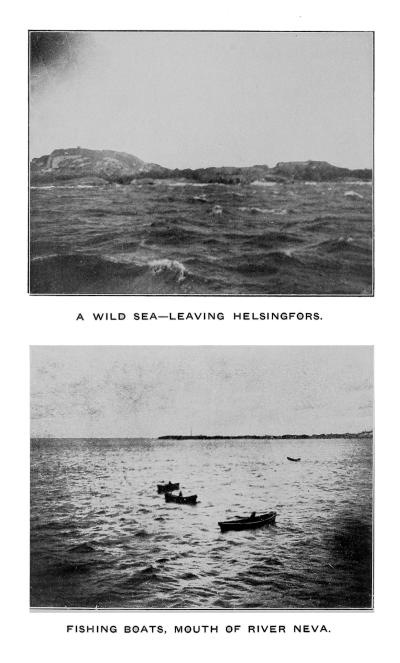
A WILD SEA—LEAVING HELSINGFORS.
&
FISHING BOATS, MOUTH OF RIVER NEVA.
We were now arrived at the pier and were ready to go ashore. Two sailors carried our small steamer trunk upon the wharf, and we were in St. Petersburg. Instantly we were surrounded by a howling mob of bearded, blond-headed, dressing-gown-coated men, clamoring for our fares. They were izvostchiks in their native kaftans. I beckoned to one of them, and pointed to our trunk. He lifted it to his shoulder and led us to his droschky,—a diminutive open vehicle, much like a small sledge on wheels. We entered it and in a moment were galloping through the streets of the city, the driver constantly shouting to his horse and yelling to all foot-farers to get out of the way. I gave him the name of our destination, Hotel de l’Europe. He seemed to comprehend my meaning, and never drew rein until we stopped before the imposing entrance of that hostelry.
We were in Russia. We had run the gauntlet of the border,—our passports had been sufficient, and we were at last safely within the dominions of the Czar. Would it be as difficult to get out?
[2] These letters were written in the early autumn of the year, 1902, and present a glimpse of Russia as it then appeared.
Grand Hotel de l’Europe,
St. Petersburg, Russia,
September 18 (N. S.), 1902.
So much has been jammed into the last two days that my pen is like to burst. Splendor and squalor, the glitter of twentieth century civilization, the sombre shadow of barbarism, are here entwined in inextricable comminglement. The city is filled with stately buildings of gigantic and imposing dimensions; with wide, straight boulevards and streets. The sidewalks and droschkies are gay with the dashing and gaudy uniforms of innumerable soldiery, and the fine dresses of elegant women. Yet many of these great buildings are in ill repair, and what you at first imagine to be magnificent stone, reveals itself to be a stucco of rotting wood and crumbling plaster; the broad thoroughfares are abominably paved, and pitifully cared for by abject wretches wielding dilapidated birch-stick brooms.
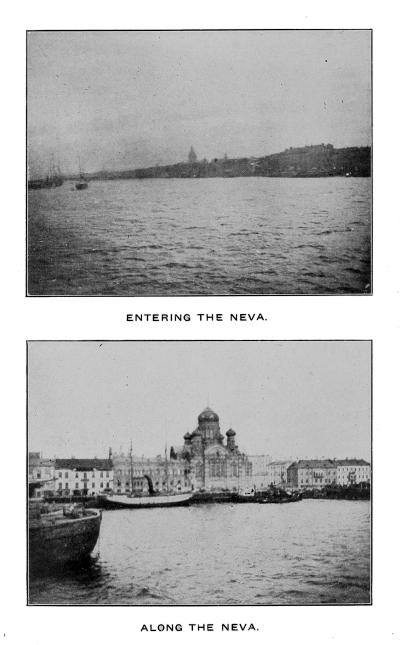
ENTERING THE NEVA.
&
ALONG THE NEVA.
The superb horses—stallions, all of them—whirl past, driven by izvostchiks in dirty, truncated plug-hats and blue dressing-gown-like kaftans, whose sodden faces tell of vodka and hopeless haplessness. Beggars swarm (frightful creatures), and the faces of the officers, fine big men in striking uniforms, are dissipated, hard and cruel.
We are in a huge hotel. Big men in uniform open the door; big men in livery fill the halls; the rooms are big, ours is immense, with double windows, It is steam-heated, and also has hearth fires of burning wood. The building is warmed all through, even the halls. There are French waiters in the big dining-rooms; there is delicious food and delightful coffee, whose aroma is very perfume of the Orient; the beefsteaks are juicy, thick and tender. We have had no such meals since leaving America. On each story there is an elaborate bar for serving vodka (a fierce white whisky distilled from wheat) and drinks to the guests of that particular floor, and a single bath room, and a single diminutive toilet for both sexes’ common use.
The moment we set foot within the doorway of the hotel, up stepped an official, in blue and gold, and demanded our passports, and we were requested also to sign a paper like the one enclosed, viz.:
| NOTICE TO THE POLICE. | |
| Family and Christian Name: | WHERE IS YOUR PASSPORT? |
| Signature: | |
| Profession: | Please order your passport two days before leaving Russia. |
| Age: | |
| Confession: | |
| Arrived from .......... | |
This to be at once filed with the police department, and the passport not to be given back until we should notify the same big official,—whose duty it was to stay right there and watch all guests of that hotel, and who must be notified twenty-four hours before we leave the city,—when he will return the passport two hours before the said time set, and give it to me only upon my paying him the government fee of ten rubles (five dollars) in good yellow gold.[3] And right outside the door of our apartments, seated at a little table, are two officials, pen and paper in hand, who set down the hour and the minute of the day we enter and come out. They were there when we went to breakfast; they, or others as fox-jowled and lynx-eyed, were also there when we returned from the theater late at night, and they are there all through the day. Our Swedish guide, who does the duties of courier and shows us about the great city, is also registered at the police department, and he has to hand in every night a written report of what he has done with us all through the day, where we have gone, what we have seen, and we suspect even what we may have said. On the streets, big sword-begirded policemen stand at the intersections of the ways, pull out a little book from their pockets and make note of our passing that particular spot at that certain hour; at night these reports also are handed in to the central police office to be checked up against the statements of the guide and the spies at the hotel.
[3] I have subsequently learned that the legal fee is about three rubles ($1.50), the charge of ten rubles being impudent graft.
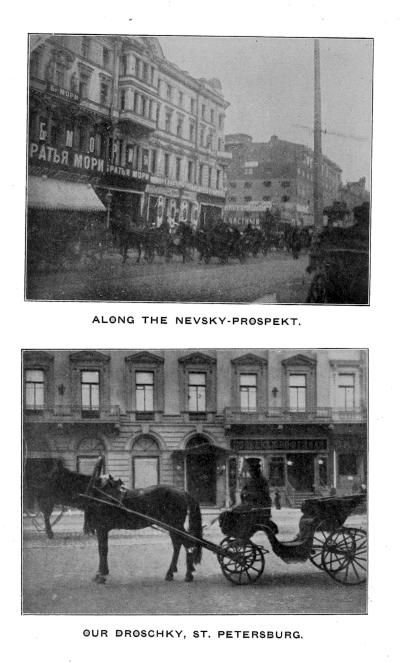
ALONG THE NEVSKY-PROSPEKT.
&
OUR DROSCHKY, ST. PETERSBURG.
We are in the capital city of the mighty Russian Empire; in the
capital created by Peter the Great amidst and upon the marshy delta of
the river Neva; a city of more than a million inhabitants; a city
spread out over vast distances; a city whose disproportionately wide
streets and boulevards are paved with wood, wood that is rotting all
the while, leaving big holes into which a horse, a team, may plunge
and disappear, because only wood will float upon the marshy mire of
the mucky islets, and stone and brick will eventually sink from sight;
a city whose top-heavy palaces and public edifices are so
treacherously set upon the sands that they must constantly undergo
costly repairs; a city builded upon foundations so unstable that the
springtime floods of the river Neva ever threaten permanently to wipe
out its very existence; a city where the palaces of the always
widening circle of the Imperial princes of the blood, and of the upper
nobility, and of the great bureaucratic chiefs, are builded with an
arrogance of dimension, an elaborateness of design, a[Pg 151]
[Pg 152] lavishness of
cost that beats anything an American billionaire has ever tried to do,
or dreamed of doing in San Francisco or New York; and yet a city
abounding in the mean, small, log and wooden cabins of the very poor;
a city where penury and poverty and dire pinch protrude their squalid
presence in continual tragic protest against the flaunted and wanton
riot of unmeasured wealth, possessed by the very few.
This morning as I walked upon the Nevsky Prospekt, the Broadway of the Imperial capital, and watched the movement of mankind along the way, and beheld the extraordinary contrasts between those who walked and those who rode; as I saw the burly policeman arrest the shabby foot-farer for nearly being run down, while he let the haughty grandee drive freely on; as I beheld poverty and wealth in such flagrant contrast, and realized that a standing army is kept ever armed and girt to protect and uphold the privilege and security of the rich; as I beheld the surly, sour, sombre faces of those who wore no gaudy covering of broadcloth and gold lace, my fancy harked back to the time, somewhat more than a century ago, when the King and Nobles of France drove through the Rues of Paris in all their glittering splendor, trampling down in their pride of power the pedestrian who failed to escape from their sudden approach. How secure they felt in their arrogant enjoyment of prerogative and rank! How contemptuously they disdained the humble claims of[Pg 153] the glitter-proletarian, of the peasant on the land! Louis XIV had cried “L’etat c’est moi.” Was that not enough! And yet, I had stood in the Place de la Concorde, almost on the very spot where, inspired by the hatred of the Sansculottes, Mademoiselle La Guillotine had bit off the dull head of Louis XVI, and cut through the fair throat of Marie Antoinette.
It may be possible for Russia and her governing men, her Bureaucratic Autocracy, yet a little while to postpone the fateful hour. By means of foreign wars it may be possible to play the old game of diverting the public mind from its own bitter ills; by promises of fair and liberal dealing it may be possible to calm the public mind—cajole it until the promises are duly broken, as is invariably the case. Whatever fair-speaking and fat-feeding officialdom may to the contrary assert, the impression I gain amidst all this splendor and pomp and glare of supreme, concentered power of the few is that, beneath this opulent exterior, deep down in the hearts and even below the conscious working of their minds, there to-day abides among the masses of the Russian people—who after all hold in their hands the final power—a profound and monstrous discontent: a discontent so deep-rooted and so intense that when the inevitable hour strikes, as strike it must, the world will then behold in Russia a saturnalia of blood and tears, a squaring of ten centuries’ accounts, more fraught with human anguish and human joy than ever dreamed a Marat[Pg 154] and a Robespierre, more direful and more glad than yet mankind have known.
We drove about the city like grandees. Our landau was just such as Russian nobles like best to use; our splendid pair of sorrel stallions pranced upon their heels and neighed and ran just as all nobles’ horses should; and our well-distended driver, of enormous and deftly-padded girth, sat belted with a big embroidered band, and guided the horses he never dreamed to hold, and helloed loudly to those who did not fly out of the way, just as would any driver of the Blood! We almost ran over some slow-moving man or woman, foot-weary wretch, at every crossing of a street!
Many palaces and public buildings we visited—enormous edifices, all of them, with innumerable and extensive halls and immense chambers finished in gold and alabaster and gaudy hues, with countless servants and lackeys in livery and lace, gold lace, to care for them, and watch over them, and fatten upon a government graft or easy-gotten fee. Suites of enormous apartments they were, which are never used and never are likely to be used.
The paintings of the great masters collected in the galleries of the Hermitage and Winter Palaces, accumulated by the Czars, are among the most renowned in Europe. The reception halls and audience chambers and ballrooms and dining halls of these palaces are designed and intended to dazzle and impress whosoever are given the chance of beholding them. [Pg 155]At the same time, the library and study of the late Czar, Alexander III, is a small and plainly furnished room, with the atmosphere and markings of a man of simple tastes, who laboriously worked, worked as no other official of the Bureaucracy in Russia pretends to work.
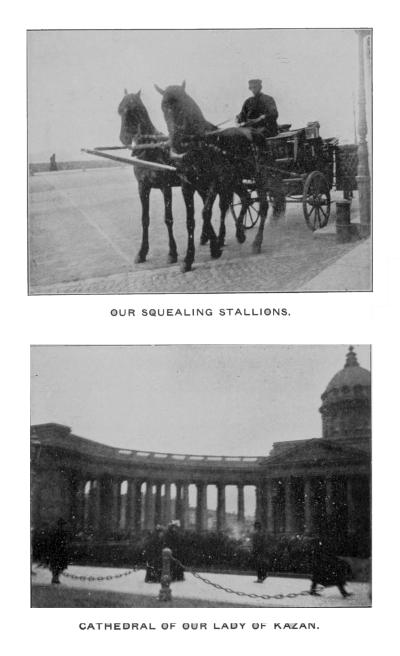
OUR SQUEALING STALLIONS.
&
CATHEDRAL OF OUR LADY OF KAZAN.
We traversed the suites of apartments used by the Imperial family, when sojourning in St. Petersburg during those portions of the winter season when the court there gathers, and we noted the outer guardrooms where night and day stand the faithful watchers with sleepless vigil, and we realized, perhaps for the first time, that this man, so steeped in power, is after all but a prisoner of the system which locks him in and binds him fast and robs him of that independence of action which you and I enjoy. He is become but a creature of the great machine that governs, a slave of the system which Peter the Great set up for the furtherance of his Imperial will, a system of government which has so developed and spread out that to-day the Czar of all the Russias is merely the puppet of its will, the tool of the greedy, grasping, intriguing, governing Bureaucracy.
On approaching the city, our straining eyes first caught sight of the gilded, glittering domes and spires of the great cathedrals and churches with which it is so abundantly supplied. The domes of St. Isaac, of our Lady of Kazan, of Alexander Nevsky, and the spires of St. Peter and St. Paul, each and all told us that whatever else we might discover, we were yet[Pg 156] entering a city and a land where the people counted not the cost of the splendid housing of their faith. And so we have found it. The wealth of gold and of silver, of precious stones and of priceless stuffs with which these churches are adorned and crammed, excels anything of which the western brain has ever dreamed. Each great church is famed and honored for its particular beneficence, its peculiar holiness, and to each one comes in procession perpetual an innumerable throng to pray and worship and to receive the blessings flowing from that especial fane. Even in the ancient log cabin, said to be the actual house erected by Peter himself, is established a shrine, where priests continuously intone the beautiful service of the Russian church and where thousands of devoted worshipers swarm in and out all the day long, and the night as well, praying to Imperial Peter’s now sainted ghost.
In the noble chamber of the golden-spired cathedral of St. Peter and St. Paul lie the white marble tombs of the Romanoffs, where is also kept up throughout the day and night yet another sumptuous service for the repose of the souls of the illustrious dead. In the great monastery of Alexander Nevsky is each day maintained a simple and splendid choral service which multitudes attend, and where the melancholy Gregorian chanting and intoning of the black-robed long-bearded monks reveal new organ stops in the human voice.
Naturally, an American has great sympathy for [Pg 157]the Russian people who have so little, while he has so much. In America we send our girls and boys to school as a matter of course. Here in the ornate center of autocracy, I have seen no building that I recognized as a common school, nor in Russia is there such a system, as we know it.
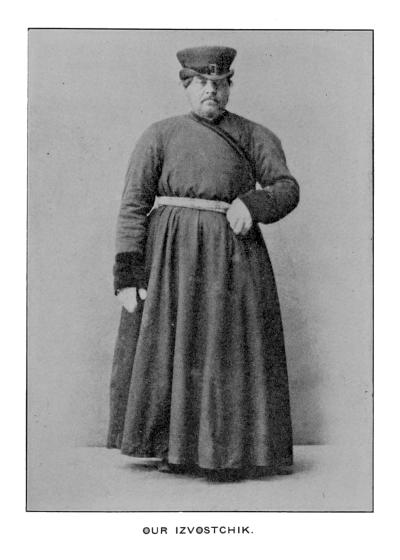
OUR IZVOSTCHIK.
To the western mind three things stand out above all else in Russia:
(1) The concentrated wealth and privilege of the few—the big grafters who have seized it all.
(2) The opulence and extraordinary power of that ecclesiastical organization, the “Holy Orthodox Church” itself an engine of the autocratic rule,—used to cover atrocious authority with gilded cassock and priestly cope.
(3) The profound poverty and hopeless subserviency of the Russian people—those who are robbed and ruined by the grafters and hoodooed by the Church.
Moscow, Russia, September 19, 1902, 10 P. M.
We took the Imperial Mail train as determined. Foreign travelers generally journey by the night express, which arrives at Moscow only an hour behind the Imperial Mail, but it leaves St. Petersburg at so late an hour that there is little chance to see the country traversed. We made up our minds to take the more democratic train, which goes in the middle afternoon and stops at all way-stations. This would give us an opportunity to see more of the people as well as a longer season of daylight to watch the passing panorama of the land. We knew no reason why we should not take the train of our choice. It was true that our guide urged us to go by the night express. It was also true, when I presented my passport to the ticket agent at the railway station, the day before, and requested tickets, that he advised us to make the journey by the night express, nor would he at first agree to sell us tickets by the Imperial Mail, but told us to come back again two hours later, when he would let us know whether there were any berths [Pg 159]unsold in the train’s through sleeper. It was also true that when we returned, he again advised us to take the night express. But our minds were made up, and we at last secured the tickets we wanted, and became entitled to an entire stateroom upon a designated car.
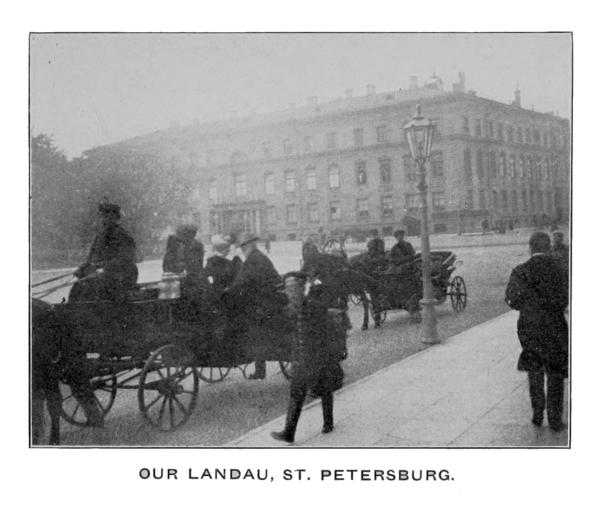
OUR LANDAU, ST. PETERSBURG.
When we left the Hotel de l’Europe, the government official to whom I had returned my passport, after having bought my tickets, emerged from his office, received graciously his ten rubles, and again handed me the document; the sundry flunkies in liveries and spies in uniforms obsequiously bowed us out of the establishment, and our very competent guide immediately packed us into several droschkies and galloped us along the Nevsky Prospekt to the huge government station of the railway running to Moscow. The instant our izvostchiks brought their horses to a stop, we were surrounded by a swarm of porters clad in white tunic aprons and flat caps, who seized our bags, and preceded us through the large waiting room to the gates admitting to the train platform. Here our tickets were scrutinized, and a group of uniformed officials, who seemed to be awaiting us, informed us that the car in which our stateroom had been sold being already filled, another stateroom in another car was placed at our disposal. They then led the way to the front of the long train, and showed us into a large combined sleeper-and-chair car immediately back of the engine. Several soldiers were standing guard near by. We were evidently expected[Pg 160] and were especially provided for. We almost had the car to ourselves. The only other passengers were a Russian officer and his orderly. We were at the head of a train made up mostly of mail cars locked and sealed, having at the rear several passenger coaches. But we were separated from all these latter, and we seemed to be objects of unusual interest. Many strange faces flattened against our windows, peering in at us, and the orderly locked up with us never took his eyes away from us. This did not annoy me, however, for I presumed he was admiring the beauty of our American women.
The train was a long one,—and such huge cars. The Russian gauge is five feet, the cars are long, and half as big and wide again as are the American cars, and are heated by steam, having double windows prepared against the cold. We had secured a whole compartment in which the two seats, facing each other, pull out and the backs lift up, making four berths, two lower, two upper, placed cross-wise. You pay one ruble (fifty cents) for blankets, sheets and towels. We put H and Mrs. C in the lower berths. Mr. C and I took the uppers. The car had only two more staterooms, one on each side of our own, and then a large drawing-room with reclining chairs. The stateroom ahead of us was occupied by the officer; his orderly slept on a chair in the salon. In the stateroom behind us were two railway guards. After we entered the car, the door was closed and locked by an official who stood on the outside. The officer and [Pg 161]his orderly were locked in with us. Our trunk was checked through to Moscow by the guide, very much as we would have done it at home. He gave me the check, and I paid him his last pourboire before we entered. This was the only daily local train going southeastward, and whoever would leave St. Petersburg for the way stations must travel by it.
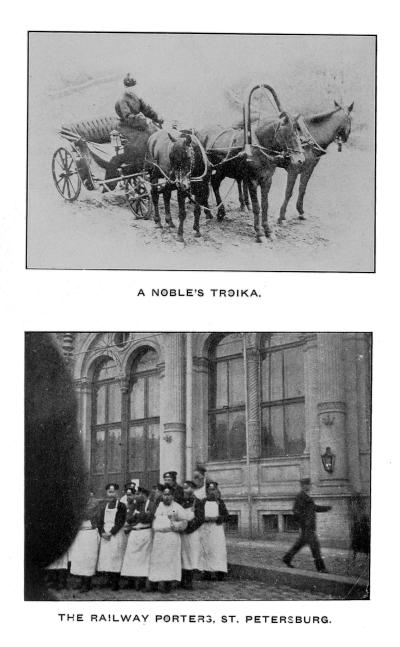
A NOBLE’S TROIKA.
&
THE RAILWAY PORTERS, ST. PETERSBURG.
Our first impression, after leaving the city, was that of the flatness and the vacantness of the land; the landscape was marked here and there with insignificant timber, birches, firs and wide reaches of tangled grasses, and seemed uninhabited. There were no sheep, no hogs, no goats. Occasionally we saw herds of cattle and some horses, but very little tillage anywhere. The few houses, mostly low built, were of small-sized logs, or slabs. Towns and villages were few and far apart. In the towns were rambling wooden buildings, all just alike; in the villages were log and wooden cabins, scattered along a single wide street, and these streets were deep mud and mire from door to door. Here and there was a wooden church painted green, with onion-shaped steeple gilded or painted white, but there were no schoolhouses anywhere. At all the railroad stations were many soldiers, and dull-looking, shock-headed peasants, men clad in sheepskin overcoats with the wool inside, and women in short skirts wearing men’s boots, or with their legs wrapped in dirty cotton cloth tied on with strings, their feet bound up in twisted straw. It was a desolate, monotonous, dreary, sombre[Pg 162] land. We saw no smiling faces anywhere, but always were the corners of the mouth drawn down. Now and then we passed a large town, with a commodious, well-built station of brick and stone. Here and there we saw huge factories and mills, all belonging to the government of the Czar.
We stopped at Lubin for supper. The guard unlocked our car, opened the door and pointed to the station, where we found a monster eatingroom with huge lunch counters on either side and long rows of tables down the middle. Everybody was standing up; there were no seats anywhere. Hot soft drinks were served at the side counters and smoking coffee and tall glasses of hot, clear tea. The Russian swallows only hot drinks and eats only hot foods. On the center tables, set above spirit lamps, were hot dishes with big metal covers. There were glasses of hot drink for a few kopeeks, which the Russian pours down all at once. Taking a plate from a pile standing ready, you help yourself to what victuals you choose. There were hot doughnuts with hashed meat inside, hot apple dumplings, hot juicy steaks, hot stews, hot fish; all H-O-T. When you have eaten your fill, you pay your bill at a counter near the entrance, according to your own reckoning. The Russian is honest in little things, and nobody doubts your word or questions the correctness of your payment. The eatingroom was full of big, tall, robust, fair-haired, blue-eyed men and a few women. The Russian is big himself, he likes big things, he thinks[Pg 163] on big lines, he sees with wide vision, too wide almost to be practical. Hanging around the station were groups of unkempt, dirty peasants. We see such groups of gaping peasants at every station, always a hopeless look of “don’t care” in their eyes.
The train ran smoothly and we slept well. All Russian cars are set on trucks, American fashion, and there is no jarring and bouncing as in England’s truckless carriages. We traveled over an almost straight roadway, traversing the Valdai hills, the brooks and rivulets of which, uniting, give rise to the mighty Volga, and crossing the river passed through the city of Tver during the night. It was just daylight when I awoke. I at once arose, and then waked Mr. C and afterward we aroused the ladies. A different military officer and a different orderly were now traveling in our car. The officer seemed to have kept vigil in the compartment ahead of our own. When I came out of the stateroom, he was standing smoking a cigarette in the aisle just outside our door. When I went to the toilet-room he followed me and then returned to the door of our stateroom. He watched us all, even standing guard at the door of the toilet-room when occupied by the ladies. We were evidently in his charge. Later, I made acquaintance with him, accosting him in German, to which he readily replied. He was a medium-sized, wiry man with dark hair and eyes, close-cropped beard and long moustaches. He was a “lieutenant-colonel of infantry,” he said.
The night before, as we rode along, we noticed many soldiers gathered everywhere at the stations. Now there were none, but instead there was a soldier pacing up and down each side of the track, a soldier every sixteen seconds! His gun was on his shoulder. He wore a long brown overcoat reaching to his heels, and a vizored brown cap. At all the bridges there were several soldiers, at each culvert two. After a few miles of soldiers, I commented on this, to me, extraordinary spectacle, and asked the colonel what it meant. “Do you not know,” he said, “the Czar is coming in half an hour? He is returning from the autumn manoeuvers in the south!” Presently, we drew in on a siding. I wanted to go out with my kodak and take a snapshot. He said, “Es ist verboten (It is forbidden). You cannot go out.” He then asked to see my kodak, which he examined with the greatest care, taking it quite apart. He then handed it back to me saying, apologetically, “Bombs have been carried in kodak cases, you know.” Soon we heard the roar of an approaching train. The ladies pressed to the windows. The uniformed attendant stepped up and pulled down the shades right in their faces. I demurred to this and appealed to the colonel, who then directed the guard to raise the curtains, seeming to censure him in Russian. The ladies might look. A train of dark purple cars richly gilded flashed by. Was it the Czar? No! Only the Court. Another train just like the first would follow in half an hour and the Czar would be on that. But none of the public might know on which train he [Pg 165]would ride. The colonel turned to me and said, “You kill Presidents in America. We would protect our Czars here! We also have Anarchists.”
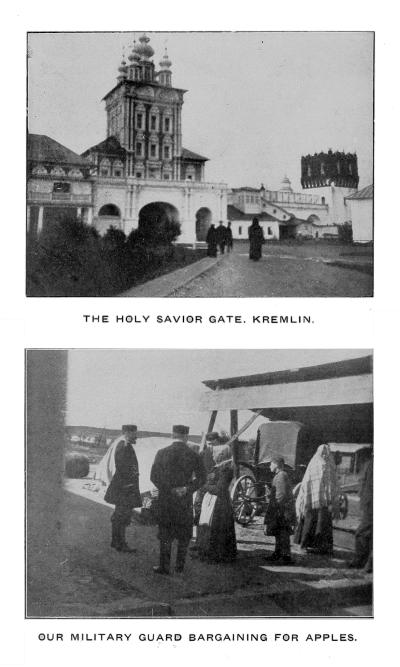
THE HOLY SAVIOR GATE. KREMLIN.
&
OUR MILITARY GUARD BARGAINING FOR APPLES.
I could not forbear remarking upon the excessive number of men in uniforms, soldiers apparently, I met everywhere in Russia, as well as the great expanse of vacant land, saying to him, “You have too many soldiers in Russia. You should have fewer men in the army and more men out on the land tilling the soil and supporting themselves. It is unfair to those who work to be compelled to feed so many idle mouths.” He answered me frankly. He said, “It is necessary to have these soldiers. The peasants are ignorant. We take their young men and make soldiers and good citizens out of them. The army is a school of instruction; it is there the peasant learns to be loyal and to shoot.” And then he said with emphasis, “Ah! In America you don’t need to learn to shoot, you are like the Boers, you all know how to shoot,” which view of American dexterity, I, of course, readily acceded to. And when I asked him why it was there were no schools or schoolhouses in all this journey, he replied that it was useless to build schools for the peasant, for he did not wish to learn. He had no desire to improve. “You in America,” he said, “are every year receiving the energetic young men of all Europe. You are constantly recruiting with the vigor and energy of the world. You can afford to have schools. Your people want schools, but the Russian people want no schools. They will not learn, they will not change, and no young men ever[Pg 166] come to Russia. We receive no help from the outside. Nobody comes here. Nobody. Nobody (Niemand, Niemand). We have always the peasant, always the peasant (Immer der Bauer).” And then he asked me about President Roosevelt, and inquired whether he would succeed himself for a second term, remarking that “Mr. Roosevelt was greatly admired by the Russian army.” “The Russian army sees in your President Roosevelt a great man,” he said, then added, “in France the Jews and financiers set up a President, but in America you choose a man who is a man.” We became very good friends, and he accepted from me an American cigar, one of a few I had brought along and saved for an emergency. At subsequent stations he allowed me to get out in his company, and even let me take his picture along with some of the other officers who stood about. The Czar had passed. The weight of responsibility was off his shoulders, he had discovered no evidence of our being conspirators. He now treated us as friends. He even directed the car attendant to clean from the windows their accumulated dust.
During all the early hours of the morning we came through the same flat, desolate, uninhabited country. It was a landscape of profound monotony, with the dark green of the firs, the frosted yellow of the birches, the withering browns of the tangled grasses, the black and sodden soil. Even the crows were dressed in melancholy gray.
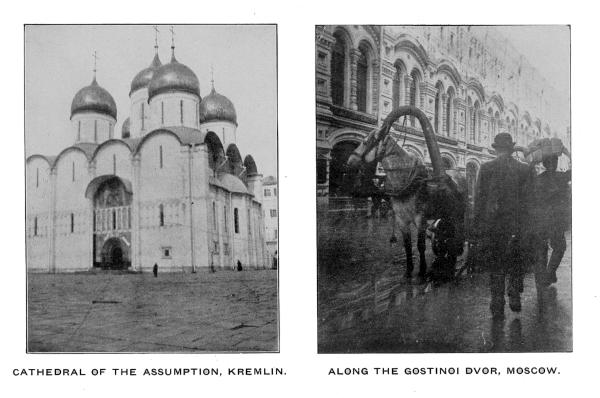
CATHEDRAL OF THE ASSUMPTION, KREMLIN.
&
ALONG THE GOSTINOI DVOR, MOSCOW.
Moscow, Russia, September 20, 1902.
It was toward ten o’clock when we drew near the suburbs of Moscow, a city of more than a million inhabitants. We saw straggling wooden houses, mostly unpainted, rarely ever more than one story high, and unpaved streets filled with country wagons, not the great two-wheeled carts of France, but long, low, four-wheeled wagons with horses pulling singly, or hitched three and four abreast; and I noted that the thills and traces of these wagons were fastened to the projecting axles of the fore wheels, the pull being thus directly on the axle, so as to lift the wheel out of the ever present mud holes. So universal has become this method of hitching up a wagon that I observed it even used on the vehicles in the cities where the streets are paved. Men in high boots and sheepskin coats and felt caps were walking beside the wagons, cracking long whips. The roads appeared to be frightful sloughs of bottomless mire.
Our train drew into a long, low, brick station, the Nicholas Depot. The door of the car was unlocked,[Pg 168] porters came in and seized our bags, and we followed them. Our military escort did not even deign to say good-bye. He was writing up his note book and seemingly preoccupied. The instant we emerged from the station portal we were surrounded by a mob of roaringizvostchiks; a pandemonium. We picked out two of the cleaner-looking droschkies; the porters who had taken our checks came with the trunks on their shoulders, and we started off for our hotel. Although a dozen izvostchiks will wrangle and war for your custom, until you fear for your very life, yet the instant you pick your man, the others retire and peace reigns. There is no attempt to make you change your mind.
The sky was overcast, drops of rain were falling, and there had been more rain earlier in the day. The cobble-paved streets were thickly overlaid with mud. Surely, they had never been cleaned in a century! Moscow is a city of low, one and two story buildings, generally of stone or stucco, but there are many of wood. It is a city full of reek and accumulated filth, and is apparently without sewers, or with sewers badly laid and long ago choked up. It is a city of narrow streets with many turns, and narrow sidewalks or none at all. It is an old city, the ways and alleys and streets of which have grown up as they would. The people we met were ill-clad, unwashed, unkempt, wild-eyed, shock-polled, dull-faced. They were a meaner multitude of men and women than I had ever before set eyes upon.
“Hotel Berlin” we said to our izvostchiks. The word “Berlin” they seemed to comprehend, and they brought us safely to our destination. It is a comfortable inn, on the Rojdestvensky way, kept by a Jew, and recommended to us by the Swiss Concierge of the St. Petersburg hotel. “It is the hotel where the drummers go,” he said. We had learned long ago that “where the drummers go,” is where the best table will be found, for the world over, the drummer loves a knowing cook. So we went to the Hotel Berlin. We were there received by a little weazen-faced, black-eyed, dried-up man, who spoke in voluble German and broken English. “The police had notified him that we would come!” he said. He told us that “He had once lived in London!”—and declared that his rooms were exactly what we wanted, and his table “the best in Moscow.” He also confided to us that he was “fortunate in having at hand, immediately at hand, and now at our service, the most skilled and intelligent guide in Moscow, who would be delighted to serve us, who was altogether at our disposal and whose charge would be ‘only ten rubles a day,’ and the guide ‘talked English.’” We thanked our host, took the rooms and accepted the guide. We have now been in Moscow several days, and the guide has been faithful. He vows he has been twice in Chicago. He says he is from Hungary and he talks excellent German, but Mr. C, who himself hails from Chicago, is quite unable to comprehend the English of his speech. Only my knowledge[Pg 170] of German has saved the guide his rubles. Moreover, his remembrance of Chicago is indistinct, as well as of New York. Indeed, his knowledge of America we are fain to believe is altogether hearsay. The nighest he has been to Chicago, we surmise, was when a few years ago he “bought Astrakhan lamb skins at Nijni Novo Gorod for Marshall Field & Company,” whose agent we believe he may really then have been. He is now married to a Russian, and it is many years since he has been back to Hungary, nor does he have much occasion to talk German or English, except when he is acting as guide to Americans. Mr. C now and then forgets and attempts to use American speech in conversation with him, when there is entanglement. I am appealed to in German, the difficulty is cleared up, and so we get on.
To-day, we have taken a landau and have driven all about the city. Just how shall I describe this strange commingling of past and present; of sumptuous splendor and squalor profounder than any seen in St. Petersburg; of modern intelligence and mediaeval superstition; this city which contains a Gostinnoi Dvor, a magnificent building of white stone, extending over many blocks, a bazaar of six thousand shops, with a single steel and glass vaulted roof covering the entire immense series of structures as well as all included streets; this city of beautiful stores, displaying the costliest products of London, of Paris and New York; which is lit with electric lights equal to Berlin, and provided with a telephone service superior to that of London; this city where right alongside this modern bazaar, the handiwork of Chicago builders, stand the towers and ramparts of the ancient Kremlin; a city where at every corner of every street, swarm bowing multitudes worshiping before the innumerable Eikons.
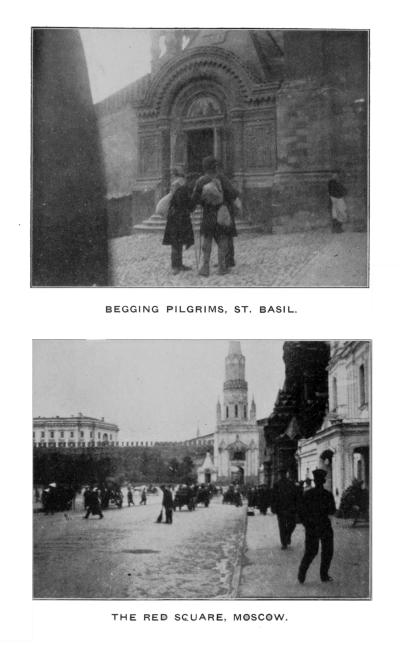
BEGGING PILGRIMS, ST. BASIL.
&
THE RED SQUARE, MOSCOW.
A strange and curious sight it is to see a street packed with people
all bowing to a little picture stuck up in the wall. The Eikon to the
Russian is even more important than the Czar. He wears a miniature
Eikon hung about his neck as a sort of amulet. He puts an Eikon in his
house, in his shop, along his streets, and builds cathedrals and
lavishes fortunes to house and adorn them. Indeed, Russia might be
fitly termed the land of the Eikon, for there, as nowhere else in all
the world, has a simple picture been exalted to become an object of
worship. The Greek church allows no images. One of the serious causes
of the great schism with Rome in the eleventh and twelfth centuries
was the strict interpretation by the Eastern Church of the injunction
of the II Commandment, “Thou shalt make no graven images,” wherefore
they declared the Roman practice rank idolatry, but to the sacred
pictures they gave their sanction. These Eikons are mostly painted in
the monasteries by monks of recognized holy lives. They are paintings
of the Christ, or of a Saint, sometimes the Virgin Mary and the Christ
Child together, and are often so overlaid with gold and jewels—tens
of thousands[Pg 171]
[Pg 172] of dollars worth of jewels—that only the eyes and the
face may be seen, the draperies of the person being scrupulously
imitated and concealed by the overlaid plates of gold.
This afternoon we saw a big, black, hearse-like carriage drawn by six black horses, harnessed three abreast, accompanied by priests, to which all the people took off their hats and bowed and crossed themselves as it passed along. It was an Eikon being carried to the death-bed of some penitent, who would be permitted to kiss it before death. Sometimes these Eikons work miracles and the dying sinner begins to recover so soon as it enters the room. All Russians keep Eikons in their homes, and generally have one in every room, before which a little candle is kept perpetually burning. And when a Russian enters a house, he at once goes to the family Eikon and bows and crosses himself before he greets his host. To ignore the Eikon would be an unpardonable offense. In St. Petersburg we procured a copy of the famous Eikon which reposes in the little chapel of the house of Peter the Great, the portrait of St. Alexander Nevsky, which Peter always carried with him into battle, and to the power of which he attributed the victory of Pultova. The beautiful cathedral dedicated to “Our Lady of Kazan,” upon the Nevsky Prospekt, in St. Petersburg, was erected in honor of victories brought to Russian arms by the miraculous influence of her Eikon. The Russian lives in an atmosphere of Eikons, and it takes a quick eye and [Pg 173]an agile hand to doff your hat and properly bow, as the Russian always does, whenever you pass by one.
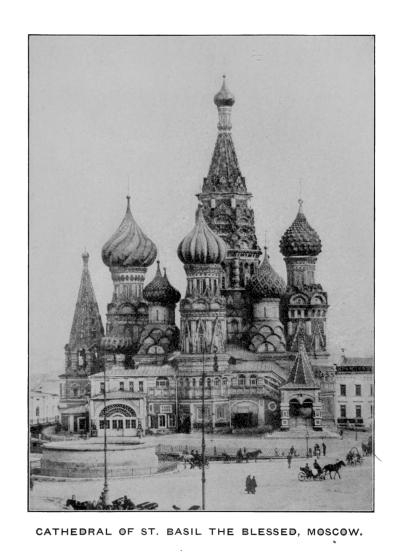
CATHEDRAL OF ST. BASIL THE BLESSED, MOSCOW.
In this city of contrasts, in sight of the modern Gostinnoi Dvor, I must take off my hat in going through a “Holy Gate,” and every man, woman and child I here meet are crossing themselves and bowing as they pass along! In Mexico you do not feel so surprised at the superstition of the Indian! But these are white men with blue eyes and yellow hair! This is a city which contains so splendid an edifice as the monster cathedral of Saint Savior, a pile of wonderful beauty, built of white granite, and domed with five gigantic onion-shaped, cross-topped cupolas, all sheathed in plates of solid gold; it is a city which contains four hundred and fifty churches, five hundred chapels, and convents and monasteries, how many I dare not say, all of them begolded and bejeweled inside and out with barbaric emblazonry. And yet it is a city, the streets of which are as ill-paved and as stinking as were London’s five hundred years ago; a city where trade and enterprise are throttled by arbitrary and excessive taxation, while the common people have no schools, even as they have no votes.
We had just left the Imperial palace of the Kremlin, the most gorgeous edifice my eyes have ever looked upon, where I had beheld such chambers of gold and precious jewels and priceless tapestry, as one only reads about in the Tales of the Arabian Nights; where the vast Hall of St. George in the Czar’s new palace is[Pg 174] plated with gold from floor to ceiling, and the ceiling is altogether of gold; where is gold along the walls, panels of alabaster showing in between, ivory finish and gold, gold and lapis lazuli, gold and emerald malachite, gold in leaf, gold in heavy plate—gold everywhere. We were but the moment come out from this stupendous display of riches. We had just passed through the Holy Savior Gate. Our senses were still dazzled with this excess of reckless magnificence, when we found ourselves upon the Red Square—“Red” because of the human blood spilled there in the countless massacres of Moscow’s citizens by past Czars,—amidst the swarming throngs of the abjectly poor; men and women, pinched-faced and hollow-eyed; men and women who toil with patient, dull, dumb hopelessness, and who are thankful to eat black bread through all their lives, who are become mere human brutes! We saw many groups of these, gnawing chunks of the black bread for their dinner with all the zest of famished wolves, while they bowed and crossed themselves incessantly, thanking God that they were indeed alive!
The wanton luxury of the rich, the pinching poverty of the poor, so widespread, so universal in Russia, appal and shock me upon every hand. What are the political and social conditions which let these things be possible is the query which constantly hammers on my brain! Until to-day, I have never understood the light and shadow of Roman history, nor what manner of men made up the hosts and hordes of Alaric and[Pg 175] of Attila. Here, you see the whole story right upon these streets.
We have not only visited the Kremlin, its cathedrals and its palaces, its museums and its buildings of note, but we have also stood before and gazed upon that wonder of all churches, the cathedral of St. Basil, the weird and gorgeous creation of Vassili Blagenoi, and lasting monument to the artistic sense of that monster-tyrant, Ivan the IV, called the “Terrible.”
In the cathedral of the Archangel Michael, within the sacred precincts of the Kremlin, lie now their coffins side by side, costly coverings of gold-bespangled velvet enshrouding each; a strange example of the equality of death. The story runs: so delighted was Ivan with the extraordinary and curious beauty of Vassili’s creation, that he gave a sumptuous banquet in his honor within the Imperial palace and there, lavishly bepraising him before the assembled company, declared that it were impossible for human mind to create another building so wonderful in all the world. Whereupon turning to Vassili, he inquired of the flattered and delighted architect whether this declaration were not the truth. The gratified creator of the wonderful cathedral is said to have replied, “Ah, Sire, give me the money and I will build you another a thousand times more beautiful than the poor work I have already done.” Hearing this, the Terrible Ivan turned to his headsman who stood ever handy at his elbow, and ordered Vassili’s[Pg 176] eyes to be immediately burnt out with red-hot irons, in order, as he declared, that there should never be again created so splendid an edifice; then, Vassili dying as a result of the operation, Ivan ordered a magnificent funeral and directed that the body be laid within the consecrated chamber of the cathedral, among the princes of the blood, where even to-day it yet remains.
Our Hungarian guide vowed that this tale was the literal truth, pointing to the coffin which lay at our feet, among the relics of the house of Rurik, as evidence incontrovertible. Nor did we presume to doubt this instance of Ivan’s cruelty, so thick spotted are the pages of history with a thousand other instances of his devilish acts.
Ivan loved the sight and smell of blood. As a boy he delighted to torture domestic animals, and to ride down old women when he caught them on the streets. As a man, he had the Archbishop of Novogorod sewn up in the skins of wild beasts and thrown to savage dogs; frequently he dispatched his enemies with his own sword, and he publicly murdered his eldest son, the Czarevitch. No malevolent scheme of the human mind was too cruel for his enjoyment. By him entire cities were devoted to destruction on the most trifling pretext. For one instance, the inhabitants of the commercial towns of Novogorod (sixty thousand in Novogorod alone) and of Tver and of Klin were massacred in cold blood under his personal supervision. He was more cruel than Nero or Caligula, and compared [Pg 177]with the appalling atrocities of his reign, Louis XI and Ferdinand VII were gentle kings.
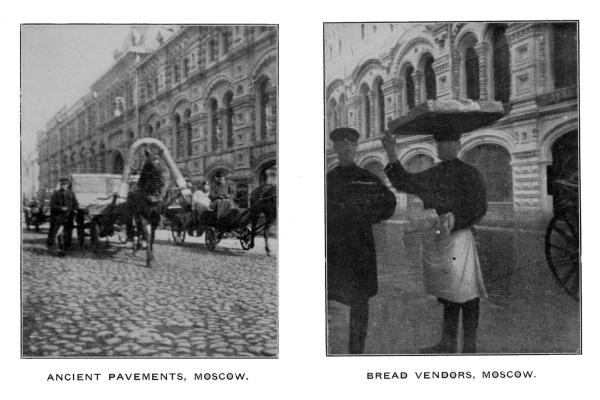
ANCIENT PAVEMENTS, MOSCOW.
&
BREAD VENDORS, MOSCOW.
His presumption was equal to his cruelty, and he did not hesitate to send his Ambassador to Queen Elizabeth to offer her the privilege of becoming his eighth bride. History knows no such other monster as Ivan the Terrible, who was undoubtedly mad; and yet he built beautiful churches and palaces, and did more to encourage art and culture within the confines of the empire than any other of the Russian Czars.
We have also driven about the city and viewed the public buildings, the shops and the markets, and this afternoon have come out across the river Moskva, and climbed the hills of Vorobievy Gory, the “Sparrow Hills,”—from the heights of which Napoleon, on that memorable fourteenth day of September, 1812, fresh from the victory of Borodino, first viewed the city. In superb panorama, Holy Moscow lay stretched before us, its towers, its spires, its red and green and blue and yellow walls and roofs, its golden domes, presenting a most sumptuous harmony of color to the delighted eye.
While St. Petersburg is the political capital, yet Moscow is the real center of Russia. Here is the focus of Russia’s industrial, commercial, financial and religious life. Her “Chinese Bank” cashes notes on Kashgar and Pekin, and sells bills of exchange upon their banks in return. The street-life of this most Russian city, the coming and going of its people, the commingling of these divers tribes and races, strikingly[Pg 178] illustrates the heterogeneous character of the cumbrous empire. Here pass me by the blue-eyed, tow-polled mujiks from the provinces; here I meet, face to face, the swarthy skins which tell of Tiflis and of Teheran; here I touch elbows with kaftan-gowned traders from Merv and Samarkand, and silk-clad Chinese merchants from the distant East.
As I stroll along the Nickols-Skaia, the Iliinka-Skaia, or the Rojdestvensky Boulevard, and catch the glances of these faces which stare upon me with constant grave suspicion, doubtful, perchance, whether I am a foreign spy in bureaucratic employ, or a stranger friendly to the held-down people, I am musing upon the curious interweaving of science and superstition, of modern and mediaeval custom, which I here behold, and I ponder how work the hearts and minds behind these masks which alone I see. Profound suspicion and discontent is the impression I receive. Nowhere do I note a single instance of that joyous hopefulness which marks men’s faces in America. The eye which here looks into mine has about it a gaze not frank and sunny, but furtive and melancholy as that of a chained-up wolf. Gradually I am beginning to comprehend that the men I look upon, although clothed in the veneer of twentieth century civilization, are nevertheless in mind and heart barbarians,—barbarians chafing beneath the bitter burden of the hateful auto-bureaucratic rule; they are Asiatic rather than European; even in discontent they lack the open-mindedness of the West; they belong to [Pg 179]the mysterious and inscrutable peoples of the East. Napoleon’s saying, “Scratch a Russian and you will find a Tartar,” now comes to me with redoubled force.
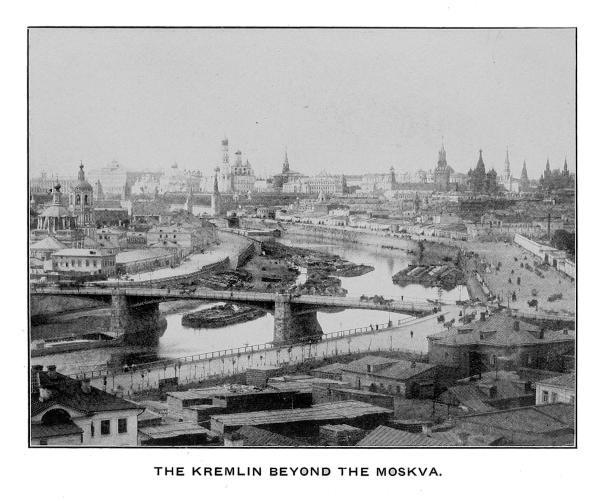
THE KREMLIN BEYOND THE MOSKVA.
Despite the French telephones and the Chicago-built Bazaar, despite the splendid churches and the gorgeous Kremlin, I perceive that these Russians are yet the same as when Byzantium sent St. Cyril and his monks to Christianize their savage ancestors thirteen centuries ago.
Moscow, Russia, September 21, 1902.
We have just been leaning over a guard rail of burnished brass, peering down into the half twilight gloom, beholding ten thousand Russian men and women bending their swaying bodies, as a wheat field bends before the wind, crossing themselves in feverish fervor, even bowing the forehead to the marble floor and kissing it rapturously in the solemn celebration of the mass.
We drove in a landau,—all four of us and our Hungarian guide,—through the narrow, crowded streets. “Drove,” I say! Rather I should say whirled, behind two mighty black Arab stallions, which no man might hold, but only guide, and we never slackened our pace until we dashed up to the great white granite stairway of the vast cathedral of Saint Savior. Our Russian driver yelled, men and vehicles fled from our path, and yet we ran over no one, we killed no one! Our furious horses stopped short on their haunches. Two Russian soldiers now [Pg 181]held them by their heads. We drove like nobles. We must be grandees!

CATHEDRAL OF ST. SAVIOR, MOSCOW.
The cathedral of Saint Savior has been nearly a century in building. Founded in commemoration of the defeat of Napoleon in 1812, it has been slowly raised by means of the multitudinous contributions of the Russian people. It is a square cross in outline, as lofty as the capitol at Washington, and surmounted by five oriental domes, the central one bigger than the other four, all topped with Greek crosses, and all covered with plates of solid gold, the burnished glittering splendor of which dazzle the eyes long miles away. Within, the interior is tiled with rare marbles of divers colors, while the walls are decorated with priceless paintings by the most illustrious Russian artists of the century, done by them at the command of the Czar, with pillars of malachite and lapis lazuli, green and blue, standing between the splendid pictures. There are altars of solid silver covered with rare embroideries of gold and emblazoned with precious stones. Close by each altar rests an Eikon.
A soldier in gold lace uniform opened our carriage door. He led us up the long flight of white steps—white in the golden sunlight—and pushed his way and ours through the bowing, crossing, sweating, stinking (the Russian really never takes a bath) thousands, who, like ourselves, sought to enter the precincts of the most magnificent cathedral of “Holy Russia.” We jostled against rich merchants[Pg 182] and their wives clad in splendid furs and silks and adorned with many jewels; against military officers in long gray coats, high boots and caps of astrakhan wool or fur; and peasants, in sheepskin coats, belted at the waist, their legs wrapped in cotton cloth tied with leathern thongs, their feet bound up in straw. These farmers from the country are too poor to afford the luxury of socks and shoes. Through all these the soldier with our pourboire in his hand, forced his way—not always gently—and led us up a winding flight of one hundred steps to the series of galleries which run round the immense interior. Here he again forced back the press of people until we might lean over the great brass rail and gaze down below! And what a spectacle! There, were ten thousand, twenty thousand,—I dare not say how many, men and women; all standing; all bowing; all devoutly responding to the intoning of the priests! Three hundred men and boys clad in red and purple and golden vestments were chanting the melancholy music of the Russian Church! No organ is there allowed, no musical instrument, no instrument save that which God has made, the human throat! Then, from the Holy of Holies, the innermost sanctuary, comes out the Archbishop of all the Russias, the Metropolitan of “Holy Moscow,” clad in vestments of gold and of silver, intoning the mystery of the mass! Other priests stand close behind him, swinging censers of incense, and also chanting in melancholy mournful harmony with the mighty melody of the choir. Never[Pg 183] have my senses apprehended such opulent, refulgent splendor, such a pageant of gold and of purple, of jewels and of fine linen, such clouds of incense, such glorious, mighty music from the human throat! Such fervor, such frenzy, such exaltation as I now beheld in the swaying, worshiping multitude! I was beholding the fervant, fanatical, hysterical religious feeling of the Russian people, a people mediaeval in their blind superstition, mediaeval in their per-fervid ardor for their church!
What I am writing of can only be impressions, and yet perhaps the impressions which I receive in my brief sojourn within the Russian Empire may more vividly portray that subtle, almost indefinable, atmosphere which broods over Russia and marks it from all the world, than I might be able to do if I remained so long within her confines that I should lose the power.
I have now sojourned in Russia barely seven days, yet I feel as though I had spent a lifetime in another world than that of America. I hear no sound which is familiar. I cannot even count in Russian. I see no street signs which my eyes have before beheld; even the alphabet, though Greek, is yet enigmatically Russianized. Nor do I find that English or Danish, French or German is of much avail. In the largest news emporium or bookstore, in St. Petersburg, upon the Nevsky Prospekt, the other day, where twenty or thirty clerks were serving the public, there was no one of them who spoke or even understood either[Pg 184] French, or German, much less English. In the chief bookstore in Moscow, where a large trade is carried on, nothing is spoken but Russian. After much search I did find one small bookshop where a clerk spoke passable French, and another where the Jewish proprietor understood German. And while it is true that the high Russian officer who escorted us from St. Petersburg spoke fluently in German and in French, and while it may also be true that among the bureaucracy, and perhaps nobility, French is still generally understood, yet it is equally true that the present tendency in Russia is to Russify language as well as things, and that foreign tongues are less spoken and less known to-day than they were thirty or forty years ago. The Russian is absorbed in himself, he knows little of the outside world and he cares less. The news of Europe and of America and of all the earth only comes to him in expurgated driblets through the sieve of the Censor. The saying that “there are three continents,” the “continent of Europe,” the “continent of Russia” and the “continent of Asia,” is no mere jest. One feels it here to be a verity. One feels that Russia, despite her pretensions to the contrary, is mediaeval, that she is mentally and morally aloof from all the progress of the present century, from all the thought of modern peoples, and utterly remote from all touch with the progressive nations of to-day.
In Scandinavia, the world is abreast of the times, its peoples are advanced and alert, but the instant you[Pg 185] cross the dead-line and enter Russia, you feel that the world has taken a back-set of five hundred years, that Russian life is so far behind all modern movement that it never can catch up.
Even the bigness of St. Petersburg carries with it an impracticability that is itself mediaeval. St. Petersburg did not grow up because there was need of a city on that spot. It was created as the deliberate act of a despot. Peter the Great feared to live longer in Moscow. He had murdered and tortured too many of its worthy citizens. He had, for one job, hung eight thousand patriots in the Red Square; he had thrown ten thousand more into dungeons, there to rot. Daring no longer to live in Moscow, he founded the new capital, “Petersburg,” on the banks of the Neva, which should become a seaport, be protected from his own subjects by the ships he himself would build, and house his government as safe from domestic as from foreign foes. He laid out the city with streets so wide that it has never been possible to pave them well. He provided public buildings so huge that it has never been possible to secure a foundation upon the Neva’s miry delta solid enough safely to hold them up. He drove the nobility into this quagmire city, and drew the bureaucracy up to its unstable ground. To-day, St. Petersburg is a city of a million and a half of inhabitants, but if the Russian Czars should choose to reconstitute Moscow their permanent capital, St. Petersburg would again become a wilderness,[Pg 186] a waste of marshy islands, desolate and bare. It is the hot-house plant of autocracy. There is no natural reason for it to exist.
Everywhere in Russia one feels the certain so childish straining after effect which is mediaeval and barbaric. In the palace of the Kremlin lies the disabled and gigantic cannon which Catherine II commanded to be cast, and which has never fired a shot for the reason that it was so big they could never find a gunner to serve and handle it. Close beside it lies the enormous bell, the “Czar Kolokol”—King of Bells—cast by command of a Czar, so huge that it could never be lifted up into a belfry and which, falling to the ground from a temporary scaffold, cracked itself by sheer weight. It lies there a fit commentary on overleaping ambition. The cars and locomotives of the railways are uncouth from their very size. Russia is like a big, loose-jointed, over-grown boy, a boy so constituted that he may never become a veritable man.
The government arsenals and machine shops in Moscow are run by German and English bosses. The Russian makes big plans, but he does not possess the power himself to carry them to successful issue. The great empire is so spread out that pieces of it are even now ready to break off. An intelligent Swede with whom I voyaged from Stockholm, then living in St. Petersburg, declared the day not far distant when not only Finland, but the German provinces of[Pg 187] Esthonia and Livonia and Courland along the Baltic, as well as Poland, must inevitably crack off. And he declared that from mere internal cumbersomeness the Russian Empire must soon dissolve. It may be so. And one is here impressed with the fact that Russia now chiefly holds together by reason of the military might of her autocracy, whose strength and permanence under serious defeat may vanish in a night.
Another thing I have become cognizant of is the fact that everywhere the men who do not wear a uniform hate the men who do. The cleavage parting the upper and the lower levels of Russian life is immense. Apparently there is no sympathy between them. The mujik upon the street scowls at the uniformed official who drives by in his dashing equipage. He looks with surly countenance upon the grandee who nearly runs him down. He hates the men who so mercilessly wield authority and power, and who order the Cossack to ride him down and knout and saber him into terrified submission.
One morning we passed through a great square in Moscow containing nothing but men—wild-eyed, long-haired, long-bearded men; men in rags, most of them, and all of them compelled to come there and wait to be hired to work. To that square must all working men go who seek work. The city feeds them while they wait, a single small piece of black bread each day. Some never leave that square, but wait there their lifetime through. They gazed upon our[Pg 188] handsome landau with hungry and wolfish eyes. How glad would they have been to tear us into pieces and divide what little spoil they might obtain! I never before beheld so frightful, unkempt a company of hopeless, hapless, hungry human slaves as these Russian workingmen who waited for a job.
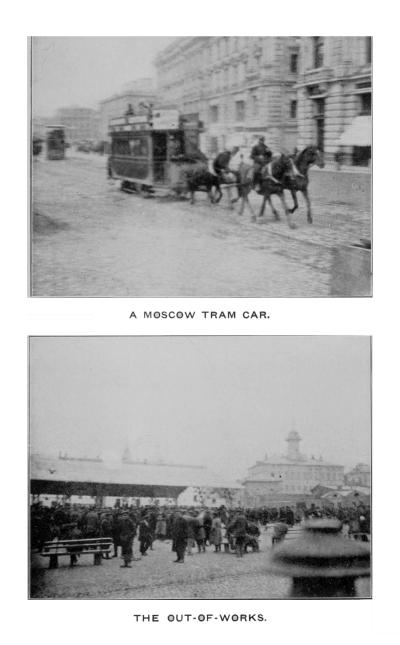
A MOSCOW TRAM CAR.
&
THE OUT-OF-WORKS.
Hotel Savoy, Friedichs Strasse,
Berlin, Germany, September 23, 1902.
“Hoch der Kaiser, Hoch der Kaiser! Gott sei Dank! Ich bin in Deutschland angekommen!” have my brain and blood and bones been crying out all the last fifty miles, since we safely crossed the Russian border. Until the moment when the last Russian official waked me up, held a light in my face, and, staring at me, compared my visage with what the passport said it ought to be, and handed me back that document to be mine forever, to be framed and hung up in my Kanawha home, and preserved for my children and children’s children as evidence that I came safe out of Russia; not till that midnight hour did I realize that I belonged to the common Teutonic brotherhood of men, and that Puritan-descended American though I were, I and my German neighbor were yet really kin! But at that moment when we crossed the German boundary, I knew it and felt it[Pg 190] in every fibre and tingling nerve. I was a Teuton, I was a German, I was come again among my blood kindred. “Hoch der Kaiser,” “Selig sei Deutschland!” I had come out of mediaevalism, from the shadows of barbarism, I was emerged into the light of the twentieth century’s sun!
We left Moscow late Sunday afternoon, in a blinding snow storm, the first of the year.
In the morning, after attending mass in the cathedral of Saint Savior, we drove about the city enjoying the cloudless blue sky, the pellucid sunshine. We visited the Gentile and Jewish markets, and watched the pressing concourse of eager traders bartering and chaffering their goods and wares; we passed along the high frowning walls of the debtors’ prison, where any man who has incurred a debt of five hundred rubles ($250) may be incarcerated by the creditor, and kept shut up as long as the said creditor puts up for him the very modest sum of about four cents a day for bread. When the creditor quits paying for his debtor’s keep, the debtor comes out, but not till then. The fare at that price is not luxurious, and after a few weeks or months of the meagre diet, the debtor joyfully promises anything to escape and, sometimes, persuades his family or friends to compound with the creditor and get him out. But some there are who spend a lifetime within those walls. And our Orthodox driver declared that a Jew liked nothing better than to thrust and hold a hapless Gentile debtor behind those gates.
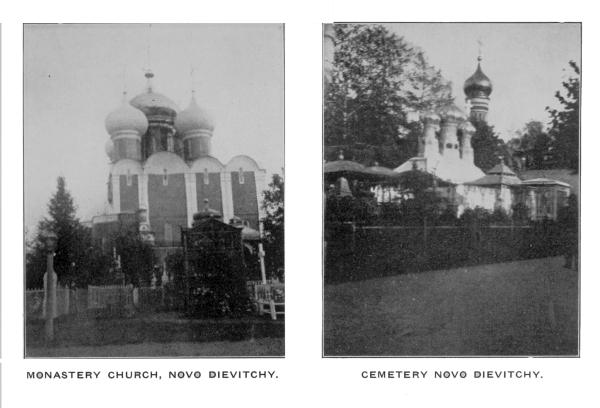
MONASTERY CHURCH, NOVO DIEVITCHY.
&
CEMETERY NOVO DIEVITCHY.
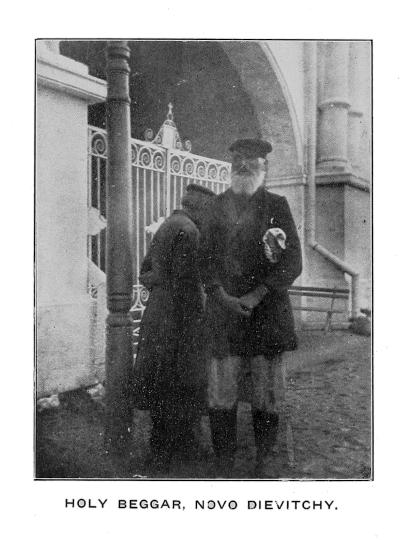
HOLY BEGGAR, NOVO DIEVITCHY.
The day was lovely and the air had almost the balminess of spring. Men and women and children were going about in summer garments, no overcoats or wraps, and it might as well have been May or June. At the same time, we noticed that the windows of our rooms in the hotel were double-sashed and tight-corked with cotton, and I also observed that similar double windows were fast set on public buildings and dwelling-houses past which we drove. But otherwise, as we looked into the soft blue sky there was no hint of approaching frosts.
It was near noon when we drove out to see the famous convent of Novo Dievitchy, and we spent a delightful hour in viewing its towered church, its cloisters, its nuns’ cells and children’s quarters, and the curious cemetery where are entombed many of Moscow’s most illustrious dead, tombs which are set above the ground amidst choice shrubbery and blooming plants. We had just come out, through the old arched gateway, and had encountered a band of holy beggars who absorbed our attention and our kopeeks. I had put the ladies into the landau, while the driver with great difficulty held back his restive, squealing stallions. My hand was on the carriage door, when I felt something soft and cold upon it. I looked up and behold! the air was full of big flakes of descending snow. The horizon to the north and east was black, the blue sky had grown a leaden gray. Winter had come to Moscow and to us as silently and as suddenly as it once came to Napoleon and his thinclad[Pg 192] army, near a century ago. There was no wind; the noises of the city were suddenly hushed; a great silence now brooded over Moscow. The air was thick with big, fluffy, fluttering particles of whiteness which stuck to everything they touched, and never melted when they ceased to fall. We could not see across the road, even the horses were half hid. Our driver gave full rein to the impatient team and we flew homeward, but the snow kept coming down just the same. It never melted anywhere. It grew into piles and mounds and soft feathery masses. It wholly concealed the scarred and rutted unevennesses of the road, it clung to twig and tree and fence, to gable, to window-ledge and lintel. King Winter had breakfasted in Archangel and, speeding across flat and unbarriered Russia, now dined in Moscow and would there permanently remain. And as suddenly all Moscow now bloomed forth into sheepskin overcoats and elaborate furs and winter wraps. The citizens must have had them hanging behind the door upon a handy peg, ready for just such a sudden coming of the snows. By afternoon, sleighs and sledges jingled along the ways and boulevards, and stinking, filthy-streeted Moscow was transformed into a city immaculate and pure. And the snow kept ever falling, falling, falling, steadily, softly, persistently, without let or stop.
It was toward two o’clock that we took our final excursion out beyond the borders of the city to the summer palace of the Czars, the favorite Chateau [Pg 193]Petrovsky, where prior to the coronation every Czar goes to repose and meditate and prepare himself with fasting and prayer for the ordeal of the tedious ceremonial in the Cathedral of the Assumption within the Kremlin.
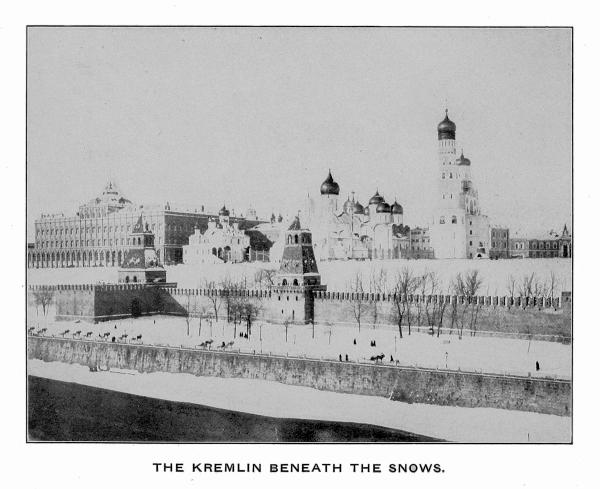
THE KREMLIN BENEATH THE SNOWS.
The Chateau is a large and rambling building of wood and brick, with extensive suites of big, bare rooms. Behind it there lies a garden, laid out as though it were in France, with many graveled walks, and beds of flowers and edges of close-clipped box. Here the Czarina loves to wander, and here she passes many a quiet hour when escaped from the pomp and pressure of life in the Kremlin’s gaudy palace. Here one bed of roses was pointed out to us as her especial joy. The old French gardener looked pathetic as he stood beside it and watched the big white flakes alighting upon each leaf and petal. “The snows are come,” he said, “the garden dies, there will be no flowers more till another year!” And then, as if to save his cherished pets, he hastily gathered the finest of the blooms and presented them to H and begged her to accept and keep them, saying, “The snows are come, the Czarina, the Empress, will not now object; to-morrow these will surely all be dead.”
In the morning of the day before, we were told that, “To-morrow, or next day, or in a week, or a fortnight, will come the snows, we do not know how soon. But when they come, then we know that winter is begun, the long seven months of winter which will[Pg 194] not leave us till May or June. It is then you should come to see us. Then are these ill-paved and reeking streets white and hard and clean; the summer’s dusts and heats are then forgot, and we quicken with the invigoration of the cold; then does the city gladden with the gay life of those returned from the summer’s toil upon the wide estates, or from foreign lands, for winter is the season when all Russians best love to be at home.”
We settled our hotel bills only after much argument with our host. We would not pay for candles we had not burned; our room was lighted with electric lights. We would not pay for steaks we had not eaten, nor chickens yet alive, nor for sweets we never tasted. No! For these and the like of these we flatly refused to pay. “De Vaiter’s meeshtakes, Mein Herr, sie shall kom oudt.” One hundred rubles for three days! Moscow was as costly as London!
Through the falling snows, thick falling snows, we drove to the Smolensk railway station, whence start the trains going west, for Moscow has not yet arrived at the convenience of a union depot. Although all railroads are owned and run by the government, yet each train starts from that side of the city nearest to the direction it will travel. We entered a long, low brick and wooden building, and passing through a wide dark waiting room, came out upon a wooden platform and were beside our train. We were ready to go. We had our tickets and our passports. Three days before, almost as soon as we[Pg 195] arrived, we gave the forty-eight hours’ notice of our intention to leave Russia, and the twenty-four hours’ notice that we should also leave Moscow. We were permitted to take our passports to the main ticket office up within the city, the Kitai Gorod, and presenting them, secured the tickets. We then returned the passports to the police department to be given back to us just before we left, by the big uniformed official at our hotel. But he did not return them until we first bestowed upon him another ten rubles, as we had done when leaving St. Petersburg! Now we were once more to surrender our passports to a new uniformed government official, the train conductor, who would also examine them, visé them, and hand them to another when we came to Warsaw, to be yet again scrutinized and stamped and only returned to us when we at last crossed the German border. Nor even then until we should be finally inspected and compared by yet other officials so as to make dead certain that we were indeed the very self same travelers who now declared they wanted to get out of Russia.
The train was a long one. It was the through express carrying the Imperial Mails to Vienna, Berlin and Paris. It would pass Smolensk, Minsk, “Brzesc” (Brest) and Warsaw. It was one of the important trains of the empire. There were many passengers, and we were able to secure only a single stateroom with two berths in the first-class car for the ladies, while Mr. C and I obtained two berths in the second[Pg 196] class car adjoining. We might sit together during the day, but for the night we would be in different coaches. The berths in our sleeper were provided each with a mattress, and an extra ruble gave us a pair of blankets, a sheet and a pillow. The cars were warm and double-windowed against the cold.
We went about twenty miles an hour over a straight-tracked road, and our sleep was undisturbed. When I awoke in the morning and made my way toward the toilet, though early, I yet found a queue of men and women ahead of me, and had to fall in line and take my turn. A big bearded Jew was just coming out of the little toilet room and a slim young woman was just going in, a young woman comely and with hair tangled and fallen down. This was bad enough, but between the tangled hair and myself stood another dame with locks quite as disheveled and unkempt. But I dared not quit my place, since an increasing number of men and women pressed uneasily behind me. My only chance was to stick it out until those coiffures should be restored to immaculate condition for the day. Within the toilet there was no soap, nor towel, nor comb, nor brush, nor else but ice-cold water, and a wide open channel down into the bitter stinging air. But I had now journeyed somewhat in Russia and had come fitly prepared.
All night we had rolled through a dead flat country, passing Smolensk, a large city of fifty thousand inhabitants, and all day we continued to traverse [Pg 197]the same wide levels. The sky was blue, the air was cold and keen, there was a slight drifting of snow across the illimitable fields. Peasants in belted sheepskin overcoats, which came down to the heels, were plowing in the fields, each behind a single horse, and women on their knees were planting, or digging out potatoes and turnips and beets. Women were also hoeing everywhere, working like the men—mostly in short skirts, kerchiefs about the head, legs swathed in cotton cloth wrapped around and tied on with strings, feet like the men’s, wrapped up in plaited straw. The houses were miserable wooden huts of only one story and with chimneys made of sticks and mud and built on the inside to save heat, and meaner than any cabins of the most “ornery” mountaineers of eastern Kentucky and Tennessee. There were no windows in the hovels, no openings but one single door. For the men and women who tilled the land, it was poverty, bitter poverty everywhere. Yet we were traversing some of the finest, richest, most productive farming lands of Russia; lands on which great and abundant crops are raised, or ought to be raised, and where these men and women ought to be living in ease and comfort by their toil, for these lands are largely owned by those who till and cultivate them, the “free and emancipated” peasantry of Russia! But the great crops are of little avail to the helpless peasant. His industry brings him no cessation of grinding toil. He barely lives, often he starves, sometimes he dies, dies of starvation right on this rich, fat land he himself[Pg 198] owns. The government of the Czar knows just what each acre of his land will yield, and knowing this, it takes from the peasant in taxes the product of his sweat and toil, leaving him barely enough to live. There are no schools to teach the peasant. The high Russian officer, the lieutenant colonel who guarded us from St. Petersburg to Moscow, said, “The peasant wants no schools.” Thus, he never learns his rights, the rights God wills to him. He keeps on toiling year in and year out, and the government of the Czar squeezes from him his tears, his blood, his kopeeks, his life! And these men I saw were white men and owned the land, fat, fertile land, rejoicing ever in abundant crops!
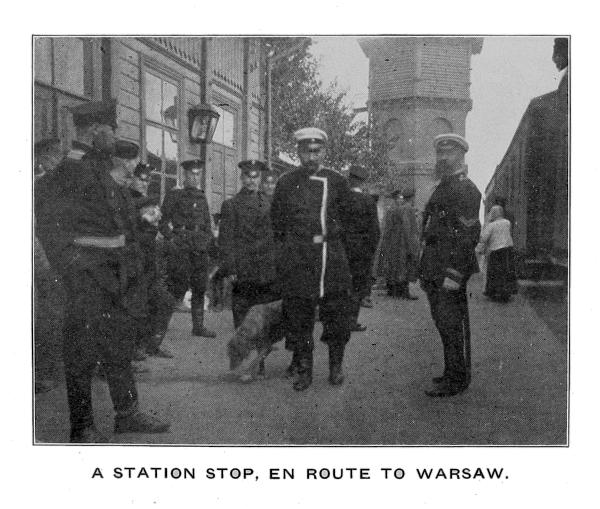
A STATION STOP, EN ROUTE TO WARSAW.
A century ago, even thus were also the peasants of France ground down and pillaged by the King, the nobility, the government of the state. As I traveled through the fruitful valley of the Loire two years ago, crossing central France, and beheld the smiling fields and well-planted meadows and perpetual cultivation of every foot of soil, until the whole land bloomed and bore crops like one mighty garden, I could not help wondering, as I looked upon the smiling countenance of the terrain, and upon the contented faces of the sturdy and thrifty peasantry who owned and tilled it, whether this present fecundity and agricultural wealthiness of rural France, does not, after all, repay the world and even France herself, for the terrors and the tears, the blood and the obliteration of the l’ancien régime, whose expungement[Pg 199] by the Revolution alone made possible to-day a regenerated and rejoicing France.
We have passed through Minsk, the ancient capital of Lithuania, a city of more than one hundred thousand inhabitants of whom more than half are Jews, and through Brzesc (pronounced “Brest”), another city as big as Smolensk and renowned as a fortress, taken and retaken, lost and relost, through all the weary centuries of Polish-Muskovite wars. We have crossed the river Bug (“Boog”) on a fine steel bridge, and entering pillaged Poland, are now arrived within the borders of her great capital, Warsaw (“Barcoba,” “Varsova”), where we change to a train of German cars, of the narrower German gauge, and go on to Berlin.
Just after leaving Minsk, I fell into conversation with a most intelligent young Jew from Warsaw, who, among other things, spoke of Russia and her ways, saying that, strange as it may seem, the people of Poland prefer her harsh rule to the fairer dealing of the Germans, for the reason that Pole and Russ both talk a Slavic tongue, and race affinity constitutes a bond. Yet said he at the same time, all Poles dream of the day when a Polish King shall again fill a Polish throne, and the glories of their Fatherland shall be restored.
We reached Warsaw only two hours late and pulled into the large stone station close alongside the Berlin train. The porter grabs our bags. Our small steamer trunk is shown to hold no vodka, nor contraband[Pg 200] effects. “Nach Berlin,” I shout, and we are transferred to a clean, comfortable German car. Gott sei Dank! we feel a thousand times. We are almost free, almost escaped, almost beyond the Russian pale. For a fortnight, we have been under constant, conscious, persistent surveillance. Our guides have been in the employ of the police; strange men have followed us about upon the streets, have sat beside us in hotels, have scrutinized us with cold eyes upon the trains. We have been under the direct guard of armed soldiers, who have stood outside our stateroom door and slept beside us all the night. We have never, since entering Russia, been free from the weasel-wit and ferret-eye of incessant espionage!
And the dirt! Dirty cars! Dirty hotels! Dirty carriages! Dirty streets! Dirty churches! Dirty palaces! Dirty men! Dirty women! Such is Russia, a land where the world knows not water, except to skate upon when turned to ice.
Now we are in a German car, immaculately clean! Clean, almost, as it would be in Norway! We are in the modern world again. I feel great pressure in my heart to “Hoch der Kaiser”, and this despite the fact that, like every right-minded American, I am bred to abhor the assumptions of Hohenzollern Kaisership even as strenuously as Romanoff Autocracy. Yes! I feel great impulse to Hoch der Kaiser and to cheer for Germany and my German kin.
Now that I have had a glimpse of Russia, you ask me, “Why is the Slav always so eager to do to death the Jew?” Wherefore this hatred which so constantly flames out in grievous pillage and wanton murder and blood-thirsty massacre of the children of Israel?
You say to me that in America for two centuries we have had the Jew; that we now have millions of Jews, and that they are patriotic and loyal citizens of the Republic; that Jews sit in our highest courts and render able and fair decisions, enter the senate of the United States and sit in congress, are sent to West Point and Annapolis and prove themselves devoted and efficient officers of the army and navy, are lawyers and doctors and distinguished members of the learned professions; that they display intelligence, industry and thrift, and are among the foremost citizens of the Republic, and that many of these Jews, or their fathers and mothers, have come direct from Russia. And you ask me “Why is it then that within the dominion of the Czar the Slav makes such constant war upon the Jew?”
If I were briefly to sum up my impressions of the real cause of the Slav’s hatred of the Jew, I should say, jealousy and envy, and then ask you to remember that the Slav is yet at heart a semi-Asiatic and a barbarian.
When journeying from St. Petersburg to Moscow the Russian lieutenant-colonel said to me: “In America you select real men for Presidents of whom Roosevelt is the finest type, but in France the JEWS and financiers set up their tool for President.” In a nut shell this high Russian officer expressed the feeling of his own race toward the Jew. The Jew is a Jew and the Jew is a financier. The Russians are jealous of his acquired wealth and of his ability to gather it and they hate him.
A few days later, traveling from Moscow to Warsaw, we found ourselves sitting in a dining car with an elaborate bill of fare before us and yet we were like to starve right then and there. The menu was printed in Russian; the attendants and waiters talked nothing but Russian. We knew no Russian and spoke in English, in German, in French, in Danish without avail. The servants just stood there shaking their heads and saying, “Nyett, Nyett.” (“No, No.”) We were famishing but could order no food. Just then a tall woman of courtly manner, elegantly gowned, came toward us from another table and said in perfect English that she had long lived in London, though now she resided in Russia, and then, giving our orders to the waiters, she saved us from impending[Pg 203] famine. She afterward told me that her passport had lapsed, and that the Russian Government now refused to let her leave Russia because she was a Jewess, while at the same time, they forbade her to remain longer in Moscow, she having recently become a widow, and under the harsh laws of Russia thereby lost her right of domicile within the city. She hoped to escape to America by bribing the officials at the border.
At Vilna, I fell into acquaintance with a young Pole from Warsaw, who spoke seven languages and among them German and English fluently, although he had never been outside the dominions of the Czar. He was a strict Jew, and he expressed great surprise when I assured him that in America a Jew is treated just the same as a Christian. He said he had heard that to be indeed really the fact, and he expressed the intention of some day coming to America to see for himself. He seemed both perplexed and gratified when he found that I showed him the same consideration I did my Gentile acquaintances.
In Moscow we drove past the imposing front of the great Jewish Synagogue. The doors were barred. The structure was falling into decay. I learned that it had been closed for nigh twenty years by order of the Imperial Governor of Moscow, Prince Vladimir, uncle of the Czar; nor might any Synagogue now be opened in Moscow; nor might any Jew now worship in any edifice; nor might any outside Jew now come and live in Moscow; nor might any Jew living in Moscow come[Pg 204] back if he had once left the limits of the city; nor might he own any land in the city, nor practice a profession; nor might he marry a Christian, nor might a Christian marry him. The Jews were also subjected to extra and particular special taxes, arbitrarily levied and collected by the autocratic government. The Jew, right here in “Holy Moscow,” soul and heart-center of the vast Russian Empire, was pillaged under the autocratic rule of the Czar, persecuted under the hand of the Holy Orthodox Church, plagued and preyed upon by a perpetually jealous and malevolent populace.
The Russian army officer sneering at Monsieur Loubet, President of France, whom he called the “tool of Jews and Financiers;” the courtly Jewish lady; the intelligent Jewish merchant of Warsaw, who was so much astonished that I should show him the courtesy of an equal, the lowly izvostchik driving me in his droschky and pointing out the closed and moldering Synagogue; each and all discovered in their divers ways the attitude of the Slav toward the Jew; and the officer revealed in his criticism of the ruler of Russia’s ally, the Republic of France, the real underlying secret cause of the Russian’s animosity and hatred of the Jew. That cause of hatred is the Jew’s ability to prosper without and in spite of the fostering care of the autocracy.
The Jew was a cultivated citizen-of-the-world when the Slavic ancestors of the Russian were unlettered nomads roving the illimitable wastes of Scythia. In [Pg 205]the temples and libraries of ancient Egypt the Jew acquired the culture and the learning of the Pharaohs; amidst the palaces and hanging-gardens of Imperial Babylon and Nineveh the Jew learned the arts and the sciences of the Assyrian and Persian; Plato and Aristotle and the Greek philosophers recognized in the Jew a spiritual culture of exalted type, and granted him to possess a learning as encompassing as their own; the Roman, practical, and master of the then known world, paid homage to the cultivated intelligence of the Jew.
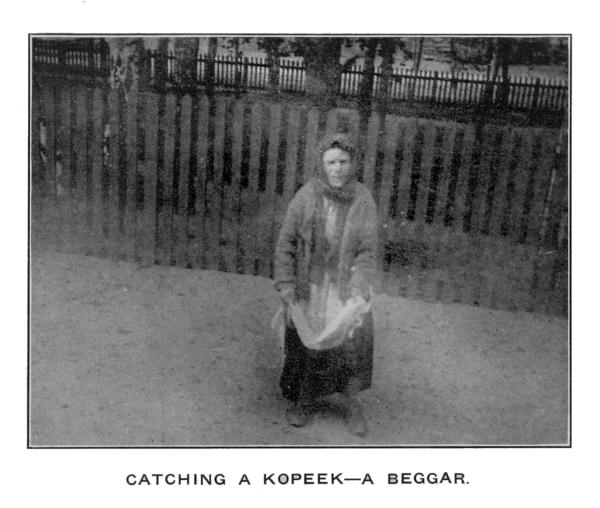
CATCHING A KOPEEK—A BEGGAR.
The monotonous plains of Russia were yet filled with nomadic hordes of pagan barbarians when Cordova was a paved city, its streets illuminated by night, its libraries and its University the center of the most advanced learning of the age; when the gigantic and splendid cathedrals of England and France were everywhere raising their mighty walls and spires for the perpetual glory of God and the inspiration of mankind; when the fleets of Lisbon and Genoa were discovering the farthest and most distant splendors of the Orient and Occident; when Venice was mistress of Byzantium and Florence patron of Rome; when Hebrew savants, under the benign influence of Saracen rule, were among the most learned and renowned leaders of Moslem science; when the Israelites of Italy and France were intermarried among the proudest of the nobility and were even counselors of Kings; when Hebrew learning and Hebrew wealth gave added momentum to the impulse of the Renaissance.[Pg 206] While during the centuries of the world’s reawakening, even as during the preceding centuries of the Crusades, just as throughout the long duration of the dominion of Rome and of the Eastern Empire, the Jew was ever recognized for his learning, culture and wealth.
When St. Cyril and his Byzantine monks, in the seventh century, gave Greek Christianity to the Russian Pagan, the Russian yet remained content with outward forms and ceremonies. He continued pagan at heart and persevered in worshiping the ancient ghosts and spirits, even as in many parts of Russia he does to-day. He put on a Christian coat, but he kept his pagan hide; and the Russian Orthodox Christian has always remained a semi-pagan.
The great mass of the Russian people were serfs sold with the land up to 1860, when Alexander II gave them nominal freedom, but a freedom without lands and without schools; a so-called freedom which has left the individual peasant, the mujik, as landless, as bitterly poor, as benightedly ignorant to-day as he was a thousand years ago; nor does the autocratic-bureaucracy of the Czar give him hope of a better day. I journeyed through some of the richest farming lands in Russia, and the farmers, the mujiks, whom I saw tilling the soil, plowing and digging in the fields, were so poor that their feet were wrapped in plaited straw, too impoverished to afford the luxury of a leathern boot! The government absorbs all the profits of the crops in payment for these[Pg 207] lands and in taxes, as return for having made the mujiks nominal owners of the soil and emancipating them from serfdom.
On the other hand, the nobles are forbidden by caste spirit and tradition to enter into any career except the service of the state. The younger nobles and ruling breeds among the Russian people are all sucked into the employ of the state by the maelstrom of bureaucracy. The youths of the nobility and gentry, and the more or less educated classes, must enter the navy, the army, and the service of the state. A government job for life is their only hope. They are not permitted to make money for themselves independently; they can only make money for the government of the Czar and for themselves through “Graft.”
The government wishes to do everything in Russia. It deliberately invades the spheres of private enterprise; it deliberately seeks all the profit; it deliberately destroys the ambition and the power of the person; it deliberately annihilates and stifles individual initiative. In Russia, the government runs all the railroads, most of the mines, many of the iron mills. It raises cotton; it raises wheat; it farms and it manufactures. It buys and sells. It runs all the telegraphs and telephones and express business. It opens all private letters and reads all the printed books and newspapers. It permits no letter to go through the mails, nor book nor newspaper to be read, which it deems to express sentiments inimical to the[Pg 208] supremacy of the autocracy. I was threatened with imprisonment in Russia for snapping a kodak without government permit. I was under police and military supervision and escort all the time I traveled in Russia, even short as it was. Nor did I dare to send a letter to America from Russia, but wrote my thoughts with locked doors, and mailed my writings only when safe beyond the eye of the Russian government spy.
Thus we find that, on the one hand, the peasantry are crushed, thrust down and pitilessly held in ignorance and superstition and bitter poverty; on the other hand, all the best ability and brains of the governing classes are commandeered into the army, or navy, or life-long government service, and with meager salaries and small pay. The big grafts, the soft snaps, the juicy chances must all belong to the government and flow into the coffers of the Czar to keep fat and easy the Imperial family and the swarms of parasitic tid-bit hunters who leech them.
But even in autocratic Russia, the grasping clutch of autocracy cannot hold up all the avenues of commerce, however far-reaching its embrace may be. Hence, in those lines of enterprise, not absorbed and appropriated by the government, there is left open a clear path to whosoever may have the acumen to seize the opportunity. Here is the chance of the Jew. Endowed with a keen and subtle intellect, educated by his own masters often to the highest training of the intelligence and disciplined by the hard[Pg 209]ships of persecution, he is at once an overmatch for the ignorant, brutal, poverty-haunted mujik, and fully the equal of the best breeds of governing Slavs. Those intellects which are the equals of his own are not in competition with him. The ablest of the Slavs are earning a small salary in the army, in the navy, or as government officials; making what they can for themselves by more or less open graft, it is true, but without the incentive of other personal gain. So the Jew gets on in Russia. This progress is in spite of the jealousy and the hatred and the pillaging hand of the envious Slav.
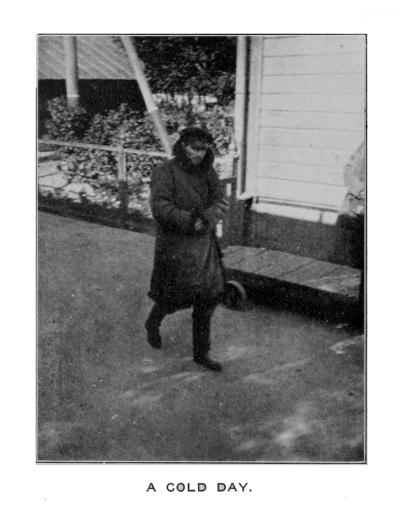
A COLD DAY.
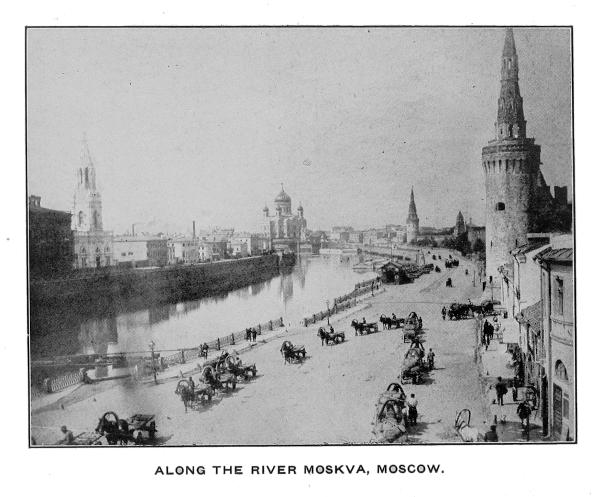
ALONG THE RIVER MOSKVA, MOSCOW.
There is, here and there, considerable wealth among many of the Jews in Russia. This is not true of all the Jews. Most of the Jews are poor, frightfully poor, made and kept so by the laws; but there is wealth among some of the Jews. The few wealthy Jews do not always keep these riches within the dominions of the Czar. The Russians complain that the rich Jews, while making their money in Russia, yet lay it up in the banks of Berlin, of Vienna, of Paris and particularly of London. When a Russian Governor wishes to squeeze a little extra pocket money out of the Jews of his district, his city, his province, he cannot always lay hands on their money hoards. Sometimes, then, he lets the street urchins plague them a little; the squeezed and squalid peasant is allowed to vent his envy of their wealth, even to knocking a Jew down; now and then, these meanly-minded boys, these pinch-bellied peasants get out of[Pg 210] hand and, stung by their blood lust, too hastily massacre more Jews than the Governor intended. This is about the size of the job that Governor Von Raaben found to his credit in Kischineff. The poor Jews suffered for the prosperity of their rich brethren. The embittered and down-crushed mujik, galled and soured by reason of his own hapless and seemingly hopeless condition, vented his spleen at the first handy object, and the Jew was handier, though not more hated, than the uniformed official of the governing autocracy.
The Russian, as an individual, is of a kindly nature. He is good to his wife, good to his children, good to his beasts. He has none of the Roman-Spanish pitilessness to dumb creatures. But the Russian, after all, is an Asiatic. The old saying, “Scratch a Russian and you’ll find a Tartar,” is as true to-day as when the Cossacks of Catherine II impaled and crucified men and women and children of the fleeing Mongol horde, when these simply sought to migrate beyond the hectoring reach of Russian rule.
No bloodier chapter mars the annals of history than that of the Russian slaughter of nigh the entire Tekke Turkoman race in her warfare of 1881 on the shores of the Caspian, at Geok Tepe, when seven thousand women and children were stricken down in cold blood as they fled from Kuropatkin’s ruthless Cossacks.
Nor is the world done shuddering yet at the atrocious barbarities under General Gribski, Governor [Pg 211]of Blagoveschensk, who commanded the deliberate drowning of the Chinese inhabitants of that city but a few years ago, in 1898, and in a season of prevailing peace, drove them before the knouts and bayonets of his Cossacks into the hopeless waters of the river Amoor by unnumbered thousands, old men and women and little children, so that for many weeks, nay months, the great river was so choked with the swollen bodies of the dead that navigation was at a standstill.
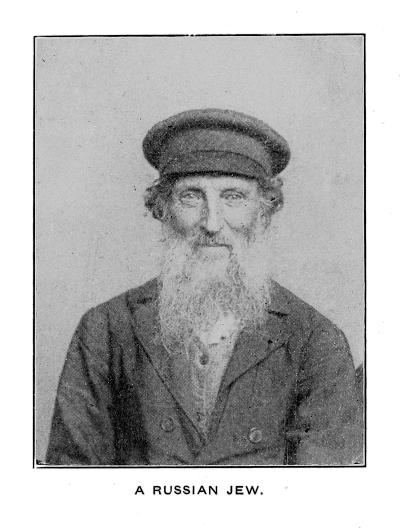
A RUSSIAN JEW.
No Roman sack and pillage of a conquered city, not even the taking and wreck of Jerusalem by Titus and his legions, equals in horror and cold blood these late Russian slaughters; not even the fire and sword of Attila and his avenging Huns wrought such woe and terror as have been wrought in these recent years by the servants of the Czar; nor are the tormented souls of Alva and his Spanish veterans more deeply marked with blood-soaked scars than is the Russian autocracy of to-day; nor mediaeval, nor modern times, nor pagan, nor Moslem warfare, have known so monstrous a series of godless massacres of helpless humankind as those now standing to the credit of the Russian autocracy during the last twenty-five years.
The crime of Kischineff is no more heinous than have been the slaughters of Geok Tepe, Blagoveschensk and a thousand lesser human killings, nor more heart-sickening than were those awful visitations of Slavic blood-lust upon creatures defenseless, helpless, abjectly terror-struck. It is only that it was[Pg 212] committed in a season of profound peace, against a peaceful people, and at a time when all the world had the leisure to hear the dying wails of the hapless women and helpless children raped and ravished and torn asunder in the open day.
Notwithstanding these crimes which mar the pages of recent Russian history, none would be more astonished than the Russian himself, if he were made aware of the world-wide condemnation these crimes provoke. He would protest against so harsh an estimate of Russian conquest; at most, when confronted with the facts, he would shrug his shoulders and urge that the responsibility lies not upon Holy Russia, but upon those who oppose her destiny to conquer and absorb. The thoughtful Russian will declare that after all it is no more than the inevitable struggle of the survival of the fittest, and demonstrate that there are no feuds of race, other than the universal hatred of the Jew, within the dominions of the Czar.
From the Russian viewpoint these arguments are not unreasonable; the vast military establishment upon which rests the autocracy, necessitates foreign wars with weaker peoples, if for no other reason than to keep a busied soldiery from thinking too much upon grievances at home; through commercial expansion in Asia, won by bayonet and sword, the autocracy has sought to secure compensation for the suppression of commercial opportunity at home!
The problems of Russia are, after all, economic rather than racial, and it is up to Russia to solve these [Pg 213]in accordance with the lessons and example of the enlightened nations of the west; let the nobility and educated classes, who are now sucked into and absorbed by the bureaucracy, take full part in the commercial and industrial life of the empire and receive full reward for the exercise of their energy, intelligence and skill; let them lift from the mujik the crushing weight of the Imperial taxes, divide with him the almost illimitable acreage of the Imperial domain; and leave to him his fair share of the earnings won by his sweat and toil, and there will be no more Geok Tepes, Blagoveschensks, nor Kischineffs, nor will there be longer hatred of the Jew.
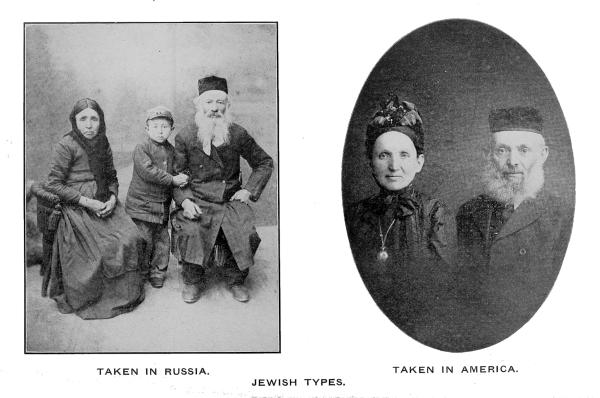
TAKEN IN RUSSIA—TAKEN IN AMERICA.
JEWISH TYPES.
London, England,
Hotel Russell, September 27, 1902
Crossing the Russian border in the night, we arrived at Berlin almost before the dawn; the city lies only three hours (by train) beyond the Russian line.
The station we entered was spacious and clean, in sharp contrast to the dirty stations of Russia; we were evidently come into a land blessed with a civilization of higher type. Leaving the car, we were instantly beset by a regiment of smartly uniformed porters—old soldiers all of them—and were piloted by one tall veteran to a waiting fiacre, which soon carried us to the Hotel Savoy. It was early, not yet five o’clock, but the streets were already alive with an orderly and animated throng, who appeared to be workmen largely, carpenters, masons and day-laborers, each clad in his distinctive laborer’s garb. They were on their way to work, for the working day is long in Germany, ten and twelve hours, and the workingman is up betimes. [Pg 215]We passed over asphalted streets where men in military-looking uniforms, with hose in hand, were washing down their surfaces, while others with big coarse brooms were sweeping them clean. Berlin is a clean city, clean and neat as the proverbial German in America is known to be. Alighting from our carriage, I was greeted in my own tongue, by the friendly mannered concierge, who instantly marked me for an American, and gave us comfortable quarters such as American dollars usually secure.
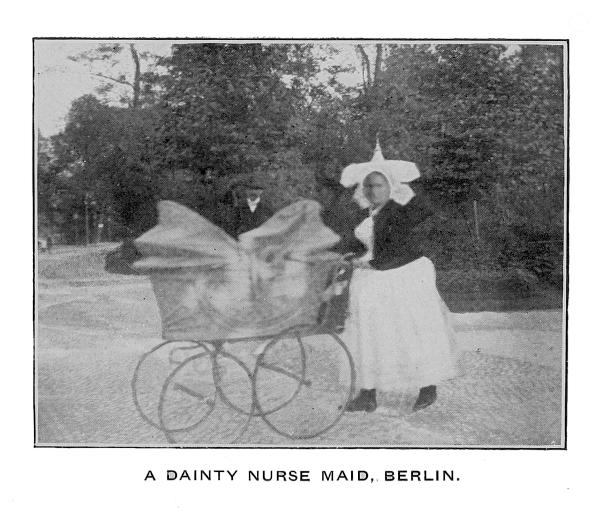
A DAINTY NURSE MAID, BERLIN.
H and I were now alone, our companions, Mr. and Mrs. C having left us at Warsaw, where they would spend a week or two and learn something of Poland. Perhaps I might tell you right here, that the next morning, as we were leaving the hotel, I felt a hand upon my shoulder and, turning round, faced the two Chicago travelers just then arrived. They had cut short their stay in Warsaw, for the only American-speaking guide in that city was away on a vacation, and German and French to them were as impossible as Polish. They confessed, also, that they had sorely missed their American fellow-travelers, and had hurried after us, hoping they might induce us to sojourn a little while in their good company.
We spent our single day without trying to see museums and picture galleries, but taking a guide and a carriage, drove about the city and viewed its avenues and parks, its markets and busy thoroughfares, and noble public buildings, to catch what glimpse we might of the waxing Capital of the German Empire.[Pg 216] The first impression Berlin makes upon the stranger, especially the stranger new-come from Russia, is that of its cleanliness and orderliness; and, I think, I here also felt the sympathy of blood-kinship with the well set-up and neatly clad men and women, whose faces might have been those of my fellow countrymen of St. Louis, Cincinnati or New York. Berlin, to-day, fitly typifies modern Germany and the modern German spirit. We drove everywhere over smooth streets, kept scrupulously clean. On either hand stretched miles of new and handsome buildings, modern in architecture and modern in construction, while the signs I saw were in Latin Text, instead of the Gothic, a striking evidence of German progression.
When we came to the lovely Unter Den Linden, we left the carriage and wandered beneath its umbrageous trees and enjoyed, as every one must, the beauty of its vistas of greensward and carefully tended flowers. The German loves his flowers almost as devotedly as does his English cousin. We strolled also along the famous Thier Garten, which would be a magnificent boulevard in any city; and which the German Kaiser has sought to ornament with innumerable ponderous groups of sculpture, preserving for the astonished world the commonplace memories of paltry ancestors. How much better would it have been to have adorned this stately thoroughfare with statues of illustrious Germans, whose great deeds and works have contributed to the world’s enlightenment and the Fatherland’s renown! To a Democrat, bred[Pg 217] to contemn the empty glitter and pretense of inherited privilege, it almost stirs one’s anger to see so splendid a public highway as the Thier Garten thus arrogantly defaced.
In this Capital of an Empire, whose foundation is set on bayonets and swords and the “biggest guns,” where militarism runs riot, there is no surprise in finding the streets filled with soldiers and officers, and to meet frequently a marching company, nor does it astonish one to see here the extreme development of the spirit of military caste. Here, the civilian, man as well as woman—no matter how well clad he or she may be—must turn aside for strutting officer and also, as for that, for the common soldier, and all traffic must hold back to let a company of soldiery pass by, even though they are out only on errand of trivial exercise. Here in Germany, perhaps as nowhere else, have the clever supporters of Royal and Imperial pretension worked the army racket to the limit, through creating a perpetual scare that greedy neighbors will devour the Fatherland. The citizen of Berlin is never allowed to forget that little more than a century ago, Cossack hordes pastured their ponies in the parks and gardens of the German capital; and can gallop there again from their Polish camps in a single day. The army has been built up on the pretense that it is necessary for national defense, and thus the Kaiser, who is permitted to occupy the position of army chief, holds at his command these enormous military forces, while he uses[Pg 218] them the rather to exalt his own prerogative and subvert the people’s inborn rights of individual sovereignty, which is the highest gift of God to man.
The splendid building of the Reichstag, where the Socialist party of Germany, to-day, makes its almost vain attempt toward securing to the people a freer exercise of man’s natural rights, is thus menaced by the colossal military group which stands before it, as though to teach the lesson that the sword still rules the Fatherland.
In the evening, our guide, who had privately confessed to me that within the year he would travel to New York there to become manager of a great hotel, led us to one of the more notable Bier Garten, where we saw a most German vaudeville, the feats of whose performers were greeted with vociferous hochs, and where we listened to a splendid band, and where H had her first sight of ponderous Germans absorbing beer, with which spectacle she was much impressed.
Wednesday, we were early astir, driving to the Hamburgischer Bahnhoff, where we took the fast nine o’clock express for Hamburg, and flew along over a well-ballasted road-bed through a dead-flat country, in what the Germans proudly call their “fastest” train. The panorama was one of market gardens and intensely cultivated land. It was a monotonous prospect, where the alikeness of the vistas was emphasized by the sentinel stiffness of the ever recurring rows of Lombardy-poplars. As in Russia, men and [Pg 219]women were everywhere working in the fields and gardens, but unlike Russia, they were well clad and well fed, and bore an air of thrifty contentment. There was no dilapidation anywhere. We saw no longer the tumbled-down shacks of the mujik, but everywhere substantial, neat homesteads of brick and stone.
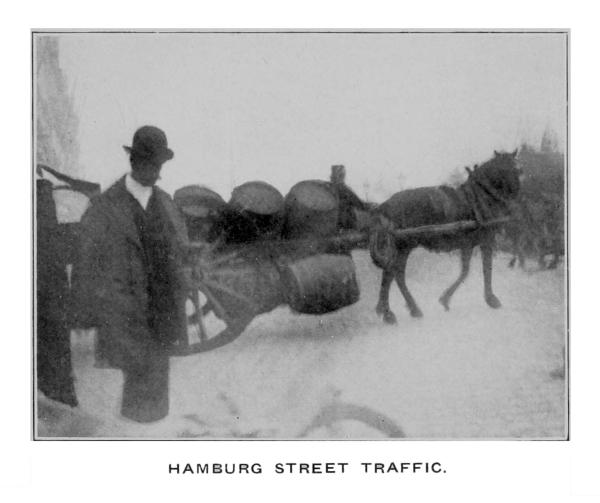
HAMBURG STREET TRAFFIC.
Ours was a through train connecting with the Hamburg-American Line of steamers for New York, and with the through railway express traffic for France and Belgium, via Cologne. The passengers were chiefly of the well-to-do commercial classes, or those substantial travelers who would hasten quickly between Germany and France. None the less, at the few stations where we halted, did the entire company instantly burst forth, hastening to the long counters, where they convulsively swallowed foaming schooners of beer and eagerly devoured sundry dainties, such as rye bread spread with goose grease and over-laid with kraut or wurst, and varnished pretzels salted to the limit. Even the babies were held at the open windows and foaming mugs of beer poured into them by their fond parents. The passion of the German for his bier equals the Russian’s thirst for vodka.
We reached Hamburg a little after half past one, when, taking a fiacre, we immediately drove to Cook’s Tourists’ Agency, where I booked to London, via Amsterdam, The Hague, the Hook of Holland, and Harwich. Then, for an hour, we strolled about the city.
Hamburg possesses fine retail shops and abounds in restaurants, Bier-Keller and Wein-Stuben, establishments devoted to the solace of the inner man.
Stricken with hunger-pangs, and not knowing just where to go, I accosted a tall and prosperous-looking burger, telling him we were Americans in search of food. Lifting his hat, he “begged to be allowed to guide us to the finest Wein Stube” in the town, whither his own steps were at that moment bent. He led the way to a quiet side street, where, descending a flight of stone steps, he introduced us to the portly master of the stube. We entered a succession of large cellars, paneled and ceiled in oak and floored with patterned tiles, where small round-topped wooden tables were set about. We were conducted to a cozy corner, and Rhine wine, cheese, sausage and fresh rye bread were set before us, as well as mustard and sour pickles and pats of sweet unsalted butter, and to this was added a palatable stew.
The room was filled with men—big, well-fed, well-clothed men, apparently merchants, ship-masters and men of affairs. They fell-to upon their flagons of wein, their wurst and kraut, their braten and fisch with serious and deliberate devotion. It was that time of day when, in America, the prospering businessman eats lightly, smokes sparingly and touches liquor not at all, holding his intellect alert and whetted to its keenest edge. We watched with wonder these men of Hamburg, while they poured down quart after quart of wine, the air growing thick [Pg 221]with the fumes of strong tobacco. This capacity of Hans to eat heavily and mightily liquor-up and yet transact affairs, bespeaks a hardness of head and toughness of stomach which ranks him neck and neck alongside his cousin Bull as co-champion of the bibulating, gastronomizing world.
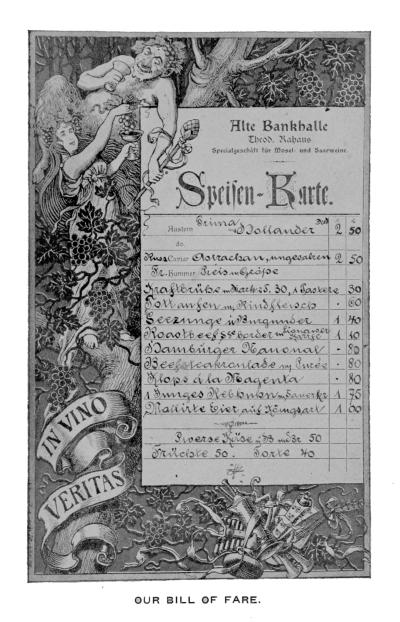
OUR BILL OF FARE.
Although H was the only woman in the stube, being recognized as Americans, we were treated by the company with greatest courtesy and that invariable friendliness with which, in Germany, my countrymen are everywhere received.
Upon departing, Mein Host presented me with an attractive little ash-tray to add to my collection of souvenirs and, with much ceremony, bestowed also upon mine frau an illuminated catalogue of his store of wines.
Later, we entered a comfortable landau and for several hours were driven about the city. Hamburg has always been an important city and one where great volume of business has been transacted. In the Middle Ages it was a member of the Hanseatic League; in after days it was a Free City and, even at this time, its citizens view its absorption within the German Empire not altogether with satisfaction. It bears the marks of great antiquity. Quaint and picturesque are the lofty mediaeval buildings which lean over its canals, where men and women push, with long poles, blunt-ended canal boats and clumsy-looking, but storm-proof, sloops and luggers, among perpetual cries and clamors; where sturdy black tug boats incessantly[Pg 222] shove their way; and where is a jam and jostle of inland water-life not unlike that seen in Holland. Many narrow streets cross these canals on high-built bridges, bearing a continuous and deliberately-moving traffic.
Hamburg also possesses noble boulevards, long and straight and wide, and well-shaded with umbrageous lindens, where, set back behind high walls and strong-barred gates, are miles of sumptuous mansions, in which her merchant princes maintain their households in unostentatious luxury. The wealth of the merchants of Hamburg is said to exceed that of the aristocratic office-holding classes of Berlin.
There are also spacious docks in Hamburg, convenient and modernly equipped, where, year by year, gathers an increasing shipping to fetch and carry the rapidly developing foreign commerce of the German Empire. The wealth and energy of the German Hinterlands pours itself eagerly into Hamburg’s lap and the ancient mediaeval city now finds itself, unlike somnolent Copenhagen, at the very forefront of Europe’s activity. Hamburg is, commercially, more alive and active than Berlin, and as a port receives more shipping than London. Hamburg is almost as wide awake as is New York.
After our drive, we came to the Hotel Europaer, where we dined and rested, and then departed a little before midnight for Amsterdam. Although this is the regular passenger service to Holland, there was no through sleeper, and we were compelled to change at Oestenburg, where we caught the night express from Cologne. Then in a comfortable “schlafwagen,” wrapped in our sea-rugs, we slept soundly the balance of the night.
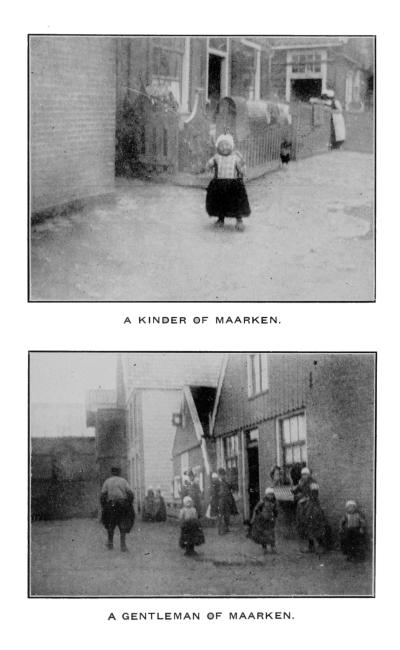
A KINDER OF MAARKEN.
&
A GENTLEMAN OF MAARKEN.
We arrived at Amsterdam near eight o’clock and found our way to the Hotel Victoria, near the station, where I enjoyed such delicious coffee two years ago, and there we breakfasted: coffee,—a great pot of fragrant Java,—abundant milk, sweet and delicious,—rolls and big fresh eggs, and a fish which much resembled the Danish roed spoette and English sole. It was a delightful breakfast, such as one is always sure to have in Holland.
Two years ago, I devoted my time to viewing the city, so now we
resolved to see somewhat of the country beyond the limits of the town.
Thus it happened that we boarded a taut little boat in the midmorning
and all day long steamed through canals, with many locks, passing
above picturesque farmsteads and villages, down upon which we looked
from the higher level of the diked-up waters, and floated at last upon
the Zuyder Zee. We later visited the Island of Maarken with its
fisher-folk in quaint and ancient costume. Once “simple peasants,” but
now, alas! ruined by the staring, money-shedding tourist. We had
scarcely set foot upon the Island, when we were stormed by a horde of
men and women, boys and girls, each demanding “mooney,” and imploring
us to snap the kodak at them for the cash; begging us also to visit
their particular homes, where we would[Pg 223]
[Pg 224] be allowed to look inside the
door, and perhaps inspect the house, for more Dutch cents and even
gulden. So persistent were these “simple fisher-folk” that I almost
fell into dire mishap. H suggested she should take my photograph,
whereupon I arranged myself before the camera, when, just as the kodak
clicked, a vrow and several kinderen rushed up and took position
by my side, thus necessarily appearing in the picture, as you will
see. The lady backed by her brood thereupon demanded, “Mooney, mooney,
mooney.” Naturally, I refused to pay for what had been given without
request. The little company immediately raised a loud lament, at sound
of which an immense and bow-legged fisherman appeared upon the scene,
lifting a great oar and threatening my annihilation, unless money were
put up. However, I was firm and fearless, and finally convinced him
that I had not requested the family to stand before the lens, while I
showed him I had already added half a gulden to his chest for
inspection of the home. Comprehending this at last, his anger then
turned upon his spouse, and he sulkily drove her and the kinderen
within their door, using language that sounded much like the English
damn.
Leaving the Island, we came home across the Zee and passed through the huge new locks of the River Amstel, the “Dam” of which, keeping out the waters of the Zuyder Zee, gives to the city its name,—Amstel-dam.
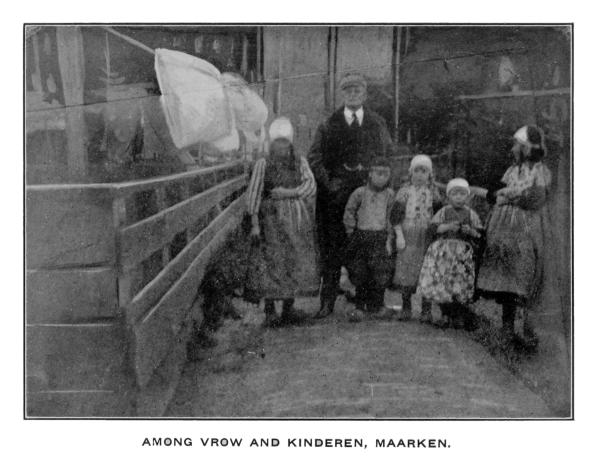
AMONG VROW AND KINDEREN, MAARKEN.
The little boat we sailed upon was chiefly filled with Holland folk, for we were behind the tourist season. They were a quiet, undemonstrative company and, on the deck, sat about in little groups and were served with Schiedam schnapps in small glasses by white-aproned waiters and smoked long, light-colored Sumatra cigars. The proverbial Hollander, fat and chunky with an enormous pipe, is now a mere tradition. The Dutchman of to-day, like his English cousin, is long and lean, and might almost be taken for a New England Yankee.
An hour by rail brought us to “Den Haag.” We passed among broad meadows, marked by wide black ditches from which gigantic pumps incessantly suck out the seeping waters and pour them into the sea. These meadows were once the bottom of the ocean, the soil being composed of the rich alluvial silt which the continental rivers have for centuries discharged. Indeed, Holland may be said to consist of the submerged deltas of the rivers Scheldt and Rhine, which the indefatigable industry of man has rescued from the sea. These lands are of inexhaustible fertility and upon them, everywhere, we saw grazing herds of black-and-white Holstein cows, whence come the butter and cheese for which Holland is famous, and the delicious milk which is so abundantly offered us at every meal. The roadbed ran high above the meadows, down upon which we looked. Here and there we espied a cluster of[Pg 226] neat farm buildings, reminding me much of the Dutch homesteads along the Hudson River valley, and stretching from Albany along the Mohawk, in New York,—with this difference, however, that here, each house and barn and garden lay surrounded with its own diminutive canal, where were little foot-bridges and skiffs fastened near the kitchen door, even a large canal boat being often moored against a barn, the better to float away the loaded hay. The Dutchman finds life intolerable unless he has his own canal right at his threshold.
Farther along, the landscape was marked with innumerable windmills turning their ponderous arms slowly to the breeze which crept in from the sea; we counted I do not know how many, there seemed never to be an end. The people we saw were stout and rosy-cheeked, and moved with less alertness than do the Norwegians, nor did they have about them that air of busy-ness which the modern German begins to show. The impression made by the Hollander is that of sureness and deliberation. The cocky strut of the Frenchman, who moves ever as though on dress-parade, is entirely wanting to the Hollander, whose demure exterior gives no hint of the wealth, the talent, the high importance hid within.
The journey from Amsterdam to The Hague takes scarcely an hour, and before we knew it we drew in to the large station of the Dutch capital. The soldierly-clad porters are not here as numerous as in Germany, nor did those who served us move with so self-conscious and self-important a gait. Men in quiet, dark-blue uniforms quickly put our baggage into an open fiacre and we drove to the hotel of the “Twe Stadten,” a comfortable inn facing a large well-shaded “park.” We were given a commodious chamber looking out upon a pretty garden and dined, at a later hour, in the long, low-ceilinged dining room. The guests were few, only one other party beside ourselves dining thus late. They were two tall and white-haired dames, gowned in black silk with much old lace round about the throat, and with them a petite and pretty Señorita, who spoke in Spanish and insisted upon puffing cigarettes. She led the way from the dining room smoking jauntily, the two chaperones following respectfully behind.
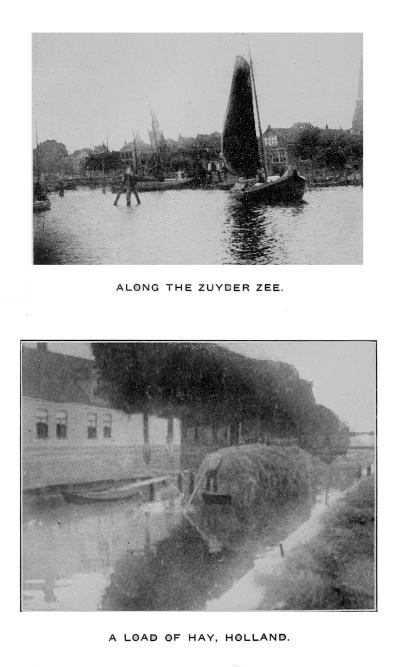
ALONG THE ZUYDER ZEE.
&
A LOAD OF HAY, HOLLAND.
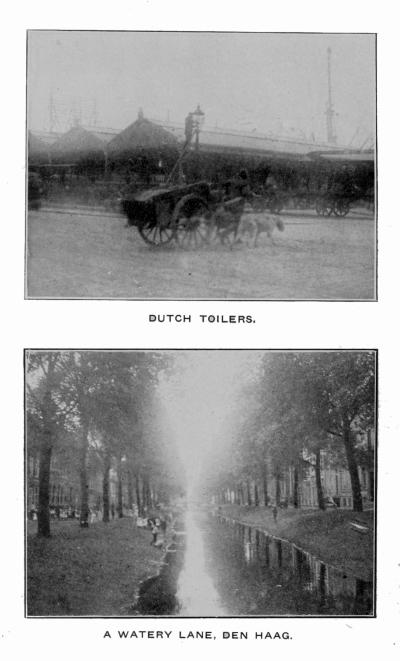
DUTCH TOILERS.
&
A WATERY LANE, DEN HAAG.
In the morning we spent delightful hours in the national picture galleries looking at the priceless collections of the Rembrandts and Rubens, which the Dutch government has here assembled; in the afternoon we strolled about the clean, quiet city, beneath the over-spreading elms; and then we supped at Scheveningen, where we saw the sea again and the last of the season’s fashionable folk.
A moment before leaving our hotel to take the train, which would carry
us to The Hook, I had my last adventure among the canny Dutch. Upon
the table in our chamber lay an attractive little ash-receiver, which
any smoker must needs long to own. Quite naturally, it became
entangled with our sundry purchases and scattered belongings and with
them[Pg 227]
[Pg 228] was inadvertently put away. Just as we were quitting the
apartment, the head waiter of the inn, in whose charge we seemed to
be, burst in upon us with wild anxiety in his eye and explained in
broken English, that he instantly observed, upon scrutinizing the
chamber, that a most valuable piece of Delft ware had mysteriously
disappeared. Perhaps we had broken it? At any rate, it was gone and he
would be held responsible for its loss. Two gulden would barely
replace it! “What should he do?” Naturally, I explained that my wife
by mistake had probably packed it up, and begged him to advise the
office that, upon settling my bill, it would give me pleasure to
deposit two gulden against the loss. At a later time, when
exhibiting this relic to wiser eyes, I was forced to recognize that
the little ash-receiver was merely common ware, of value perhaps ten
Dutch cents! So much for the knowing Dutchman who traps the traveler
in search of souvenirs!
Two hours after leaving The Hague we were upon the ship which would carry us to England. By early morning we were again at Harwich, and we arrived in London by mid-afternoon. Our only fellow passenger upon the train was a tall, dark, silent man, who carried with him an enormous overcoat of fur. We thought him a Russian, and wondered if he also had come directly from the Empire of the Czar.
We are now returned to London, whence we departed five weeks ago. We have crossed the North Sea, and journeyed through Denmark, and Norway, and Sweden, and visited their capitals. We have voyaged [Pg 229] across the Baltic Sea and the Gulf of Finland; we have caught a passing glimpse of Helsingfors, and looked upon St. Petersburg and Moscow, and traveled many hundred versts through the Empire of the Czar. We have sped through Germany and felt at home in the noble cities of Berlin and Hamburg. We have tarried in Amsterdam and Den Haag, where we felt the strangely familiar atmosphere of Dutch New York. We have looked upon many peoples of the Teutonic races and, when among them, have felt that subtle throb of kinship, which common blood and common origin awake; we have also plunged a moment within the mediaeval and yet semi-barbarous dominions of the Slav and found ourselves upon the threshold of mysterious Asia.
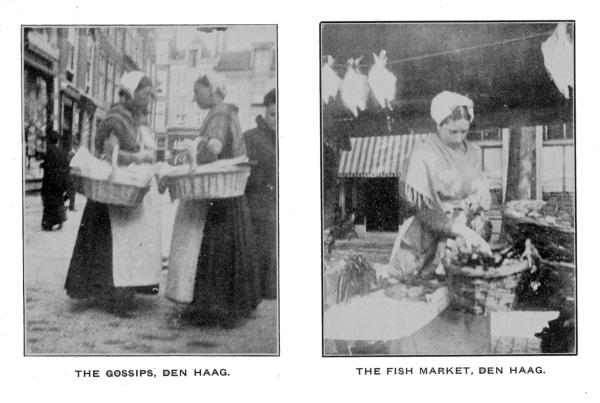
THE GOSSIPS, DEN HAAG.
&
THE FISH MARKET, DEN HAAG.
We have everywhere been thankful in our hearts that we were born and bred beneath the Stars and Stripes in the great Republic of the West, where hope and opportunity are not merely our own, but are also the loadstars which beckon thither the youth and vigor of these older peoples of the World.
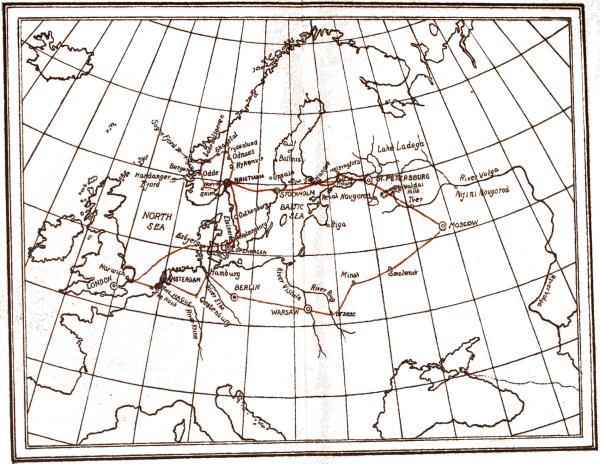
MAP OF NORTH EUROPE.
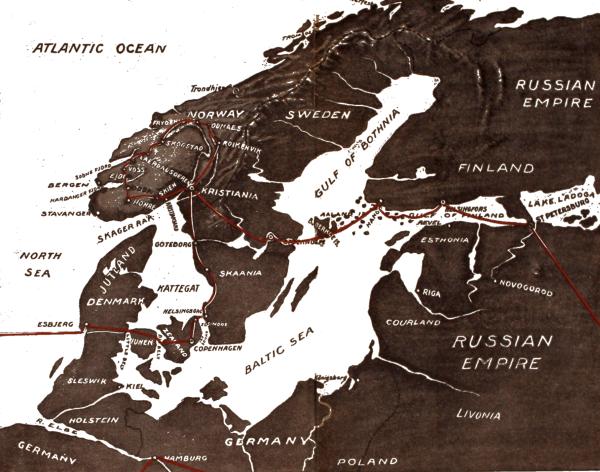
MAP OF SCANDINAVIA AND BALTIC RUSSIA, IN PROFILE.